
Yacht Crew Wanted
Amateur and professional yacht crewing positions available worldwide, from daysailing to transocean for all experience levels.
Search sailing opportunities
For yacht crew
It’s free for everyone to browse though all of our current sailing opportunities. Become a member to contact yacht owners and join their crew.
For yacht owners
Registration and posting is free if you are looking for a skipper or crew. Find amateur and professional crew for short or long term voyages.
Featured sailing opportunities
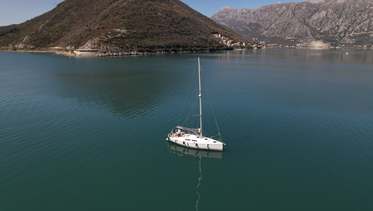
Americas Cup (AC37) Barcelona 2024
Boat type: Hanse 385
Location: Tivat Montenegro

Solent Yacht Racing - Inshore and Offshore
Boat type: Sunfast
Location: Hamble-Le-Rice, Southampton
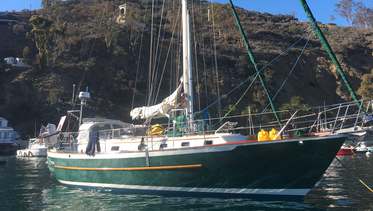
PS40 MX to Papua New Guinea by early '24
Boat type: Cutter Rig Bluewater Passage Maker
Location: Puerto Vallarta, Mexico
Coastal yacht cruising
Professional sailing jobs, ocean sailing voyages, yacht delivery crew, worldwide opportunities, varied vessel types, all experience levels, mile building voyages, short notice sailing, environmental & wildlife vessels, we are recommended by.

Crewseekers notices
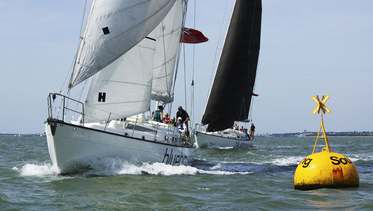
What makes an RYA Yachtmaster?
James Stevens, former Chief Examiner of the RYA tell us.
Skipper for Private Catamaran Charters in Malta
More information

Day Skipper & Yachtmaster theory courses - 20% off
Online RYA theory courses with a great discount courtesy of Crewseekers.
we love sailing as much as you do
Crewseekers is run by experienced, professional sailors offering a friendly and helpful service to yacht crew and owners. We are the original yacht crew introduction agency – established for over 25 years, offering amateur and professional sailing opportunities throughout the world.
- Yachting World
- Digital Edition

How to be a good skipper: ooze calm and confidence but don’t shout!
- March 29, 2016
No two skippers are the same and everyone has different leadership styles, but Chris Tibbs believes certain traits will make you into a skipper that crew will want to sail with

Photo: Mahina Expeditions
We become skippers by a number of different routes; many dinghy sailors will eventually become yacht owners after years of crewing on different yachts. Sea schools are well attended and boats are often keen to take on crew from schools, allowing students to gain experience and miles to help with qualification.
There are also many people who come to sailing later in life; after buying a boat, these people tend to learn from the experience of sailing their own yacht.
I think it is also fair to say that, along with the many ways of getting into sailing and becoming a skipper, good skippers will have different leadership styles – no two are the same. Over the years, having sailed with many different skippers, I have noticed a number of common traits in a good skipper.
By melding together the points I like in a skipper this has hopefully made me a better skipper, both for when I was working commercially running yachts, and now aboard my own.

Photos: Paul Wyeth
I find that a skipper who is calm and confident goes a long way to maintaining a nice feel to a boat. Easily said, but it is a fine balance between confidence and arrogance; and being too laidback can give an impression of laziness, extending to preparations and maintenance. Staying calm and in control during a crisis rubs off on the whole crew and the boat becomes much quieter and under control.
Don’t shout
There is plenty of time for a please and thank you, along with an explanation of what needs doing and how it should be done. It also gives time to work on a solution to any problems and avoids panicked decisions. This is communication in a way that is effective and also pleasant.
People dislike being shouted at (I certainly do); it inhibits crew doing their job as they are afraid of getting it wrong, so they wait until told to do something. This can be very frustrating for a skipper, particularly when racing and the pressure is on, which in turn leads to more shouting.
Article continues below…

ARC weather man Chris Tibbs prepares his boat for ocean cruising
When we bought our Wauquiez Centurion 40s, Taistealai, for ocean cruising, starting with the ARC this year, we had a…
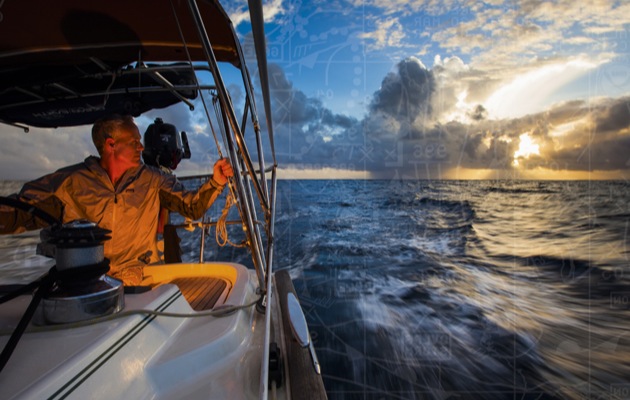
Offshore weather planning: the options for receiving weather data at sea
When I skippered a yacht in the first Atlantic Rally for Cruisers (ARC) 30 years ago the weather planning information…
I equate the amount of noise on board to be in inverse proportion to the sum of knowledge. I do find that being on a boat with a skipper who stands behind the wheel shouting at the crew is not much fun and, if asked back, will generally decline the invitation.
There is something great about helming your own boat in a race, but if you are also trying to run all aspects of the boat from behind the helm you can get stressed. Then your helming declines as your concentration jumps from one task to another.
It is much better to have a crew boss or mate who controls the running of the boat, managing manoeuvring instructions and allowing the skipper to concentrate on helming. The alternative is for the skipper to manage the running of the boat and have a different helmsman. Large racing boats will often have separate helmsman, navigator and tactician, with the skipper in overall control.

This is another important lesson: delegation and training. There are many decisions taken on board that really do not need to involve the skipper once a general plan has been made.
For example, does the skipper really need to micromanage all the food that is bought for a transatlantic passage ? By delegating a large proportion of the running of the yacht to others it does free up the skipper to focus attention on the more important issues.
5 top tips for a good skipper
- Communicate clearly.
- Stay calm and confident.
- Promote fairness and listen to your crew (treat them with respect).
- Be cheerfully available at all times, whenever called.
- Act decisively.
I skippered a yacht in the BT Global Challenge where everyone on board had an area of responsibility, although things would be discussed. We split things up in a number of ways: for example, one crewmember, who worked in the oil industry, was the safety officer.
It was their responsibility to make sure all our safety equipment was in working order and serviced. They would also give a safety briefing to new crewmembers as to where equipment was stowed and how it should be used.
By giving responsibility to a crewmember, it relieves some of the skipper’s duties, but more importantly it helps crew quickly become part of the team. During the last ARC one of our crew arrived only a couple of days before the start – immediately he set to work on a jobs list and his comment afterwards was that it allowed him to familiarise himself with the boat and made him feel part of the crew.
Part of the skipper’s job is to explain and teach; it is pointless to get angry at a crewmember for doing something wrong if they have never been shown how to do it right.
Although it is often easier to do something yourself than explain how it should be done, it is important for other members of the crew to be able to tackle particular jobs.
Then if something needs doing in a stressful situation they will not be doing it for the first time under pressure, when something is very likely to go wrong.
Some crew may not be very experienced, but all should be willing to learn – with a bit of help and encouragement they will soon become efficient crewmembers, whether for a day’s sail, or an ocean passage . I find it easier to hand over the helm when showing what I would like done rather than trying to do it from a fixed place with divided concentration.
You only have to watch manoeuvres in a marina for a short time to spot a boat getting into difficulties and a significant amount of shouting and swearing starts. The skipper has lost control of the boat and will shortly lose control of the crew, then will spend a long time contemplating the wonders of single-handed sailing.
It is important to get away from the blame culture. If something is done wrong a quiet word will be more effective than balling somebody out; most people are upset when they do something wrong and I see no point in making it worst by public humiliation.

As a skipper it is important always to be available and never to be upset or grumpy at being called, even if it turns out not to be necessary. I recall one dark night in the English Channel when the crew on watch were discussing a ship.
One was quite certain that we were passing behind the ship, the other equally certain we were passing in front. On hearing this I got up to find that there was a ship close by and where one crew was seeing the running lights, the second was seeing lights at the stern and in front of us was a wall of steel! A (very) quick gybe and all was well.
I will never ask anyone to do something that I would not be prepared to do myself; whether changing a sail on the foredeck at night in a gale, or climbing the mast . While younger, fitter crewmembers might be better suited to the task, is it safe or right for them to do it? I look at the task and ask myself would I do it? If the answer is yes I do it myself or, if the volunteer will do it better, then I may be persuaded.
If however the answer is no, then we must find another solution. As I get older I may have to change my thinking as it gets more difficult to do the tougher physical activities.

Safety first – Angus Fuller
- Safety, safety, safety – make this a priority, not just on deck, but below: in the galley, moving in the interior, even in the heads.
- Wear lifejackets at night. Always.
- Respect the environment, particularly with a view to pollution.
- Remember you can’t do everything so delegate/rely on crew wherever possible.
- Carry out drills before departure, ensure all crew understand their roles during any scenario. At halfway, have a chat, table top drill or even a full drill in order to keep the crew refreshed.
- Pay attention to detail. This applies to pretty much everything, from maintenance of systems to presentation of the yacht to monitoring the weather .
- Communicate the plan to the crew: a daily briefing on weather (lunch time is ideal), route, any change in this owing to weather and why. At sunset, issue night orders for changes in wind speed and direction.
- Ensure clear parameters are set with the crew so they know when to wake the skipper in the event of changes in weather, shipping, landfall, etc.
- Never be afraid to brief the crew before a manoeuvre – and a debrief after a manoeuvre can be a very useful process for both the skipper and crew.
- Reef when you first think about it – invariably performance doesn’t suffer that much (and is often improved) if it’s a marginal decision.
- Aim to have the yacht arrive in the same condition, or preferably better, than when you departed. By definition this means you will be looking after the yacht properly during the passage.
- Know the cruising area or stretch of water being transited. If you don’t, then heavily research it.
- Exercise seamanship to the very best of your ability at all times and instil this in your watch leaders from the outset.
- Assemble a crew who aren’t just good sailors, but compatible personalities too.
Fairness is all
You also need to be fair, whether this means splitting the watch times so all the crew are happy, or balancing meals and meal preparation. Fairness is important and it is easy to fall into routines where one person feels unfairly treated.
At the start of a long ocean passage on my boat one crewmember, who did not suffer from seasickness , ended up making drinks and snacks for everyone; this became the norm and after a few days they became unhappy because they were doing more than their fair share of galley duties.
Small things like that can quickly become big on a boat at sea. Another time I had a habit of always running the generator and watermaker at the same time of day; this became annoying for the off-watch as it made sleep more difficult, something I was not aware of at first as it did not affect me. Having a time where everyone comes together, maybe meal times, can be a good time to address small issues before they get bigger.

Part of a skipper’s responsibility to the crew is safety and this is not only their direct personal safety, but also the maintenance of the boat and equipment.
I find it useful to have plenty of discussions about what could go wrong and the equipment we have on board and how it can be used.
Man overboard practices and fire drills should be done as a matter of course, but it not always that easy, particularly on short voyages. However, a safety briefing should be done for all new crewmembers even if they are only on board for a daysail.
What is perhaps not so comfortable for skippers is having to resolve interpersonal problems. This may just involve switching the watch system around, or may mean you have to ask someone to leave: not a nice job for anyone to have to do, but a happy boat tends to be a safer boat – and faster if racing.
One problem that can become an issue on races and rallies is how hard the boat will be pushed. What might be pushing hard for a racing person will be different for a cruiser and it is easy for people to become apprehensive (or plain scared) when out of their comfort zone.
Then there is the issue of money on cost sharing or paying your way boats. It is important before committing to sail together to have a firm agreement on what is expected on both sides.
It should also be clear who is paying travel costs as, although a boat may be legally responsible for repatriating crew, most non-commercial yachts expect crewmembers to be responsible for their own travel.
Who’s the leader?
There can be times when a crewmember may be as experienced (or maybe more so) than the skipper. This can cause tension and insecurity in the skipper’s position.
For a day or so it should not be a problem, but on a longer passage a feeling of being undermined can set in. As a skipper it is useful to be open to ideas, they may be better than yours as everyone’s experiences are different, but at the end of the day the yacht is your responsibility.
Trying to get a balance between listening to, but being able to reject ideas may not be easy and can be a difficulty when taking on crew that you may not have sailed with in the past.
I have seen this a number of times in the ARC where a boat has taken on an experienced crewmember, but it has blurred the lines as to who is the skipper and caused tension.
I do find choosing a crew difficult; it does partly depend on what I am intending to do. For a long passage an enthusiastic, positive person will make up for any shortcomings in experience.
We all have to live together so getting on is important, along with a willingness to share all tasks. As we are sharing our boat, which is our pride and joy, respecting and looking after it should be a priority.
Damage will occur and owners/skippers need to be prepared for this, but a carelessly dropped saucepan on the newly varnished cabin sole is avoidable and immensely irritating.
My ultimate test is: would I be happy working on the foredeck in bad conditions with this person? A definite no-no for me is laziness, particularly crew not willing to muck in with the bad bits as well as the good.

Speak to your crew – Tom Cunliffe
- Communication is key. No ‘mushroom management‘.
- Listen/watch, crew and boat.
- Remain cheerful, or at least positive, even when woken during your watch below.
- Above all, make sure all hands are running on the same ‘motivation fuel tank‘. If they all want the same thing, you are three-quarters of the way to a happy ship.
- By all means communicate legitimate concerns, but never irrational anxieties.
- Sit down before you start, agree ship’s articles and all sign them. Everyone must know their duties. If money is involved, details of this must also be inscribed, as well as a probable route with contingencies. Then, when things turn to the bad and aggro starts, you get out the articles and read them together. End of problem (given to me by one crew of Sandefjord , which sailed in the 1950s from South Africa).
Judging competence
Choosing a skipper also has its pitfalls. Experience and competence is difficult to judge on first meeting and going for a sail together is important. Personally I would avoid a shouter at all costs.
Competence levels are more difficult to measure, but a well-run, tidy boat is a good indicator while one with a long jobs list could indicate that things have slipped.
A quick look in the bilges and at the engine can give a clue as to maintenance and a check on lifejackets will show thoughts on safety. I recently did a safety check on a yacht for an event to find that the owners had brand new top of the range lifejackets for themselves while the crew ones were old, without lights or sprayhoods. I am not sure I would have enjoyed sailing on that boat!
Skippering a yacht well is not an easy task, there are so many aspects to the job. It becomes easier with experience and there is no substitute for miles sailed. Good sailors are not necessarily great skippers, but good skippers must also be good sailors.
I have a great deal of respect for the late Sir Peter Blake and, although I never had the privilege to sail with him, I sailed against him on two Whitbread Round the World races . He always found time to have a friendly word and generated great crew loyalty on board his boats.

Be the best leader you can – Jim Thom
- It’s becoming progressively easier to access sophisticated weather information. A good skipper will prepare the yacht for the actual weather, not the forecast he/she’d like.
- Monitor the yacht’s position and the conditions, high and low-tech, from radar/chart plotter to barometer. Even though electronics are increasingly failsafe, a good skipper keeps a record on paper, in the log and on a chart – even the most advanced yachts can be struck by lightning , or suffer power failure . A good skipper will also listen to their senses, and to their sixth sense. They’ll ask themselves where that low swell is coming from or why the seas have become steeper. Shallow reefs may tint the underside of clouds green or blue, and the sound of breakers will hopefully never come as a surprise. Rain has a distinctive smell at sea, as does land and your nose will tell you when ice is near.
- A good skipper will look for the ‘horseshoe nail’ – lost from the messenger’s horse, it triggered the chain of events that lost a kingdom. Regular checks of the yacht, including sails and rig, deck fittings, bilges, steering, engine and machinery, will help the skipper and crew stay ahead of the law of entropy, and out of the incident pit.
- Create a flexible structure without being overly prescriptive. Agree standard practice with the crew: how lines should be made off on a cleat; how to use and make fast on a winch, how to shake out a reef, how to make engine checks, etc. Establishing basic procedures avoids surprises and allows crew to develop skills and think further. A good skipper will prevent boredom and apathy by agreeing daily routine maintenance tasks and helping to develop projects that improve the yacht and teach useful skills on board.
- A good skipper’s best attributes are not related to technical expertise, but to self management, leadership and communication skills. If you develop a set of team and personal goals then a common understanding will prevent many hot spots from forming.
- A good skipper will try to manage their own emotions, knowing the effect they can have on morale. They’ll keep an eye on each member of crew and on the mood of the team, finding reasons to celebrate together – crossing the line, halfway point, a birthday, a good day’s run, or just a great day at sea.
About the authors
Chris Tibbs is a meteorology and weather router, as well as a professional sailor and navigator, forecasting for Olympic teams and the ARC rally.
Angus Fuller is a professional skipper, MCA Chief Mate 3000GT (yachts), who has made 29 transatlantic crossings, 21 as skipper, and one transpacific crossing as skipper, plus one circumnavigation upwind and sailed over 300,000 miles.
Jim Thom has been skipper of a Robert Clarke sail training yacht, a Baltic trader, a Clipper Round the World Race yacht and for four years was captain of the Fife design Kentra . From 2003-2012 he was captain of the 125ft Fife 19 Metre Mariquita with his wife, Lucy, as mate.
Tom Cunliffe is a Yachtmaster Instructor Examiner, author of numerous books on seamanship and is a contributor to Yachting World , responsible for our ‘Great Seamanship’ features.
How to become a skipper
So you want to be a yacht skipper.
Many yachting graduates choose to start their careers on smaller yachts where they have the opportunity to refine their sailing skills and develop a great reputation. Being a Flotilla Skipper, Charter Skipper or Delivery Skipper is a great way to start working afloat in an industry you love.
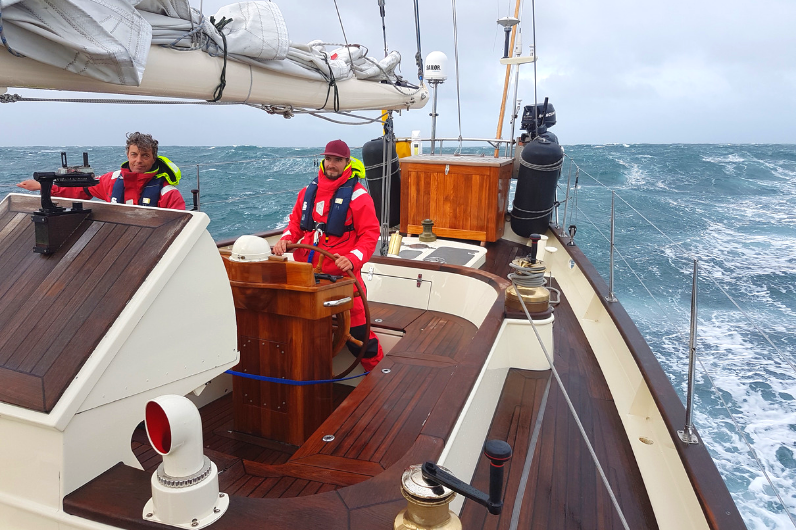
What’s a skipper?
A skipper is a person who has command of a boat or watercraft and is more or less equivalent to a captain in charge of a ship. The skipper may or may not be the owner of the boat.
There are a number of types of different roles including flotilla, charter and delivery skippers.
Flotilla Skipper
What does a flotilla skipper do.
A flotilla skipper is responsible for the running, sailing, maintenance and guest care of a yacht forming part of a holiday flotilla or sometimes the entire group of up to 20 yachts, which form the flotilla.
Flotilla holiday companies often operate in the Mediterranean, you can earn anything between €100 – €250 per week (depending on operator) but can also earn some reasonable tips.
Working as a flotilla skipper is a great way to build on your miles.
Personality traits
You will need to be an outgoing and friendly personality who can accommodate guests at all times. You will need to be organised and efficient to cover all admin and paperwork as well as deliver safety and technical briefings, conduct general maintenance and assist guests with sailing.
Flotilla Skipper Salary
Flotilla holidays companies often operate in the Mediterranean, you can earn anything between €100 – €250 per week (depending on operator) but can also earn reasonable tips.
Flotilla Skipper Jobs
The types of jobs vary on different vessels. Some of your tasks will include but not be limited to:
- De-fouling propellers and replacing anodes before launching
- Checking and replacing all deck fittings where necessary
- Assisting engineers with out-of–water work
- Checking skin fittings
- Replacing running rigging
- Hoisting anchors
- Servicing winches
- Hoisting sails
- Fitting biminis
- Fitting guardrails
- Checking dinghies
- Splicing and whipping ropes
Charter Skipper
What does a charter skipper do.
A Charter Skipper manages and captains a yacht that has been hired out to paying guests. This role typically involves taking command of 35 – 60ft yachts (catamarans are particularly popular) operating in the Mediterranean or Caribbean.
You will have a busy schedule with a high turnover of guests during the season that will want to pack a lot into their 1 or 2-week holiday.
You will need to be an outgoing and friendly personality who is committed to providing the highest level of customer service.
A hard-working attitude is required, as you will be responsible for all aspects of the charter operation from maintenance and passage planning to the general management of the yacht.
Charter Skipper Salary
Charter Skipper salaries range based on experience, position, size of yacht, and type (charter vs private). Here is a simplified break down of monthly skipper crew salaries in dollars:
Charter Skipper Jobs
There are several responsibilities for a charter skipper. These include but not limited to:
- Planning the entire passage to the proposed destination, possibly over a number of days
- Navigating the vessel
- Knowing how to operate and maintain all the equipment on board
- Taking care of the safety of the vessel and the crew
- Management of the vessel in all respects
- It is the responsibility of the skipper to ensure that whatever trip the vessel is making whether for fishing or for holidays, he follows the regulations and maritime laws
Delivery Skipper
What does a delivery skipper do.
A delivery skipper is responsible for the safe journey of a yacht to its new owner or meeting the owner of the boat at a particular destination.
You are your own boss when working as a Delivery Skipper, you don’t have the responsibility of guests but it is up to you to make sure that the boat gets there safely and on time.
Delivery skippers usually work on a freelance basis or for an agency, either way, both will be looking for skilled sailors so your level of qualification and experience on the water will determine how much work you will pick up.
You will need to be a determined and reliable person with a good work ethic. Taking on this type of role means that you will have the benefit of a flexible lifestyle, you could be working for long periods of time followed by long periods of time at home, this role could also take you to any part of the world.
Delivery Skipper Salary
Your travel and food expenses will be paid for while on a delivery, freelance delivery skippers often negotiate their own wage but on average you could expect to be paid between £100 – £140 per day. As a newly qualified Yachtmaster, you will need to build on your miles and experience before taking on the role of skipper.
You can do this by joining a delivery as a crew member (often unpaid).
Delivery Skipper Jobs
- The safe handling and navigation of a vessel
- Ensuring that all activities are carried out in accordance with Safety and Operating Procedures
- Leading and supervising the regular crew and any relief crew and volunteers
- Looking after the welfare of clients, crew, volunteers, and trainees, including morale and discipline
- Dealing with unexpected issues which might arise, such the need to implement emergency repairs
- Maintaining paperwork
- Being professional, and acting with tact and diplomacy at all times (both on and off the vessel)
Register your interest
- First name *
- Last name *
- How did you hear about UKSA? * –None– Campaign Dinghy Show Educational Visits UK Event GroupAccommodation.com Guardian Media IOW College IOW County Press London Boat Show Online PlanMySchoolTrip.co.uk Press Radio Referral School Travel Organiser Social Media Southampton Boat Show Top School Trips UKSchoolTrips.co.uk Visit IOW Yachts & Yachting
- General notes
- Opt-in to receive course information and relevant offers
- Accept Privacy Policy and Terms and Conditions .
- Name This field is for validation purposes and should be left unchanged.
Courses you may also be interested in
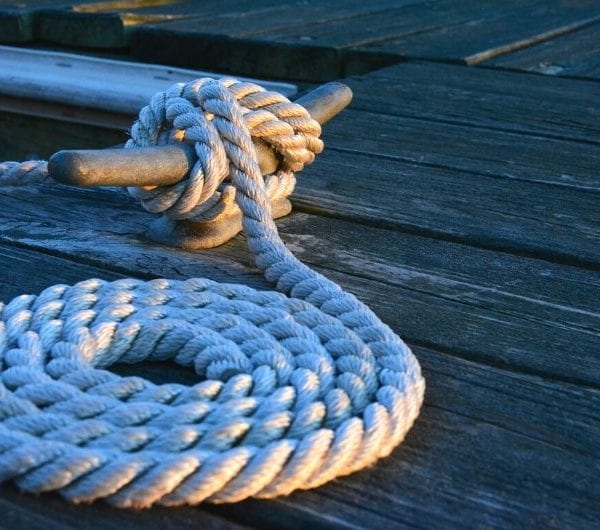
If you have any questions or need to get in touch:
Speak to UKSA on +44 (0)1983 294941 or email us
Yacht Charter with Skipper | 15 Things You Need to Know
Yacht charter with skipper | the 15 essentials, our guide to hiring a skipper for a yacht charter.
Embarking on booking a yacht charter adventure brings a world of excitement and questions, especially when it involves a skipper. Navigating the role and significance of a skipper is key to a successful journey. From understanding the definition of a skipper to grasping their responsibilities and qualifications, each element plays a crucial role in shaping your experience.
Cost and logistics are central to planning your charter. Delving into the details like skipper fees , route decisions , and crew hiring provides clarity and helps set realistic expectations. Additionally, practical concerns such as feeding the skipper and tipping etiquette are aspects often overlooked yet vital for a smooth sailing experience.
Finally, the more nuanced aspects of yacht chartering, like discussing plans with your skipper in advance and navigating the complexities of charter agreements , reveal the intricate dynamics of this unique travel experience. Dive into each of these facets to unravel the full picture of what it means to charter a yacht with a skipper.
Charter Payment Protection
Insolvency protection, safe payment, muti-currency. lossless forex, low price guarantee, exclusive deals no hidden fees, introduction to skippered yacht charters.
Understanding Skippered Charters. These charters are increasingly popular for their ease and expert guidance. Skippers are not only highly qualified mariners, but also adept at being sociable or discreet according to guest preferences.
You’ll also learn about some facts you might not have known, like it’s your responsibility to feed your skipper and your Operator or agent only act as “recruiters”, whilst they will bear natural responsibility for finding suitable and qualified skippers, it’s a typically a direct relationship.
Here at SailChecker, we work closely with our clients to help them make arrangements with their skipper that works for them.
Pre-Charter Access and Skipper Selection
Choosing Your Skipper. You get surprisingly little choice over or access to your skipper. Typically detailed planning discussions won’t be possibile until you arrive at the base.
Whilst this sounds restrictive, it’s actually the most effective and efficient. It will mean that your skipper is not dealing with future client’s and be able to focus on you during your charter. It means that you won’t make planning decisions that are undone by local weather conditions.
The popularity and freelance nature of skippers has lead to high demand and high turnover. Operators will not always be in a position to allocate until the week leading up to your charter.
Here at SailChecker we work hard to understand your specific requirements, not all operators work in the same way, help balance all your requirements to ensure the best possible experience.
Cost and Duration of Skippered Charters
How much does it Cost to Hire a Skipper? We’ll explore the typical costs and duration of skippered yacht charters, this segment provides crucial budgeting insights for those planning a charter.
SailChecker have independent options and their own skippers to give charterers a wider choice of crew.
Route Planning and Flexibility
Adjusting Sailing Routes: Skippers play a crucial role in route planning. However, pre-arrival planning is often subject to change due to local conditions. This flexibility ensures a comfortable and enjoyable journey, catering to real-time factors like weather and local events.
Role and Responsibilities of the Skipper
Expectations from Your Skipper. We’ll provide a detailed overview of the skipper’s responsibilities, emphasising their commitment to safety, navigation, and guest comfort, while clarifying limits in tasks like cooking and domestic duties.
Skippers are highly skilled professionals, it’s really important to understand what a Skipper will and won’t do for you.
Here at SailChecker, we use our independence to advise on different options and levels of service.
Understanding the Skipper Hiring Process
Selecting the Right Skipper: Insights into the hiring process of skippers, highlighting how charter operators ensure they select skippers who are not only skilled but also have the right interpersonal qualities.
Here at SailChecker, we know which Operators are recruiting and retaining the best Skippers in their freelance pool.
Interpersonal Skills of the Skipper
Skippers’ Social Skills: Concluding with the importance of a skipper’s ability to be genial, teach, entertain, and also maintain discretion, ensuring guests enjoy their time aboard while feeling comfortable with their presence.
Here at SailChecker, we know how important the right personality is, whether it’s someone who’s great with kids, someone who likes to teach the basics or someone who knows the party spots, we’ll help you refine your choice and create a better and more enjoyable sailing experience.
- 1. Definition of a Skipper?
- 2. How much does it cost to hire a Skipper?
3. Who decides the Route?
- 4. Can We Have the Skipper’s CV and Sailing Resume?
5. Can I Discuss our Plans with the Skipper in Advance?
6. is the route always certain on a skippered charter.
- 7. Who actually hires the Skipper?
- 8. What will the Skipper NOT DO on a yacht charter?
9. What will your Skipper ACTUALLY do on a yacht charter?
- 10. Who feeds a charter skipper?
- 11. How much Does a Skipper Earn on a Skippered Yacht charter?
- 12. How much do you tip your Skipper on a yacht charter?
- 13. Are Skipper’s Qualified?
- 14. How do you become a Skipper?
15. When Booking a Yacht Charter with a Skipper why can’t we have Open Access to them in Advance?
1. definition of a skipper, how to define the skipper or captain of a boat during a charter.
Let’s start with a formal definition:
Skipper. noun. /ˈskɪpə(r)/ /ˈskɪpər/ the captain of a small ship or fishing boat.
You will find the word used worldwide but it is chiefly in use in Europe, especially the UK. In the US and in the Far East, you will see the word interchanged with “captain”, reserved for larger ships in British English. Whichever you choose to use, you are highly unlikely to be misunderstood or even corrected.
In essence, it’s the most senior person on board and in command of the vessel and has some pretty serious obligations under the local laws and the International Regulations for the Prevention of Collision at Sea ( COLREGS ). He or she can, if in international waters, even officiate legally recognised weddings under some circumstances!
In the end, you have to lawfully accept their decisions whilst underway which makes understanding exactly what their responsibilities are when chartering with a skipper (or captain!).
2. How Much Does it Cost to Charter with a Skipper?
Freelance skipper rates for yacht charter.
Chartering with a Skipper. Now that you know you need or want to go chartering with a skipper, how much will it cost to hire one?
Price. In 2024 the most typical price for a chartering with a skipper was between €240 or $240 per day. Whilst advertising rates are per day, it can be difficult to charter for anything short of a week as most skippers are seeking full employment at peak times. The exception is Assisted Sailing .
Assisted Sailing. This is where a skipper joins you for several days at the commencement of your charter. It’s particularly useful if you are a little out of practice, a new sailor, or sailing a bigger boat than you are used to.
How Much Does It Cost to Charter a Yacht. We do recommend you check out our blog How Much Does It Cost to Charter a Yacht if you would like to piece the whole picture together.
Route Planning for a Yacht Charter
Many charterers are naturally anxious about knowing where they are going and who decides. For some, booking restaurants and other popular attractions along the way is essential.
The route selection is something that cannot ever be guaranteed. There is always a risk the weather plays a small or large part in your decision. Whilst the Skipper has the final say on safety, the primary guest will have a great deal of input into the route. Where there are restaurants that need booking, more than 1 week in advance, your operator will typically reach out to you, in the main, restaurants can be secured during your charter.
SailChecker has a great deal of experience in each location and, as importantly, how each base operates and treats guests. We aim to find what’s a priority for you and match you to the right operator and boat accordingly.
4. Can We Have the Skipper's CV and Sailing Resume
How much you get to learn about your skipper in advance and can vary and can change at short notice.
On high-end charters, known as Crewed Charters (opens in a new tab), the crew on the boat full-time have resumes and CVs that will be sent to you before booking. On skippered charters, where the boat and skipper are hired separately, skippers more typically come from a pool and for operational reasons, might only be allocated at short notice. This might not always be the case, smaller companies may allocate well in advance and changes are rare.
Planning With Your Crew in Advance is Often Restricted.
Being denied access to your Crew in advance is a common policy from Operators. This ensures that the crew focus entirely on you when you are on charter, and not dealing with communications from charters in the weeks ahead.
In some cases, your Operator may not know who your skipper is, or leave themselves the ability to move people around at the last minute. This is ‘priced-in’ when compared to Crewed Charters.
SailChecker will always honestly manage expectations about crew access. We are also a team of ex-crew members who can often answer many of the questions without needing to revert to the crew.
Your Planned Route Can Change at Very Short Notice
On many yacht charter with a skipper, the route will go exactly as planned and bear a remarkable similarity to the published itinerary by the operator and agent. In other cases, it may differ significantly once the skipper can talk to you and explain the different options available to you.
On top of that, factors like the weather, sail weeks (groups of yacht sailing together to party) that might turn idyllic spots into loud music all evening, might mean a tweak to the route without missing out on the a highlight.
The weather is a strong contender to play it’s part too; heading in the direction wind has been coming from for a few days can make the sea uncomfortable to give one example (there are many), but settled later in the week – your skipper will be an expert on keeping you as comfortable as possible. In other words, they won’t know in detail where you will go, only in outline which is always provided in sailing itineraries for the area.
7. Who Actually Hires the Skipper?
Freelance skippers are typically are hired directly by the primary guest.
Introduction . This might seem an odd thing to need to know when you’re chartering with a Skipper . But, it can be useful to know as it might not be quite what you were expecting.
Crewed Charter . If you are chartering a boat with a permanent crew , they are almost always salaried or won the boat. If they are employees, they will have contracts with the crewed yacht charter operator. They are very typically a couple who share a cabin which allows cabin space to be maximized for guest use.
Skippered Charter . If you are hiring your skipper separately it’s commonly referred to as a Skippered Charter (New Window), you are, in essence, adding a skipper to a Bareboat Charter (New Window), like you might add a driver to a hire car.
Key Info . Keep in mind that every crew member will need their own cabin to comply with employment law in most countries. That said, there are lots of exceptions, but it pays not to assume.
Employment Status. When chartering with a skipper in this manner, they will typically be self-employed. The operator will have their own reputation to protect and will always try and work with the best they can find, yet they won’t always be directly responsible.
8. What Will Your Skipper NOT DO on a yacht charter?
Freelance skippers are skilled mariners and won't deal with every aspect of you charter..
Knowing exactly what to expect of your skipper when chartering is key to a stress-free charter from the outset avoiding any misunderstandings. It’s also the most challenging question to answer, as no two operate in exactly the same way, and it can even vary from skipper to skipper even when working for the same operator! All in all, this makes it even more important to know where the lines are and to get your agent’s support. Here at SailChecker, we take this part of organising your charter seriously.
Here is a list of SEVEN things you will typically find your Skipper is unlikely to do as part of your agreement:
- Pay your deposit. Most boats have a non-refundable element to the deposit. As a charterer, it may come as a surprise to know that in many cases, you are still responsible to the operator and the skipper is responsible to you. If some damage is caused through some extraordinary event, say a surge in water, that the skipper could not have ordinarily made provision for, then the liability falls to the charterer, not the skipper. If the skipper damages the boat, say during docking, he will almost certainly cover that cost and many are insured, yet do not take that for granted.
- Cook . Ok. So there are many great skipper cooks out there, yet it cannot be an expectation. It’s not even possible to demand one, it’s something you might be able to influence through your agent, so if it’s important to you, make it known at the start.
- Serve Drinks or Meals. On the contrary, it’s actually your duty to ensure he is “fed and watered”. This need not be in the style you are feeding yourselves, although it is quite rare to discriminate, yet so long as you discharge your responsibility, the skipper will be more than happy.
- Sail If Unsafe. No matter your crews’ experience, the decision to sail will always lie with the skipper. This can even be at a difficult time in the charter, yet the skipper will always put the safety of the crew and boat before any practical considerations.
- Wash Up! Skippers will always tidy up after themselves if they are preparing their own food for instance, but they will not discharge any domestic duties whilst on board. They take more practical measures, such as stowing garbage, but it will be your responsibility to dispose of it ashore.
- Late Runs Ashore. The way you will get ashore for land-based activities is via the tender. During the day this will often by the Skipper or other crew. Yet in the evening, they will not stay awake to run guests back the yacht after a certain time.
- Provisioning . Your skipper will not do any provisioning. YOu will need to hire a chef or a hostess if you need this doing for you. Many good agents will help you do your initial provisioning remotely so that it is delivered to you on your first day without the requirement to go to the local supermarket.
- Work All Hours. Your skipper will work hard during your charter and will always be on duty if you are underway. Not always on watch in some exceptional circumstances such as a night sail. Whilst when chartering with a skipper, they will always be available for advice and so on at the dock or at a mooring, their duties are considerably curtailed. Typically a skipper should not be working more than 8 hours a day.
- Pre-Charter Support. Charters are pretty intensive for crew ensuring you have the very best time. The last thing you want on your charter is the crew being inattentive because they are dealing with questions from guests of upcoming charters. For that reason, most operators protect their crew by dealing with your questions and pre-charter support up until much closer to the day, if not the day of your charter.
- Teach you to Sail. This is a strange one. This appears in what skippers won’t do and will do. I am yet to meet a skipper who doesn’t love teaching, yet willing students are difficult to find. I once encountered excitable students, only to find their interest wained when I asked them to learn the basic knots! For that reason, some Skipper’s will shy away from any formal teaching that’s not formalised in a syllabus.
A Look at all the Things you Can Expect from your Skipper
So now we have learnt a few things your host won’t do when chartering with a skipper , let’s focus on what you can expect from them.
Here’s our list of what you can expect when chartering with a skipper :
- Meet and Greet . Expect your Skipper there when you arrive. If you are early, he might have some other duties to perform for the previous client before attending to you. As you can see, not much time off in this game.
- Handover/TakeOver. Your skipper will do this on your behalf. It needs to be emphasised, this is typically on your behalf. As the charterer, the liability for the skipper and his actions ultimately rests with you. You can choose to be present or trust your skipper.
- Planning . Whether you’re the type of person to have your trip planned with military precision, or the type to trust in your skipper, the wind, sea and weather might have their own ideas. This is very much part of sailing and the vast majority of trips exceed the client’s expectations because the Skipper, having learnt your preferences and experience levels, is so expertly able to direct you on what will suit your crew.
- Host . Whilst it’s only your duty to ensure your skipper is fed, the skipper can often make a great dinner guest on abord and ashore. Much depends on your preferences and how the relationship develops, yet you will find most Skippers are the “hosts with the most”. Sit back and enjoy their stories.
- Teach Sailing. If you are reading sequentially, this completely contradicts something I wrote in the last segment. It is possible to get teaching skippers outside of a syllabus so that you have some control over the route and what you do (unlike t a formal course). It will rarely lead to a formal qualification, but it will help immeasurably if you’re looking to do won in the future. Here at SailChecker we often go the extra yard to match the right skipper with the right crew to ensure you get the best possible experience.
- Cook . Another contradiction! You certainly can’t expect them to cook for you, yet so many have great skills you might want to take advantage of if offered.
- Tour Guide. Your skipper is likely to be very familiar with the area, and language, you should expect them to be willing and able to help with that.
- Purser . Sometimes the skipper will ask you for a sum of money to cover incidental expenditure. It really helps the crew look after you paying for mooring, fuel, etc. without having to come to you each time. You will always receive a full break down and any unspent APA is returned. What is an APA? Read our comprehensive APA guide.
Ask us a Question About the Top Party Islands
Why people choose us, this is video.
Award Winning Best Yacht Charter Company
Winners of the Best Yacht Charter Holiday Company 2019 in the The 3rd UK Enterprise Awards.
Every Boat, Every Location Insured Professional Fleets
We help you decide from every boat based on 20 essential criteria.
Low Price Guarantee Exclusive Deals. No Hidden Fees.
We lead through our service, yet never beaten on price.
Request More Information
Got a question about Yacht Charter or Sailing?
10. Who feeds the Skipper on a Skippered Charter?
You are responsible for feeding your skipper throughout the charter.
Responsibility. It’s a clear obligation for the charterer to ensure the skipper is properly provisioned for.
Provisioning on Board . How to provision for your Skipper is a matter of discretion and a decision you can amend as you see fit without upsetting your skipper. They will be more than happy preparing meals from food you have bought for them or to eat your meals whilst about (this is the most common).
Provisioning Ashore . In this case, it might be the Skipper who would prefer to eat alone on the boat to do some work or attend to other matters. If this is the case, you can simply leave some provisions to use, or provide an allowance.
Summary. In the end, chartering with a skipper and feeding them is not an exact science. You should not be afraid of making your own plan so long as they are catered for.
11. How Much Does a Skipper Earn on a Yacht Charter?
Skippers on Skippered Charters will typically keep all of the fee you pay them. This is a little higher than the salaried guys who are get paid whether they are on charter or not and who typically get bigger tips.
Some skippers that are retained by the operators lose a percentage, typically 15-20% for their compensation.
A skipper on a superyacht would get around $5,000 upwards per month dependant on the size of the boat and their experience (plus tips that tend to be bigger than on mid-range charters.)
12. How Much do you Tip your Stewardess on a Yacht Charter
Tips are always welcome and always at your discretion: they do vary from region to region.
How much you tip when chartering with a skipper can depend on a few factors; the price of the charter, location, number of crew, etc. Tips are generally higher in the Caribbean and North America due to the tipping culture.
The Mediterranean Yacht Brokers Association (MYBA) has suggested tipping guidelines, the general rule is to tip between 10% and 15% of your weekly charter fee , excluding running expenses and taxes.
That seems about right to us although we do see more.
13. Are Skippers Qualified?
A brief insight into the qualification your skipper is likely to hold.
You’d hope that your skipper was qualified, but that largely depends on where you are sailing, possibly not. In the vast majority of cases, outside of the Caribbean, it will be a yes. In Europe, it will vary from a good qualification to a commercial endorsement.
Here at SailChecker, we have our own commercial endorsed skippers that travel out with our clients who want that reassurance. We do not knowingly charter with any operators not using qualified skippers.
14. How Do You Become a Skipper?
Thinking about being your own or professional skipper.
This is a complex question, there are many recognised schemes around the world and 100’s of training providers. It largely depends on what you want to use your qualification for and what do you want to leave open in the future.
If you care only about chartering and will only sail in these cruising areas then you should read our blog on the International Certificate of Competence (ICC) (New Window).
If you have further ambitions as a professional charter, flotilla, or delivery skipper, then you will find some m, more information here .
More on the Rationale Behind Withholding Skipper's Details
Having paid not an inconsiderable amount of money for the services of a person so central to your sailing holiday, it is inevitable you are going to want to know as much as possible about them. The reason why that might not happen is mostly answered above: In the end, a series of email exchanges will not get you much further forward, you are unlikely to detect the character flaws that the operator has not already been aware of. If you have a request like a yacht charter with a skipper who is:
- Good with children
- Enjoys teaching
- Is good company
- Is unobtrusive when not needed
Are all matters your operator will take into consideration when
Any Last Questions on Chartering with a Skipper
Are you considering chartering with a Skipper?
Give us a Call or Send us an Email.
We’re here to help., +44 8000988118, +1 8443351306, +30 8008481290, +61 730678907.
Leave a Comment Cancel reply

Founder Member IFCYA
Yacht Charter & Sailing.

Start typing and press Enter to search

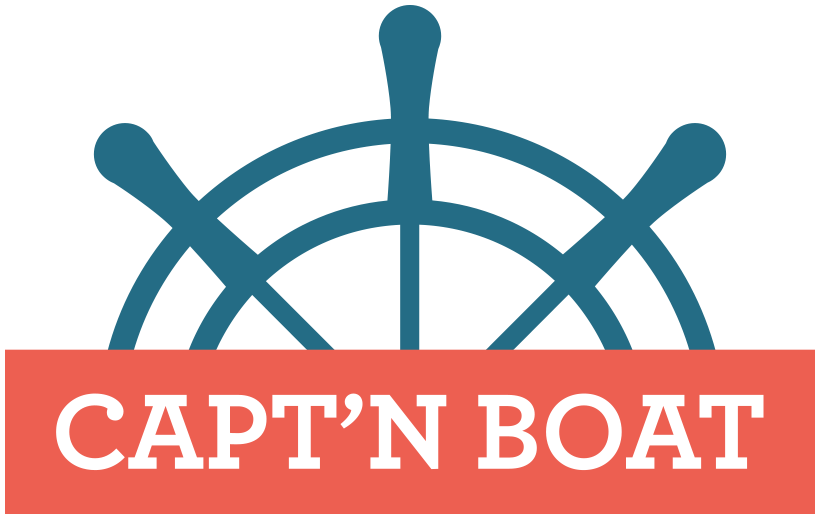
Becoming a skipper: qualifications, trainings, remuneration ..
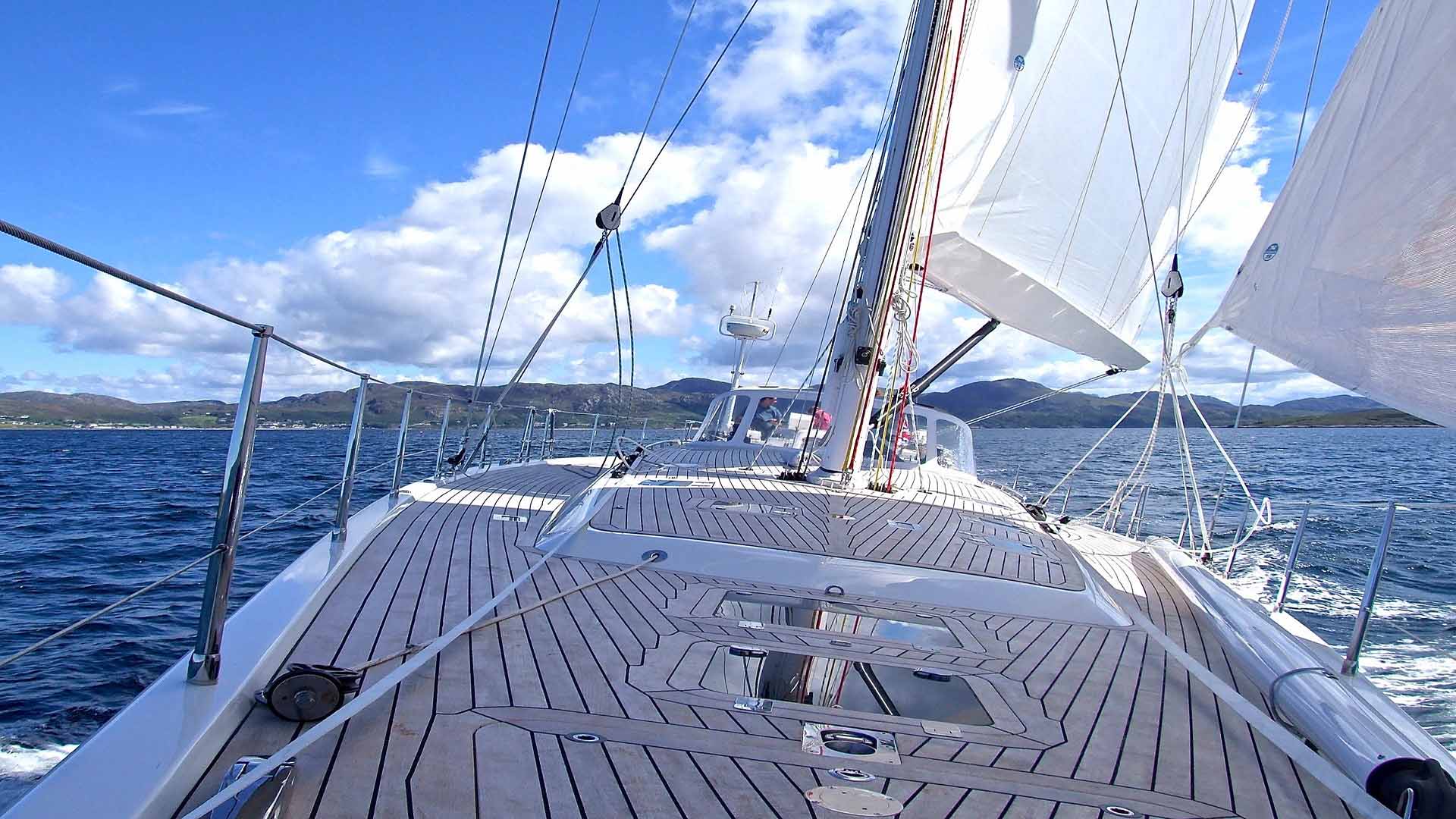
In a global context where the figures of the nautical sector are rather positive, the demand for skippers is growing every year. Becoming a skipper is a real passion coupled with a solid training. Capt’n Boat explains the role of a professional skipper, his trainings, his missions and his remuneration system.
A skipper is the person in charge of the navigation of a boat . He provides paid passenger transport (charter) as well as delivery (boat delivery) of pleasure boats from one port to another, he offers training services (sailing course) and improvement, or he sails a sailboat in sporting competitions (races).
1. What is a skipper?
The skipper is the only master on board . Thus, he is responsible for all the tasks and actions necessary on the boat:
- Driving the engines and electrical installations
- Relations between the crew and the client
- Safety and security of the passengers and the ship
- Management of the crew
- Hygiene on board and health of passengers
- Maintenance and repair of the vessel
- Radio communications
The skipper also plays an important role in the animation of life on board.

2. What are the missions of a skipper ?
The missions of a skipper are quite varied. A skipper works most often for vacation organizations, boat rental companies and takes summer guests on cruises. During the off season, he or she is more often employed to deliver private boats.
A. Boat deliveries
The mission of delivery consists, for a professional skipper, to convey a ship for a remuneration, between two ports or two sites by sea.
Generally, it is about :
- Driving boats to a shipyard for maintenance or wintering
- Routing boats to a race start
- Conveying boats to the home port following a purchase
B. Boat coaching
The improvement or coaching is an educational mission. The skipper’s objective is to teach the fundamentals of navigation and the use of a boat.
The services of a skipper are generally requested to:
- Train an owner following a boat purchase
- Propose improvement courses to owners in order to be more comfortable on their boat
C. Cruise with a skipper
Going on a cruise with a skipper is a good compromise to enjoy both the navigation and the sea air without being embarrassed by maneuvers, anchorages…
We also talk about doing charter missions with clients.
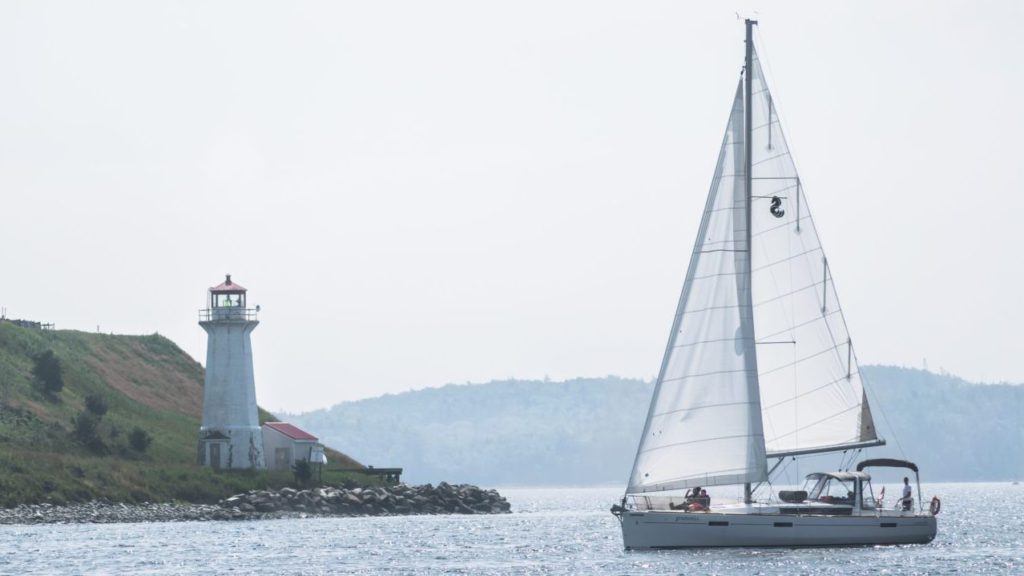
3. Which training to become a skipper?
A. internationally.
The most common certificate to work internationally as a skipper is the Yachtmaster . The Yachtmaster is an English degree from the Royal Yachting Association (RYA), recognized by the Maritime Coastguard Agency (MCA) and throughout the world. It allows skippers to command pleasure boats up to 24 meters long, and up to 200 miles from the coast. It has 3 levels and each one have limitations: Coastal, Offshore and Ocean.
To obtain the Yachtmaster, the candidate must be over 18 and have at least 1000 miles of navigation in 1st or 2nd category (corresponding to the distance from the coast). The theoretical tests cover a wide range of subjects such as:
- The ship and its components (technical, engine, electrical installations)
- Navigation in all its states (coastal and offshore, day and night)
- Maritime law relating to events at sea
- Meteorology and hydrology
- Sanitary conditions on board
The practical test takes place during a 12-hour navigation. It includes a night phase, a man overboard exercise as well as port maneuvers.
The Yachtmaster must be completed with a “Commercially Endorsed” endorsement in order to be used on commercial services for profit. To obtain this endorsement, the skipper must obtain the Professional Practices and Responsibilities certificate (PPR), the Basic Safety Training (BST), and the MCA Medical Examination (ENG1).
B. In France
In France, there are 2 main types of skipper certificates:
- The Merchant Navy certificates (Captain 200, Captain 500, Captain 3000…) for fishing and trade. Merchant Navy diplomas are authorized for boat deliveries and charters.
A Captain 200 Voile certificate is compulsory to work as a professional skipper in France. This certificate allows you to work as a professional skipper in yachting and sailing, either to carry passengers (12 maximum) on ships of less than 200 tons (about 24 m), or to drive a ship for a third party.
In order for the Captain 200 to be effective, you must also hold the BST, ROC/GOC, EM1 and a Medical Checkup .
- The State Certificates (BPJEPS, BEES ..), are qualified to carry out only training.
C. Yachtmaster or french title?
There is no one title better than another. It all depends on what type of vessel you want to work on.
If you want to work on French flagged vessels, Capt’n Boat recommends that you opt for the French titles. Otherwise, the Yachtmaster titles are a good option if you want to work on foreign flags.
There is now a gateway to work on a French flag with a Yachtmaster : the Master 200 GT.
4. Qualifications and obligations of the skipper
A skipper’s ability to make decisions, sense of responsibility, interpersonal skills, dynamism, initiative, composure and great resistance to physical and nervous fatigue are essential qualities for a skipper. The journeys can be long and the customers demanding, a skipper must therefore be able to adapt his behavior to each situation and people, he must be versatile, available and autonomous.
In any case, being a skipper is a “passion job” that requires a lot of investment. The human element is an essential part of this job, especially for charter services.
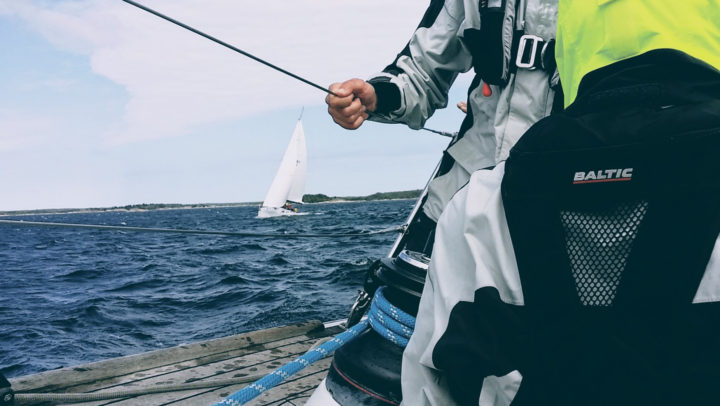
5. Remuneration of the skipper
The cost of a professional skipper varies according to the service (boat delivery, charter, coaching), the duration of the service, the sailing area, the size of the boat and the number of passengers :
- For charters, the remuneration is a daily rate. Example : In Croatia, a skipper is paid at least 240€/day ; In France, 300€/day ; In Saint Marteen, 250€/day ; In Greece, 240€/day ; In the Bahamas, 350€/day ; etc ..
The price varies according to the geographical area, each country has its own minimum wage.
- For boat deliveries, the remuneration is per nautical mile. Here, the wage is the same internationally : 3,5€ per nautical mile.
Want to become a skipper? Capt’n Boat offers you a professional marketplace
Here is a similar article: How to become a yacht stewardess: The fundamentals of the job 👈

Related Posts
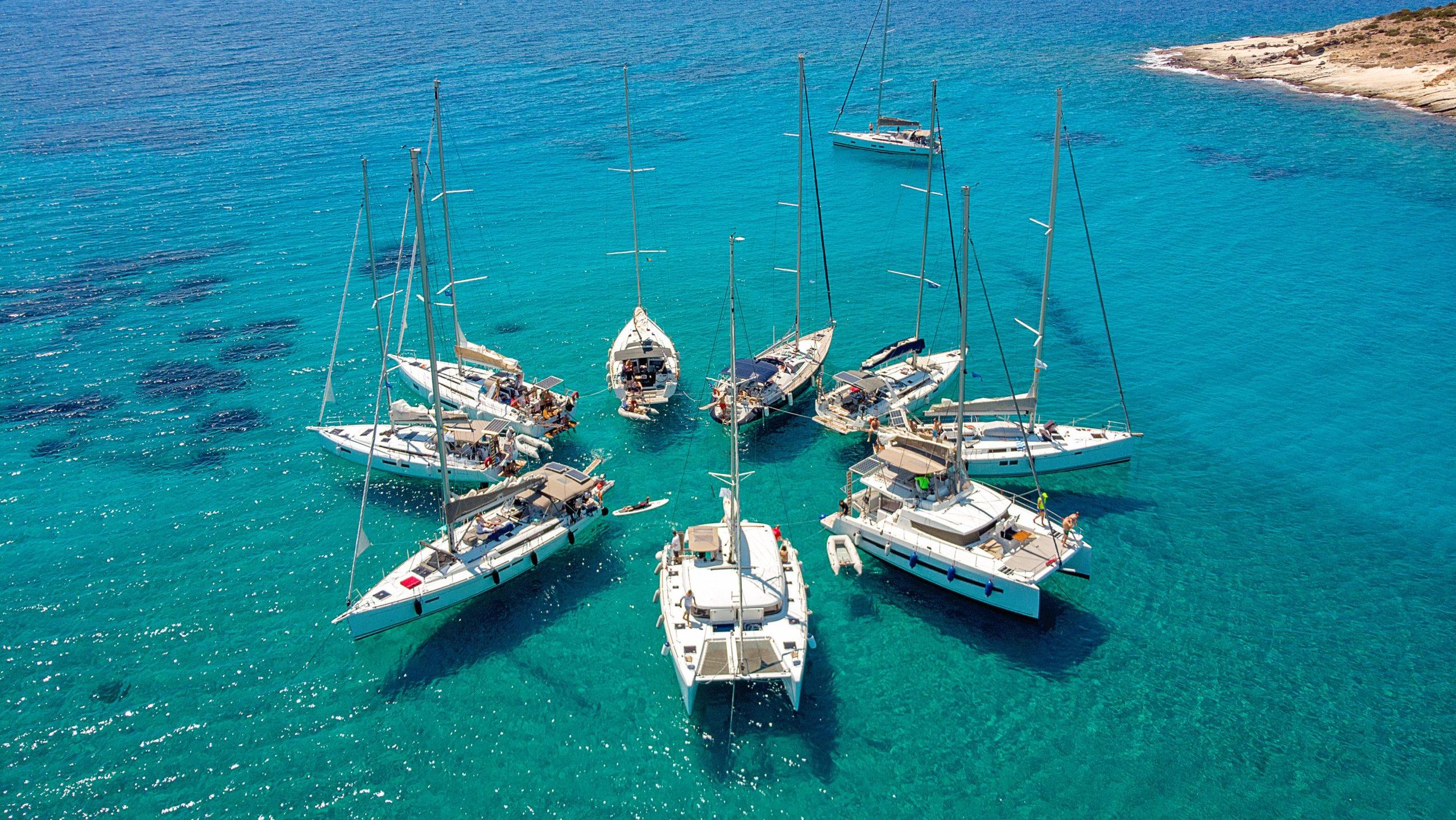
100% growth in 2023 for the 3rd consecutive year – Capt’n Boat makes the review
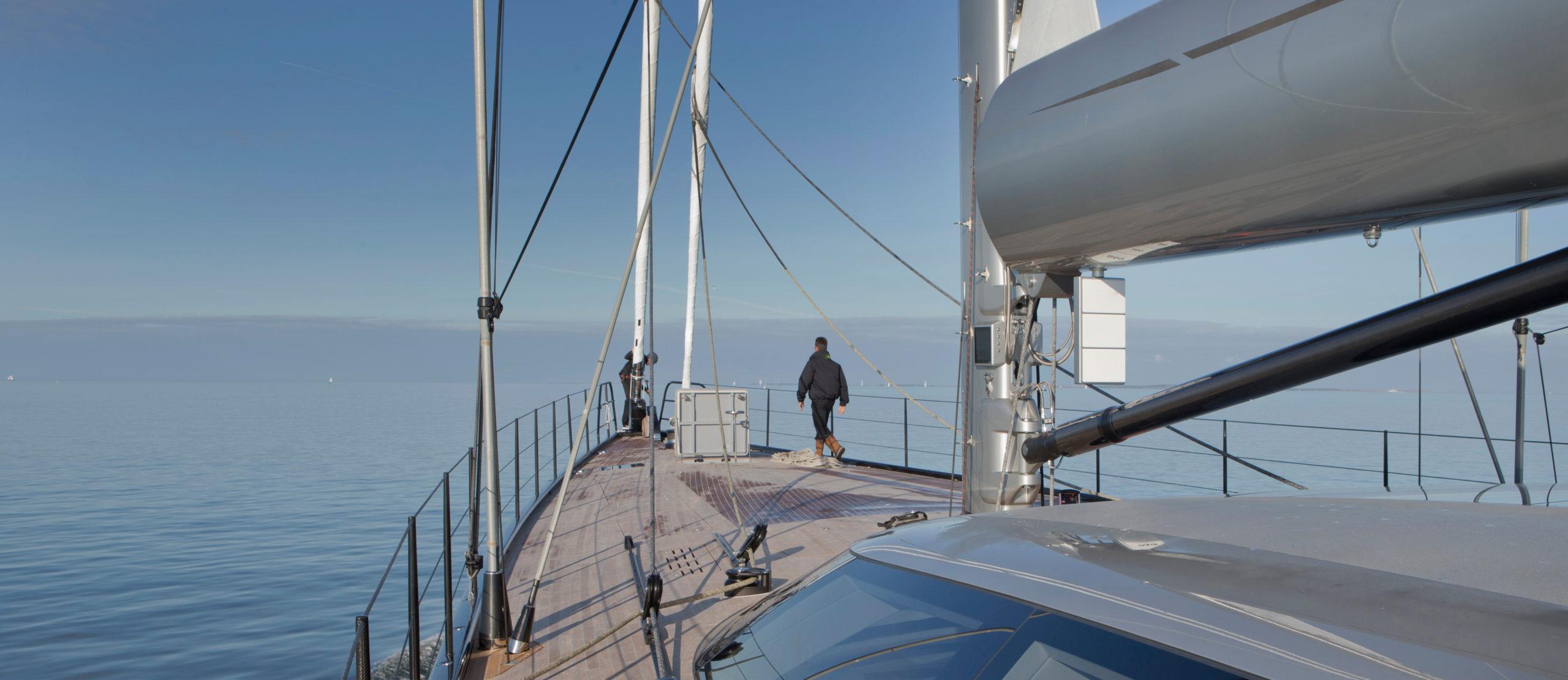
Skipper Jobs: How to find Capt’n Boat missions easily
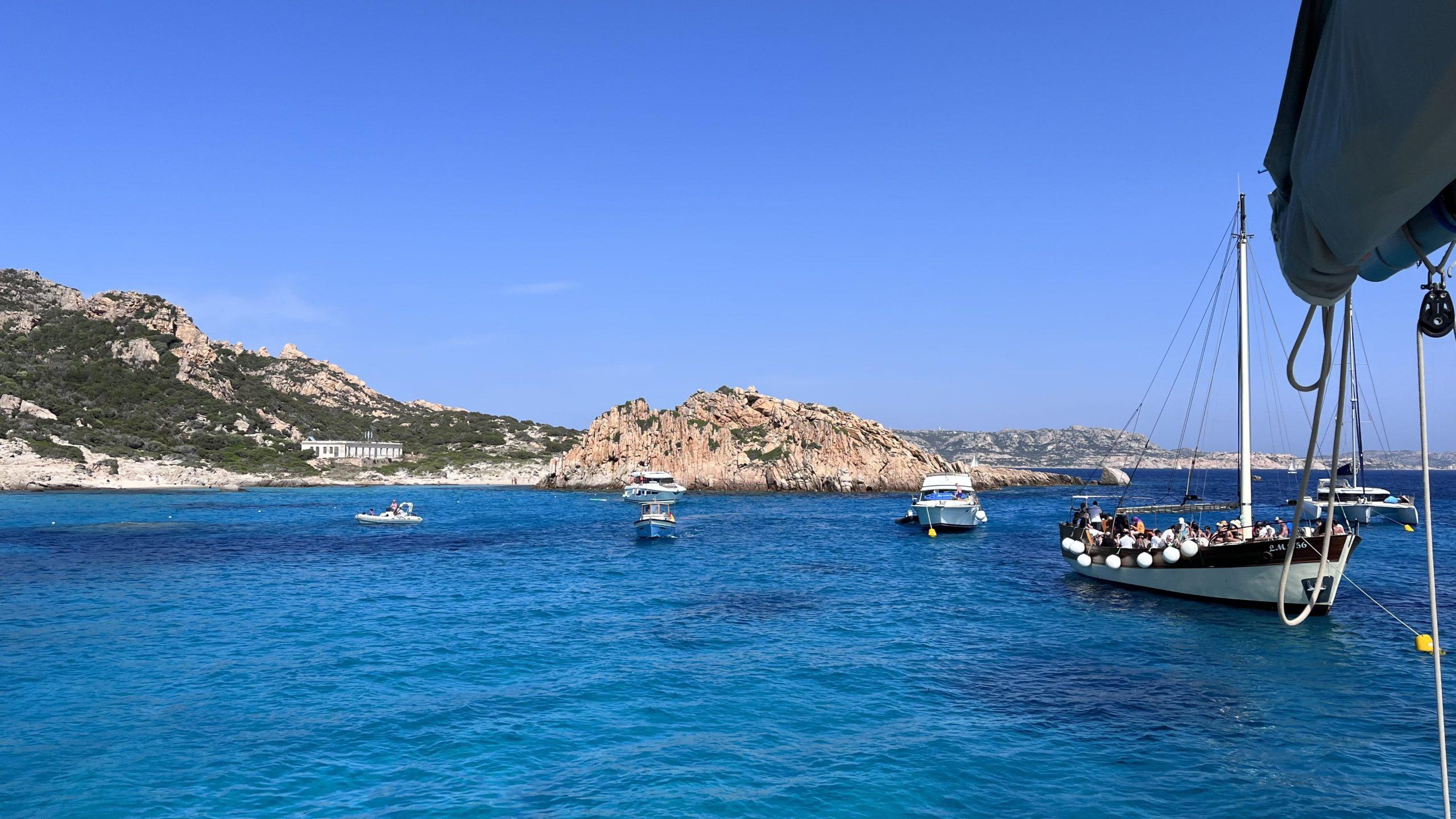
Cruise in Sardinia With a Skipper: Antoine’s Logbook

Skipper vs Captain: Who’s Who and What is the Difference?
Skipper vs Captain – what’s the difference, you wonder. I’m here to clarify that for you and present my point of view. Without further delay, let’s find out who’s who and learn the difference.
Skipper vs Captain
Define a skipper, etymology of skipper, what is a skipper on a boat, define a captain, etymology of captain, what is a captain on a boat, a simple “official” rule: captain vs skipper, a simple “unofficial” rule: captain vs skipper, skipper or captain, skipper vs captain – bottom line.
Honestly, “Skipper” comes more heartwarming to me. It sounds romantic, wild, and free, rather than “Captain.”
The Captain is a synonym of the impeccable order on a ship; he stands tall, undisputed, and official. While skippers represent freedom. Skippers construe the image of seafaring, I think.
The skipper and captain words are not equal yet interchangeable: any skipper is a captain, some captains are skippers, and the context is mostly emotional.
Who is the Skipper?
With the word skipper , an image of a salty sea dog with a wooden pipe in his teeth immediately hits my mind, he bravely cuts the roaring ocean apart with his brig, and he must murmur a “fifteen men on a dead man’s chest.” Flying a jolly roger is optional, but yes, this is how in a nutshell, we define a skipper!
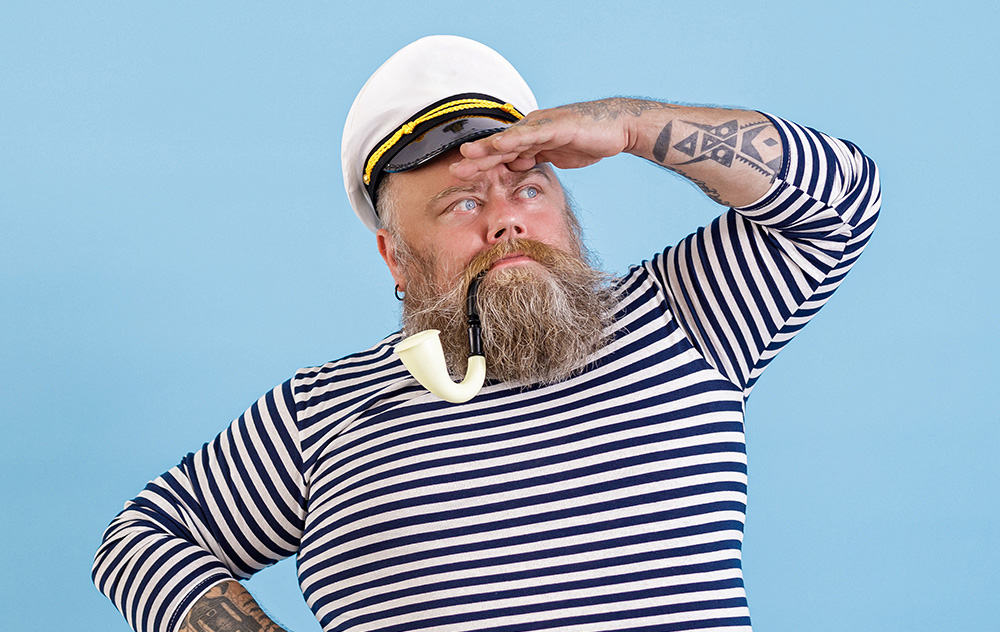
Both Cambridge and Merriam-Webster dictionaries, where the former stands for Classic English and the latter describe the American version of the language, state firmly that a skipper is a master of a ship (master and commander in one, to be precise).
Also, a skipper can serve as a word for one who leads a sports team or an aircraft. So he is a leader and the owner altogether.
To better understand who a skipper is, let’s dig up how the word has appeared in the language. Etymologically, Skipper as a word comes from Old and Middle English and shares the same root with the word “ship”:
SCHIP → SCIP → SKIP → SKIPPER
Thus, Skipper is one with the ship, not only sharing the etymology but sharing a character. More important, he is an owner of himself, and the word “skipper” often means he is an actual owner of the boat. The latter is not too strict language-wise yet displays the idea of who is a skipper.
We see in the dictionaries a skipper is a soul of a boat and the only one responsible for everything (just like a captain). The Skipper is presumably an owner of the boat or may behave like one; indeed, he is always an owner of the situation, compared to Captain – the latter can be ordered to do something. Skipper belongs to no one; he is ideologically an owner to himself.
For example, in everyday speech, we usually refer to the captains of pleasure yachts as skippers because pleasure yachts are relatively small private ships, where the owner and a captain are frequently the same person. Even though you can hire a seasonal skipper for your yacht, forming a partnership, business relations, doubtfully an assignment. Skipper is yet a freeman, or a freelancer, in our case, once hired.
Skipper is an ultimate professional, the same as Captain, but this is a free choice of Skipper to be such. Skipper lives one life for his boat and himself. The skipper is the master of his ship.
A skipper is also a captain of the boat, as of what the official papers state.
The word skipper mainly stands for emotion rather than for rank.
Who is the Captain?
We already know a bit about Skipper, so let’s now define the Captain.
We look for help in the Cambridge and the Merriam Webster again, the two most reliable dictionaries, both agree that a captain is a person in charge of a ship .
You can feel a tiny difference if we compare “a person in charge” to the definition of a skipper: “a master of a ship”. The former is assigned, the latter is just there.
Captain as a word may also define a rank in the force (navy, military, or police). So a captain is an official person, including one on a ship. More important he is assigned to be a leader, even if he has assigned himself. Captain as a word can refer to one who leads a sports team or an aircraft as well as the “skipper” term .
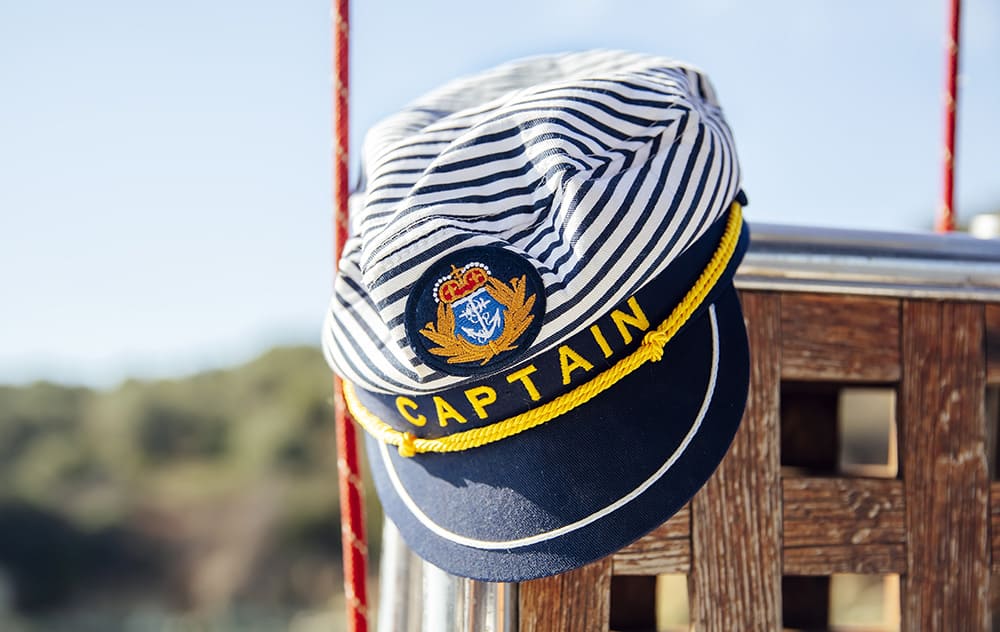
The “captain” word features a Latin origin, where “caput,” plural – “capita,” in Latin means “head.” There are many words like captain, capital, chapter, capsize, and many others, deriving from the Latin caput. All these words refer to a head but in a different measure.
The existence of the skipper word does not make a captain anything less desirable. A captain on a boat is the one in charge of everything. If she is a big boat, like a trans-Atlantic cruise liner, he is in charge of thousands of lives and controls a huge amount of things alone!
TIP Wondering how much do cruise ship captains make? Check!
Just a reminder, we still speak about the same person named either captain or skipper depending on the context.
A captain is always neat and trim, and you necessarily expect him to wear a snow-white uniform and a cap (we can see the same Latin root in the latter). The captain is the definition of order, he is a certified ultimate professional, he is the law on a ship, he is assigned for that, and it is his duty.
Difference Between Skipper and Captain
A captain is responsible for the ship, while a skipper has pulled it as a free choice!
Captain’s duty gives no right to be unpredictable, while Skipper is for that (but we speak about the same person named differently, remember?) The name of the principal penguin in “Madagascar” movie was Skipper, the leader of the penguin gang – just recall his commanding style and how he was driving an airplane. That’s the real Skipper.
We address a Skipper of a sailboat as Captain: “howdy, Captain?” but we refer to him using either word depending on what we want to express.
The “captain” word is also an official term but interchangeable even though being official: for example, my sailing license states I’m a skipper , but it means I can captain yachts.
You say “captain” if you want to compliment a person, as if you are giving him a rank of a captain, showing endless respect and obedience, also acknowledging his unreachable position.
You say “skipper” when your goal is to emphasize emotion and a wilderness of a captain. You refer this way to stress your captain is a dude. You hardly wish to call a “uniform” a dude, right?
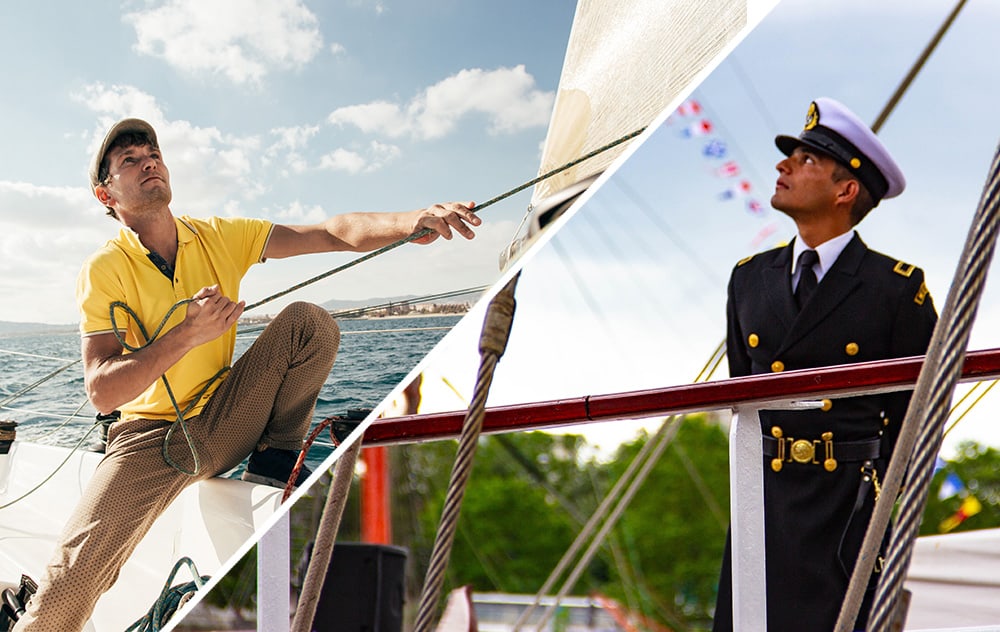
- Usually, the captains of bigger ships are called “captains,” applying that there is a permanent crew of significant size. Such captains are assigned for the job and are subsequently on duty.
- The captains of pleasure yachts are usually referred to as “skippers” because there is no formal assignment, and they are free people going anywhere they want, at any moment they want.
- Yet, in the official papers in the ports, both types are “captains.”
- Saying captain, you imagine a white uniform and a cap on top.
- Saying skipper, you imagine a confident pirate, yo-ho-ho, “and a bottle of rum,” adding up how skippers of pleasure boats tend to perform nearly insane maneuvers from time to time.
None of the two words is “higher.” Both words mean the masters of the sea.
So we can see “skipper” is an emotional word, while “captain” is an official term, and they both represent the same person (what we call interchangeable), but they stress way different contexts.
Here we have listed a bunch of definitions :
- Skipper is the (life-) style.
- Captain is the (official) position.
- On a cruise ship, you are a captain.
- Hunting whales you are a skipper.
- On “Titanic” he was likely a captain.
- On “Cutty Sark” he was definitely a skipper.
If you saw the movie “Master and Commander,” Captain Jack Aubrey owned HMS “Surprise,” he was not hired for her. As a navy officer, he bent his orders and put the crew at risk while chasing a wartime enemy; it was both his duty and a desperate wish to take the prize. Does it come as a conflicting definition? Let’s name him a skipper.
Yes, you can call even an aircraft carrier’s Captain a Skipper, then you emphasize that he is a reckless, pirate-minded type of commander, he is in love with what he is doing, and he acts as if she is his ship.
What is the difference between a skipper and a captain – I have told you all I know; the words, however, are mostly interchangeable. The difference is purely emotional.
Till the next time, Skipper… or Captain!
Disclaimers
All product names, logos, and brands are property of their respective owners. All company, product and service names used in this website are for identification purposes only. Use of these names, logos, and brands does not imply endorsement.
It is our policy to make every effort to respect the copyrights of outside parties. If you believe that your copyright has been misused, please provide us with a message stating your position and we will endeavor to correct any misuse immediately.
Some of the links in this post are affiliate links. As an Amazon Associate, we earn from qualifying purchases. This means if you click on the link and purchase the item, we may receive an affiliate commission, at no extra cost to you. This helps us keep this website alive. Learn more here .

Hi, I’m Igor, Skipper of S/Y "The Hooker". A decade ago, I conquered my childhood dream: to be a sailing skipper, own a sailing yacht. Yes, it knocked dullness out of my urban life — Read more →
One comment
Thanks for the information! This is really helpful and gives me a clear picture of the differences between skipper and captain.
Leave a Reply Cancel Reply
Your email address will not be published. Required fields are marked *
Name *
Email *
Add Comment *
Save my name, email, and website in this browser for the next time I comment.
Post Comment
Related Posts

How Fast Can A Sailboat Go? FAQ
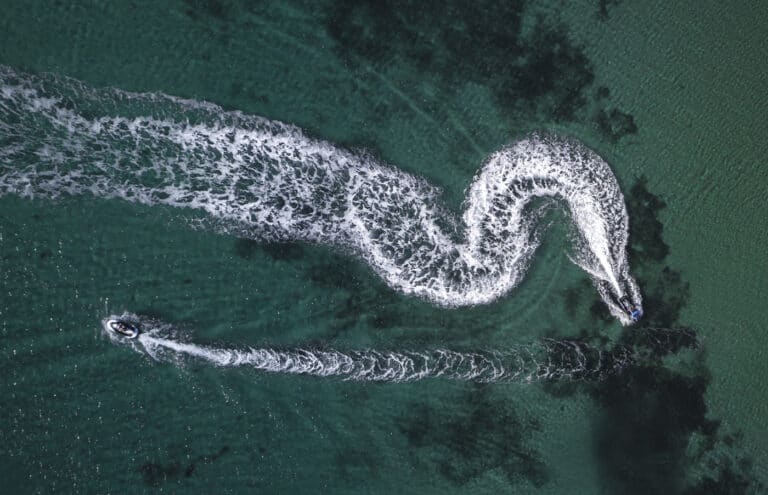
Crossing Paths With Other Boats: Frequently Asked Questions
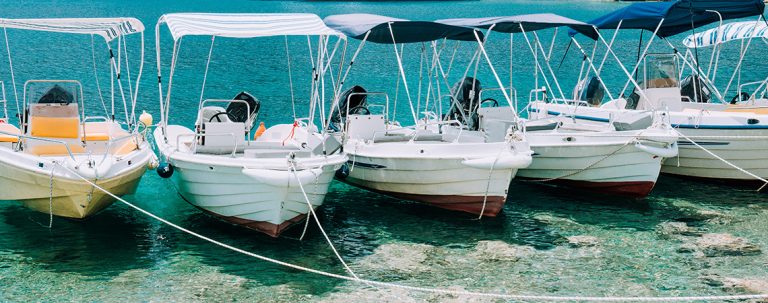
How Do Most Anchors Hold a Recreational Boat in Place
Amazon Disclosure
DesperateSailors.com is a participant in the Amazon Services LLC Associates Program, an affiliate advertising program designed to provide a means for sites to earn advertising fees by advertising and linking to Amazon.com. As an Amazon Associate, we earn from qualifying purchases. Amazon and the Amazon logo are trademarks of Amazon.com, Inc., or its affiliates.
Please refer to our Privacy & Affiliate policy for more details.
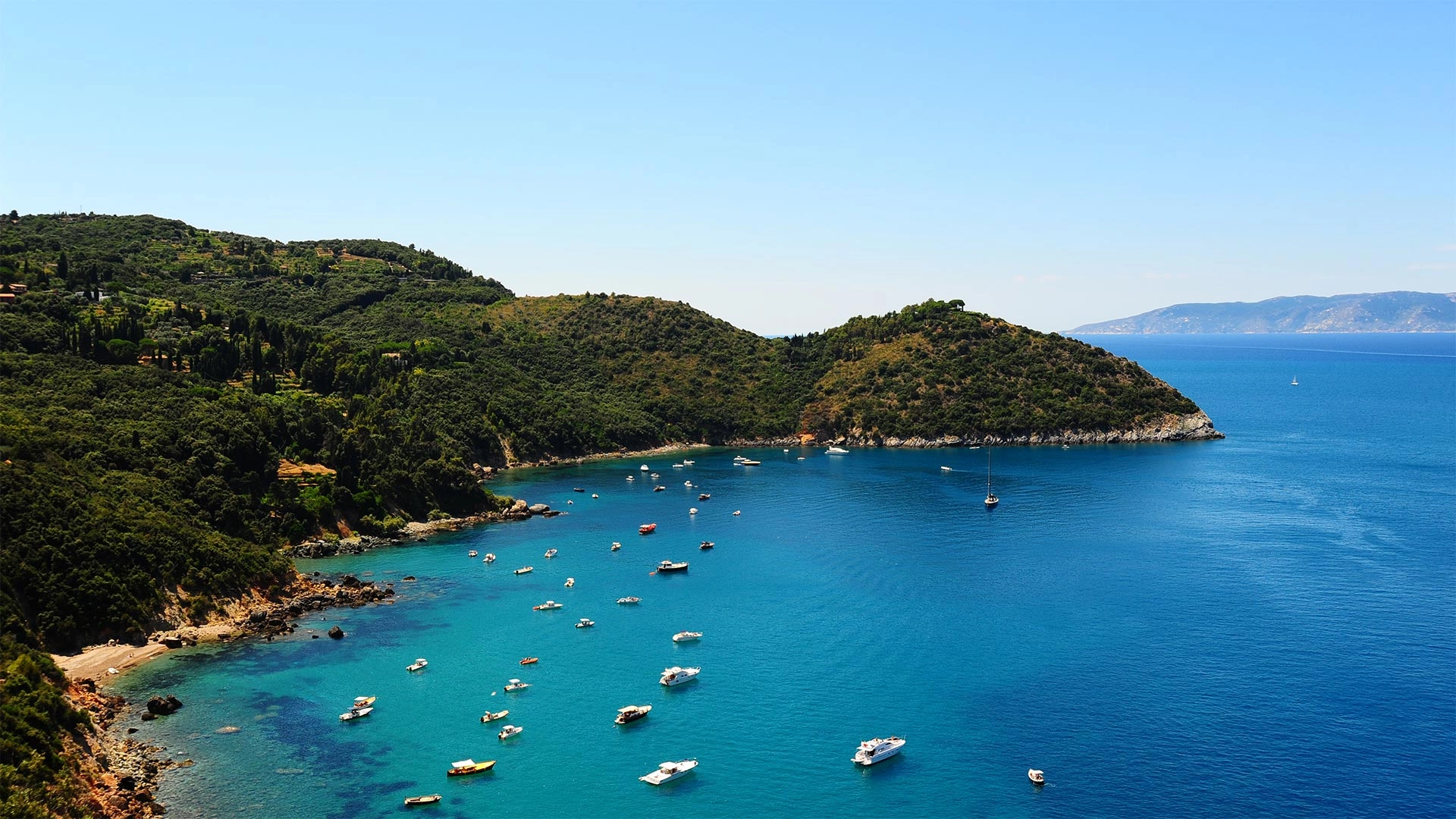
Renew Your Certificate
Recreational courses, superyacht courses, choose your location.
There is an IYT school on six continents. Begin training in the Mediterranean and finish in the Caribbean. Wherever you choose to be! IYT’s unique modular approach to yacht training has allowed the successful establishment of global partner schools offering a broad range of recreational and professional courses.

North America

South America

Learn to Sail
Become A Partner School
- Upgrade Your School
Government & Organization Approvals
- Recreational
- Privacy Policy & Terms Of Use
- Become a Partner School
- Register with IYT
- Find a School
- IYT E-Learning
- Certificate Renewal & Replacement
- Get Certified
- Recreational Training Course Progression
- IYT Passport
- Crossover Opportunities
- Course Progression
- Course Progression Interior
- Dive Boat Training
- Forms And Docs
- Instructor Training
- Personal Watercraft Operator
- Dinghy Sailing Programme
- IYT Try Sailing
- IYT Introductory Sailing Skills
- IYT Day Skipper / Crew Sail
- International Crew
- International Flotilla Skipper
- International Bareboat Skipper
- International Flotilla Skipper Sail – Catamaran
- International Bareboat Skipper Sail – Catamaran
- International Certificate of Competency (ICC Certificate)
- Powerboat Skipper
- Yachtmaster Coastal (Power or Sail)
- Yachtmaster Coastal Sail – Catamaran
- Yachtmaster Offshore (Power or Sail)
- Yachtmaster Offshore Sail – Catamaran
- Yachtmaster Ocean
- Patron de Yates (Yachtmaster Coastal Spanish edition)
- Marine Communications (VHF-SRC)
- Small Powerboat and Rib Master (MCA Recognised)
- IYT Commercial Tender License Course
- Weather Master
- Navigation Master
- Master of Yachts Coastal/Mate 200 Tons (Power or Sail)
- Master of Yachts Limited (Power or Sail)
- Master of Yachts Unlimited
- Superyacht Chef
- Superyacht Deck Crew Course
- Superyacht Hospitality Training
- Boat Engineer Course (SCV Code for Vessels Operating in the Caribbean)
- IYT-MSWI BoatMaster Course
- Become An IYT School
- Find A School
- Course Levels
- Instructor Qualifications
- Vessel Requirements
- Vessel and Facility Requirements
- Unauthorised Schools and Other Entities
- Shipping & Delivery
- Government Approvals
Yachting Monthly
- Digital edition

Skippering a boat for the first time: steps to success
- Katy Stickland
- September 18, 2020
Skippering a boat for the first time needn't be daunting, as long as you prepare. Matthew Diggle reveals how to make a success of taking charge

New skippers don't need to be at the helm, and giving crew tasks will keep them happy and motivated. Credit: Matthew Diggle
It’s a pity that skippering a boat for the first time can seem so intimidating.
Not much beats the feeling of being in charge of a yacht, deciding where to go, and taking the crew on an adventure.
And there’s a real sense of accomplishment at the end when you bring the crew and boat home safely.
For anyone who is new to sailing or who crews for someone else, following the RYA training path and becoming a Day Skipper is an excellent way of taking your sailing to the next level.

As you gain confidence you can start to charter and explore new cruising grounds. Credit: Matthew Diggle
It shows that you understand the fundamentals and can take on more responsibility when other people feel daunted by the thought of being responsible for a boat and its crew.
With a bit of preparation and planning, skippering is well within most people’s capabilities, especially if you don’t bite off more than you can chew for the first few trips.
Preparation is the key. Simply put, you have to decide where to go, who to go with, and how to get there.
I thought it would be useful to share the lessons I’ve learned when I first started skippering for those considering taking their first steps.
Skippering a crew
Sailing boats are not particularly spacious down below so I generally don’t try to fill every berth onboard.
Even so, it is vital that the crew can get along together and this means that you have to choose who to invite carefully.
This is often a bit of a juggling act, trying to coordinate different people and boat availability, so in the end you’re unlikely to be able to please everyone.
Just offer some reasonable options and hope for the best.

Careful crew selection will contribute to a happy trip for all. Credit: Matthew Diggle
It is also important that people know what to expect, so they don’t sign up thinking that they’ll have a spacious cabin with en-suite facilities when they’ll actually get a space in the shared forepeak in a boat with a single heads.
Similarly, being clear about the nature of the trip – that this is your first time skippering – will avoid adrenaline-junkies being frustrated by a gentle coastal cruise, or nervous novices being scared rigid during an offshore passage.
When skippering the first few times, it is well worth inviting an experienced and knowledgeable sailor to act as first mate.
But you should choose them wisely as you don’t want anyone who will take over or boss you about if you’re a bit slow working something out, or don’t do things in exactly the way they would.
What you really need is a calm and supportive person who will give you the space to experiment, have a quiet word in your ear if they are concerned that something is wrong, but who is capable of taking over if you are incapacitated in any way.
After all, you have to trust them to come back to pick you up if you have the misfortune to fall in, and you must be confident that they could get the boat and crew to somewhere safe if needed.

A competent first mate will make your life as skipper much less stressful. Credit: Matthew Diggle
In return for the safety and security they provide, you should listen carefully to what they say and pay attention to their skippering advice.
You should also make it clear to the rest of the crew who the first mate is and that they may have to assume command.
It is also sensible to ensure that not all the crew are novices.
Coaching new crew is time-consuming, and sometimes time is in short supply.
It also takes up mental space while your head needs to be concentrating on skippering the boat.
This is especially true when coming into a berth.
Having one or two people capable of handling the fenders and warps will avoid the sort of situation I got into on one of my trips where I didn’t notice the crew were busy trying to remember how to tie the fenders so that when I got the mooring slightly wrong, they didn’t see we were drifting towards another boat and I ended up shouting.
In the end, someone from the other boat pushed us clear, but it definitely wasn’t my finest hour as skipper.

With the crew briefed and kitted up, you’re ready to sail. Credit: Matthew Diggle
I usually send round practical information about arrangements, including advice about what to pack (and what to pack it in), about sharing cabins, what we will do about food, and also some reassuring words about the safety equipment on board.
More experienced crew members will probably already be aware of some or all of these things, but it is a good idea for everyone to have the same information so that there is a common starting point.
But I usually throw an extra sleeping bag in the car and make sure I check everyone’s equipped before setting off, just in case.
Organising a planning meeting, arranging to share lifts to the boat, or making some other excuse to get people together beforehand is a good idea.
The better people know each other, the more smoothly the trip is likely to run.
Encourage people to use email or social media to communicate, but make sure you ask for permission before sharing email addresses or phone numbers.
Keep your first skippering trip in familiar waters
Although it might be tempting to go exploring, you will probably have enough to think about without having to navigate around somewhere entirely new.
Indeed, the Day Skipper qualification says that you are only competent in ‘familiar areas’, but even here you might find yourself sailing from a marina or harbour you’ve not visited before.
If this is the case then do some research to get an idea of what to expect.

Sailing in familiar waters will let you focus on skippering rather than navigating new hazards. Credit: Matthew Diggle
When you pick the boat up, take the opportunity to chat with the charterer and people on other boats nearby to get some local knowledge.
They’re likely to regale you with anecdotes about other visitors who have come to grief in one way or another.
Don’t let these tales put you off, just listen carefully and then you won’t feature in their next story.
Unless you have a particularly trusting boat-owning friend you will probably also need to use your Day Skipper qualification to charter a yacht.
Again, you are better settling for something which is not too adventurous or enormous.
This is not the time to have to deal with something much bigger than you’re used to or with extra sails, rigging, or masts that you’re not accustomed to.
The cost of the trip
One of the first practical aspects of arranging a trip is to sort out the finance.
You will need to cover the cost of the boat, together with mooring and fuel, and then decide whether to include food, meals out, and drinks.
I find that the simplest option is to share all the costs equally, and the first step is to prepare a rough budget so people have an idea of how much the trip is going to cost.
It’s generally better to over-estimate and then give people a small refund, rather than to try to collect an extra few quid from everyone at the end of the trip if, for example, there was a lack of wind and so the fuel costs more than you expected.
You also need to consider what to do about the cost of any damage.
Continues below…

Masterclass: How to lead a happy crew
Toby Heppell gets advice on skippering with friends and family from Pete Goss, Dee Caffari and Conrad Humphreys

Competent Crew: On course for cruising harmony
Katy Stickland joined an RYA Competent Crew course to find out why instruction can make life as a sailing couple…

Night sailing tips for first timers
Cruising after dark doesn't need to be stressful. Toby Heppell shares his tops tips for night sailing

How to raft up safely and securely
James Stevens looks at the seamanship and etiquette needed to raft up and identifies the benefits and pitfalls of coming…
Do you trust everyone to stump up or would it be easier to include insurance in the basic cost of the trip?
You may find that potential crew are rather more enthusiastic about coming on a sailing trip in theory than they are in practice.
Asking them to pay a deposit when booking and the rest closer to departure is a good way of gaining commitment and preventing them from cancelling at the last minute.
Finally, record all expenses and payments so that everyone can check the figures and see that things have been divided up fairly.
This should help prevent disagreements.
There are a number of apps to make both the sums and payment straightforward.

Safety procedures
You are responsible for everyone’s safety and you should take this seriously, but in fact this usually isn’t too onerous if you are sensible and careful.
If you charter a coded vessel in the UK then it will come with a full set of safety equipment appropriate for its cruising limits.
All you will need to do is find where everything is stowed and familiarise yourself with specific details of the lifejackets, jackstays, and so on when you pick the boat up.
Then make sure the crew know how to use it, and do so at the appropriate time.

Brief the crew about safety equipment on board. Credit: Graham Snook/Yachting Monthly
I ask for an emergency contact number for each crew member, and in return let them have details of a shore contact.
I also ask crew members, in confidence, about any medical conditions that might affect them on the trip.
If someone falls ill you don’t want to be scrabbling about trying to find out if they have an inhaler or medication that could help.
Similarly, if you have to hand them over to an ambulance, the medics are likely to ask if they are allergic to common medicines.
There’s no need to share this with anyone beforehand, but I like to leave a copy with the shore contact and let the first mate know where the info is on the boat, just in case it were to be needed.
Catering for your crew
The first step when planning what to eat onboard is to check everyone’s allergies, likes, and dislikes.
With a modicum of thought it is quite feasible to cater for vegetarian, gluten-free, and other diets without making things too complicated.
There’s certainly no excuse for only offering a vegetarian crew member cheese sandwiches for every meal.

Good food on board boosts morale and can be a highlight of the trip. Credit: Matthew Diggle
On short, coastal trips I usually just cater for breakfast and lunch, and aim to eat ashore most evenings.
However, I like to have a simple ‘emergency meal’ on board, such as pasta and a jar of sauce, to make sure we can have a hot meal even if we end up at anchor rather than in a marina as planned.
I find that snacks, fruit, and biscuits are always welcome, and distributing a few chocolate bars can really lift the spirits during a hard slog or a long beat to windward.
Navigating your first trip
Once you’ve selected your crew, booked a boat, and decided on a cruising-ground, it’s time to start on the detailed preparations.
It is worth putting some effort into making the actual trip as straightforward and stress-free as possible.
Skippering means you’ll have lots to think about, so take any opportunity to ‘cheat’ by preparing things beforehand.
Your RYA training will have taught you how to work out tidal depths from the tables in an almanac, but why not print out some tidal curves for the time you’re away, in particular for any marinas you’re thinking of visiting?
Planning and navigation software packages can do this well in advance, and you can find information for the next few days online.
After all, you can still do things the traditional way if you want to impress your crew (or just to prove to yourself that you remember how) but if things are going wrong or time is short then having ‘one you prepared earlier’ can be a literal life-saver.
Weather forecasts
Similarly, you can download weather maps and forecasts for the next few days before setting off.
Obviously, things will change so you will have to re-check the forecast every day, but having a feel for the general weather pattern should help you decide whether to turn left or right when you leave the marina on the first day.
Unless you’re feeling particularly masochistic or determined to experience ‘life at an angle’, it’s not very clever to spend the first half of a trip on a hard beat only to find the weather system passes and you spend the second half on a hard beat back again, when setting off in the other direction initially would have resulted in a pleasant cruise, both ways.

Plan a couple of route options in case the weather changes. Credit: Matthew Diggle
Finally, get hold of any information you can about places you might visit or that you might want to have in reserve as bolt-holes.
Printing out some sketch-maps and pilotage notes can help you stay up on deck rather than spending time below checking the charts.
Share your plan with the crew, but make sure everyone knows that you might have to revise it due to things like a change in the weather.
Picking up the boat
Try to pick up the boat before the crew arrives.
Taking the inventory and doing the handover is much easier if the boat is not full of people and all their kit.
Then put the kettle on ready to give the crew a warm welcome.
If you’re parking a car at the marina then it is sensible to leave as much stuff in it as possible, particularly bulky bags and rucksacks.
A set of dry going-home clothes (and shoes) together with a dry towel and a bag for damp kit is a good idea if you think you might arrive back cold and wet on the last day – and if you’re sailing in the UK that is pretty likely!
Briefing your crew
Brief the crew before setting off.
Keep this simple and to the point; you don’t want to worry people, but it is important to point out the key things.
I usually include:
- Lifejackets and tethers
- Fire prevention and extinguishers
- Galley and gas safety
- First-aid kit
- How to turn off autopilot
- Using winches safely
- Starting the engine
- VHF radio and sending a DSC mayday
- Using the heads
Give a briefing that is appropriate for the crew, so you might have to have a couple of different briefings or even give one to the experienced people and get them to brief it on.
It’s a good idea to show people how to use pontoon cleats before setting off, rather than trying to explain this at the end of the day.
Other things about sailing the boat can be introduced gradually over the course of the day.
Consider having simple standing orders to make it clear what’s expected of the crew.
These should include rules about wearing lifejackets and tethers, such as ‘whenever you want to and whenever I tell you to’.
Remember to let your shore contact know when you set off, and also when (and where) you arrive.
Using the RYA SafeTRX app is a great way of ensuring that they are alerted if you’re overdue and it can also produce records of the trip that the crew may find interesting, but do keep your mobile charged during the trip or you might not be able to close the trip when you arrive, leading to possible confusion or concern.
When skippering, try to keep everyone involved in running the boat.
In challenging conditions it may be prudent to limit some tasks to more confident and experienced crew, but don’t let them dominate and hog the helm or other exciting jobs the rest of the time; make sure that everyone gets a turn.
Remember to be positive about everyone’s efforts, patient if you have to explain things, and gentle if you have to correct someone.
After all, they’re here to enjoy themselves and a harsh word may put someone off ever sailing with you again.

If you can, go with the wind when it blows up. Your crew will thank you. Credit: Matthew Diggle
Keep an eye on the crew so you’re aware if anyone is starting to suffer from seasickness or is getting cold, and deal with it before it gets too bad.
I find that putting seasick crew on the helm or persuading them to lie on a bunk with their eyes closed usually helps.
Hot drinks and an offer to pass up warmer clothes will help a cold crew member who is, perhaps, avoiding going below decks.
You are in charge of the boat and part of skippering is to ensure the crew have confidence in you.
So, remain calm at all times, or at least appear calm while you work out what to do next.
Don’t dither, it’s your responsibility when skippering to make decisions and when faced with a choice almost the worst thing you can do is nothing.
On the other hand, don’t be afraid of changing your plans if conditions change.
Don’t sail on regardless, hoping that things will turn out alright; shorten the trip if the crew are struggling, change the destination if the wind shifts.
Final words on first time skippering

Matthew Diggle started sailing after signing up for the 2011-12 Clipper Race. Since then he’s cruised in UK waters and off the Italian and Croatian coast. Credit: Matthew Diggle
It’s always worth having a debrief at the end of the day and of the trip to reflect on what people enjoyed, learned or didn’t understand, and hopefully this will help ensure everyone leaves happy.
As a skipper you are allowed to have fun too, but it is different to going on a trip that someone else has organised.
It may seem hard work and a little daunting to start with, but you’ll get into your stride after only a few trips.
I find it immensely satisfying when crew tell me that they’ve enjoyed a trip, that they’ve learned new skills, and, most of all, that they want to come back.
So why not start planning a trip and gathering a crew now?
First time skippering checklist
- Select crew with similar expectations
- Mix of abilities and experienced first mate
- Set expectations of boat and plans early
- Email joining instructions ahead of time
- Take a spare sleeping bag and waterproofs
- Meet up before the trip if possible
- Share shore contact details for the boat and get emergency contact for each crew
Cruising grounds
- Stick to familiar areas for first-time skippering
- Research new places you want to visit
- Get some local knowledge from charter company or marina
- Charter in an area you know
- Opt for a modest-sized boat that will be easy to sail
- Stick to white sails and don’t worry about spinnakers
- Arrive before the crew to settle in
- Decide what costs you will cover, and what you will split
- Be clear with your crew about how much it will cost
- Include a margin for extra fuel, and refund if possible
- Ask for a deposit so crew commit
- Check the boat has all the necessary safety equipment and where it is
- Brief your crew on safety gear and procedures, above and below decks
- Check if crew are on medication or have medical requirements
- Check and fit lifejackets
- Establish standing orders of when to wear lifejackets, who is in charge, and who first mate is
- Check for crew allergies, likes and dislikes
- Decide if you’re cooking on board or eating ashore
- Have enough for breakfasts, lunches and a back-up meal
- Take plenty of snacks, tea, coffee and milk
- Print out tide times, tidal curves and weather forecasts beforehand
- Plan a couple of route options to cover different weather scenarios
- Aim to make the first sail an easy one
- Prepare pilotage for new places you plan to visit
- Let shore contact know plans/use RYA SafeTRX app
- Share and rotate roles among crew
- Look out for bored, cold or seasick crew
- Distribute snacks and drinks regularly
- Keep an eye on the big picture – passage plan, weather, navigation and safety
- Teach crew if you have time, but don’t be distracted
- Discuss plans, but you make the final decisions
- Debrief at the end of the day and of the trip
For all the latest from the sailing world, follow our social media channels Facebook, Twitter and Instagram .
Have you thought about taking out a subscription to Yachting Monthly magazine?
Subscriptions are available in both print and digital editions through our official online shop Magazines Direct and all postage and delivery costs are included.
- Yachting Monthly is packed with all the information you need to help you get the most from your time on the water.
- Take your seamanship to the next level with tips, advice and skills from our expert skippers and sailors
- Impartial in-depth reviews of the latest yachts and equipment will ensure you buy the best whatever your budget
- If you are looking to cruise away with friends Yachting Monthly will give you plenty of ideas of where to sail and anchor
- Skip to main content
- Skip to secondary menu
- Skip to primary sidebar
- Skip to footer
Crowsurvival
Experience the Best that RVs, RV Accessories, Campers, Boats, Hiking & Fishing has to offer.
What Is A Boat Skipper & What Do They Do?
Jonathan Holmes 5.0 Rated 5.0 out of 5 5.0 out of 5 stars (based on 46 reviews)
Last updated on November 3rd, 2022
Unquestionably, boating is and should be a fun experience. However, no one will enjoy if there’s no safety. Remembering to be safe on the water should be any boater’s number one priority. To guarantee a great boating experience for everyone on board, a boat skipper comes in handy.
Now, if you’re wondering what is a boat skipper, then, you need to keep on reading. This article has been tailored to help you with everything you need to know about a boat skipper.
Table of Contents
What is a Boat Skipper?
A boat skipper is a person that commands a boat and its crew. In naval terms, a skipper is liable for the care and safety of the ship, vessel, boat or yacht. This is true of the captain too. Additionally, the captain is also accountable for the care and sanctuary of the crew. That’s why a captain is also known as a skipper.
The Duties of a Boat Skipper
A boat skipper is the heart of a vessel. He or she is liable for the boat and must take care of everything else related to it. Accordingly, everything the skipper says ought to be interpreted as a command by the occupants of the boat. This is because, sometimes, the decisions made by the skipper could be the difference between your life and death.
The skipper’s work not only involves the earnest work on board. It can further involve his recommendations on exciting routes, new sites to visit or instructions to follow while in the water or on shore. He is conclusively responsible not just for the sanctuary of the boat but also the protection, welfare, and comfort of all those on board.
The Demands on a Skipper
The demands on a boat skipper vary according to where the boat is navigating. In case the boat is cruising close to the beach, within easy access of a native port, the skipper’s job is simple. Once the boat is covering longer passages, at some distance off the shore, and away from the region the skipper is familiar with, his responsibilities become more wanting. This is because he must allow for likely night cruising, approaching unfamiliar harbors, and the likelihood of having to navigate through bad weather.
Offshore, at a significant distance from land, the demands become even greater. They can include coping with lengthened periods of poor weather, gear failure when there’s no one nearby to call for help, crew illness and many more. Actually, these are just a few of the challenges the boat skipper may need to handle.
Responsibilities of a skipper
As mentioned above, a boat skipper is the most influential person on a vessel. Therefore, there are many responsibilities bestowed on him. To begin with, he plans the whole passage to the suggested destination, which sometimes can take a number of days. Secondly, it’s the duty of the skipper to make sure that whatever voyage the boat is making whether for holidays or for fishing he follows all the maritime statutes. Next, he navigating the boat and provides good care and the safety of the boat and the crew and also manages the boat in all respects. In other words, he must know how to run and maintain all the facilities on board.
The Working Hours for a Skipper
When it comes to working hours, a skipper is usually dependent on the field of work. If a boat skipper is self-employed operating on his own boat, he can function for as long as he wants. A skipper that is on an inshore boat would go back to the shore every day while the offshore boats venturing out in waters away from the shore would be in a position to return just after days, or weeks at sea.
Characteristics of a Good Skipper
Be a good leader.
A good leader displays confidence and instills the same in the crew. He knows what his crew can do. He is a good coach/teacher and communicates efficiently. Further, he demonstrates how things should be done with perseverance and keeps collected whenever he faces adversity. A good leader doesn’t require yelling or scream to his crew. His crew looks up to him to be the leader they want.
Technically proficient
A good boat skipper knows how to navigate; he is good seamanship and thus will know how to cruise your boat. Also, he will well understand your boat’s capabilities and constraints. He will know exactly what you require to do in case you get into problems, and better yet, understand enough on how to stay away from trouble, to begin with. A good skipper understands that his crew doesn’t necessarily require him to be an expert, but they are going to expect a certain level of competence in him.
Cultivate a fun and relaxed environment
Mainly, the crew sails for fun. So, good skippers make sure the crew appreciate themselves, feel comfortable while on the boat, and let them take part in managing the boat. Hence, a good skipper needs to unwind and sing one sea-shanty or two.
Be Organized
An organized boat skipper is probably to have an established boat that in turn is going to likely be properly-maintained, safe, and will instill trust in the crew. A good and organized skipper is going to have enough stores on board and ensure the crew understands what they require to know. Standard procedures and standing orders will be steady and appreciated by all. Organized skipper assists alleviate confusion and anxiety in the crew minus driving them insane with his marginal obsessive-compulsive disorder.
Keen on Safety
Lastly, a good skipper knows the overriding importance of ensuring that the crew stays safe. Here, the crew expects the skipper to be watchful for them and prevent them from jeopardizing themselves through inattention or ignorance.
So, if you happen to be a crew, watch out for the above traits before you sign on to someone’s boat. Some skippers will possess an abundance of all of these qualities, but most ought to have some of each, at least. Conversely, if you’re a boat skipper looking forward to improving your reputation, pay attention to these 5 characteristics. After you have got a reputation for being a reliable skipper, obtaining and maintaining a good crew is going to be a snap.
Skippers in other Aspects of Life
The job of a skipper though it might appear to carry so many responsibilities is fun too. Some boat skippers appreciate fishing and pursue it as a way of livelihood. These skippers work on their own boats and become self-employed. Nevertheless, those who don’t own a boat can serve huge companies that employ skippers to care for their boats and their catch. It’s possible for an experienced skipper to make a satisfying income. A professional skipper can additionally move into similar careers such as that of Merchant Navy, harbor tug work, gas exploration or offshore oil, cargo operations and fish farming.
Becoming a Skipper
If you’re interested in becoming a skipper or simply want to begin sailing, you’ll need to undertake the necessary training, have enough experience, and possess a license. Any person interested is needed to do well in a Certification Test not overlooking the fact that he or she must be at least 18-years old.
It’s highly advised that you understand how to precisely navigate a yacht or boat for you to pass your test greatly. After you’re done with your test, you’ll get a license which shows you know how to sail a boat into a harbor accurately, know wind patterns, currents, topography and what your duties are as a boat skipper.
Exams or Tests Involved
The majority of Exams for this occupation last approximately 12 hours and normally test your capabilities with:
- Understanding the engine inspection procedures
- Knowing how long the fuel of your boat is going to last by determining the extent of your destination
- Knowing how to utilize flares, life jackets in the case of urgency, and life rafts
- Knowing and mastering the gas policy
- Ascertaining the weather information and how it could probably influence your travel arrangements
During the process, you’ll have your program instructor not just checking your understanding of how to correctly and safely sail a boat, but you’ll also be cross-examined throughout your test on any other overall information which every sailor ought to know well. Just like utilizing any other item of machinery, you’ll require knowing the information on how to professionally handle your boat including:
- Mooring pickup
- Speed awareness
- Directing your vessel down a wake
- Proper positioning
- General boat and environmental know-how
- Mastering how to properly tie and tighten all your knots
Navigation is actually a remarkably important component of sailing any boat or any other vessel. Without this understanding, you could likely lead you and your whole crew into a pretty costly and dangerous situation. You can check out more information on completing a skipper course here .
What You Should Know About Navigation
There are a number of important sailing-related aspects including how to safely pilot your vessel at night and understanding the circulations of tide and current. In addition, you need to learn the chart 5011, that is, master how to chart perfectly not forgetting the blind navigation. You can’t solely rely on GPS units or a chartplotter.
Becoming a boat skipper can be an exciting and rewarding experience for any person. It’s good prior to apply for your license to learn and master all procedures and information which involve safety while sailing a boat. This way, your encounter can be so fulfilling and full of adventure.
Related posts:
- Affiliate Disclosure
Our Love for this stuff, unfortunately, does not pay the bills. Our audience supports us. We may earn an affiliate commission when you purchase through links on our site. This does not mean your purchase price will be higher. Sometimes, it could be lower due to our relationship and volume with the merchant. So shop with confidence. You are getting a good deal!
Terms and Conditions - Privacy Policy

Skipper on a Yacht – The Ultimate Guide
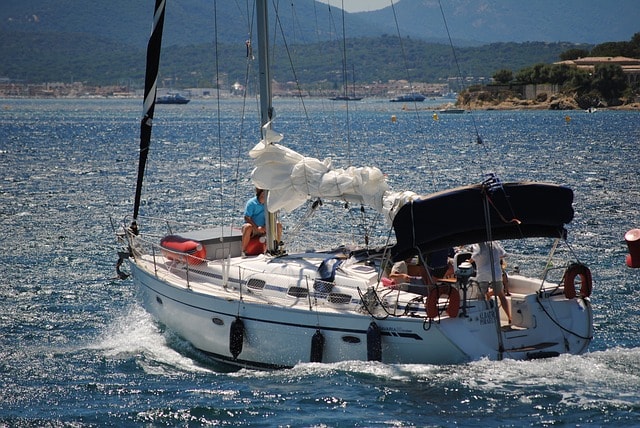
When it comes to sailing trips and holidays, a lot of people appear misinformed that it requires extensive knowledge of oceanic navigation as well as operating a boat.
The comforting truth, on the contrary, is that a sailing trip can be enjoyed by complete novices as much as any sailing pro.
Almost all yacht charter companies these days provide a skippered boat with a crew in addition to regular bareboat charters.
In other words, you can enjoy the freedom of being all by yourself in the serene blue ocean without any stress and responsibility.
In fact, in my early experiences on charter boats, I almost always had professional and experienced skippers in charge of navigation and operation. Even now, I often go on sailing holidays with a skipper on a yacht.
In this article, you can learn all about the benefits of hiring a skippered boat, tips to hire a professional and experienced captain, what you can legitimately expect from the skipper during your sailing trip as well as other relevant information.
Table of Contents
Responsibilities of the Skipper
The primary reason for chartering a skippered boat is to hand over the navigation and operation of the yacht to someone who has the necessary experience and knowledge.
In the case of your skipper, you can expect him to ensure the safe passage of the boat through responsible boat handling and safe seamanship.
In the case of a fully crewed yacht, the responsibilities of the skipper include making sure the crew understand and carry out their roles and duties.
The skipper is expected to maintain proper coordination among the crew.
To sum up, the tasks and responsibilities of a skipper are both technical and interpersonal. Apart from operating the boat and navigating it expertly, he should also ensure that the crew is obeying his command dutifully.
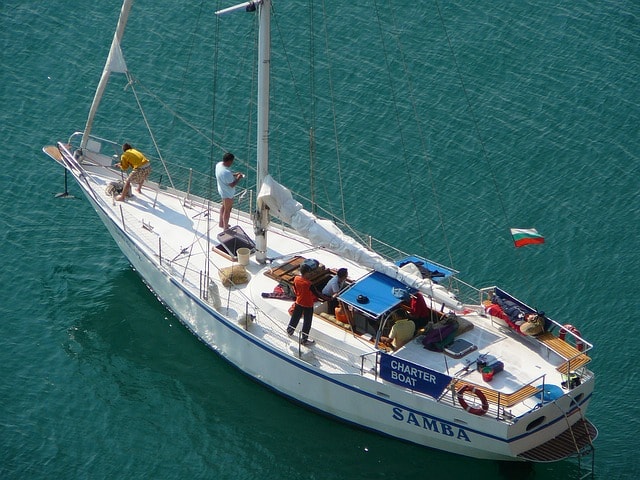
Who Should Choose the Option of a Skippered Yacht?
People with no or little sailing experience would have to choose the services of a professional and experienced skipper to make their trip a success.
Skippered yachts are perfect for those who do not possess a sailor’s license but want to partake in the fun of a sailing holiday.
Also, if you are part of a large group of friends and family, and want to leave the responsibility of sailing to the skipper to enjoy the trip in a stress-free manner, then you should certainly consider a skippered boat.
A skippered boat is also ideal for people who want to sharpen their sailing skill under the watchful eye of an experienced and professional sailor.
Even experienced sailors can benefit from professionally skippered boats if you want to partake in regattas and require that extra bit of help and professional knowledge.
Planning Your Itinerary With the Skipper
One of the best advantages of having a skippered boat comes from the help you would get in planning your sailing itinerary.
The skippers on particular routes have extensive knowledge of the best locations, coves, inlets, and beaches that you and your friends would enjoy during the trip.
They can help you plan the sailing trip in a way that makes it possible for you to see and experience the most during your trip.
Also, skippers are intimately aware of the prevailing weather conditions and may help you tweak your itinerary in such a way that adverse weather does not mar your holiday.
Last, but not the least, skippers know the best and cheapest places to moor the boat so that you do not spend extra at expensive marinas.
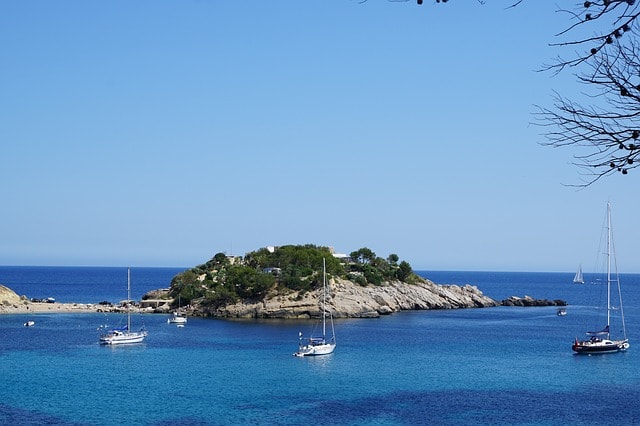
Does the Yacht Charter Price Include in Skipper’s Fees?
Yacht charter companies do not include the fees payable to a skipper when you lease their boats.
The fees commanded by the skipper is typically done at the base office, while the invoice for the same is generated and handed over to you after the completion of the trip.
The yacht charter companies only advertise the cost of hiring their boat, without the crew, complements, and skipper, on their brochures and websites.
Accommodation for Skipper Aboard the Boat
It is required that you reserve one of the cabins for skipper and his crew to rest and sleep in during your sailing trip.
Typically, a lot of boats have a special version for charter companies featuring extra cabins so that more people can be accommodated on the boat.
It is not required that you reserve the stateroom or other luxurious cabins for the crew. Typically, yachts come with a dedicated cabin for crew and feature bunk beds.
Who is Responsible for Skipper’s Meals?
It is customary that skippers be provided meals along with the crew by the chartering party. There is no requirement that the food should be fancy or gourmet quality, and the crew and skipper would typically eat whatever you serve.
During your trip ashore in the middle of your sailing holiday, it is considered nice to take the skipper to restaurants along with you.
However, there is no such requirement or custom, and you may just hand him enough cash for a meal at the local fast food joint.
Do’s and Don’ts for Skipper on Board the Yacht
As mentioned above, the primary role of the skipper on board the boat is to ensure a safe and enjoyable trip for everyone.
This means taking care of the technical aspects of sailing, including the correct deployment of mast and sails, safe moorings, checking the weather conditions, guiding the crew, and advise on the route.
The skipper, however, is not obligated to take the route preferred by you if they deem it dangerous due to any reason, including weather.
Similarly, you should not expect the skipper to perform menial tasks such as cleaning.
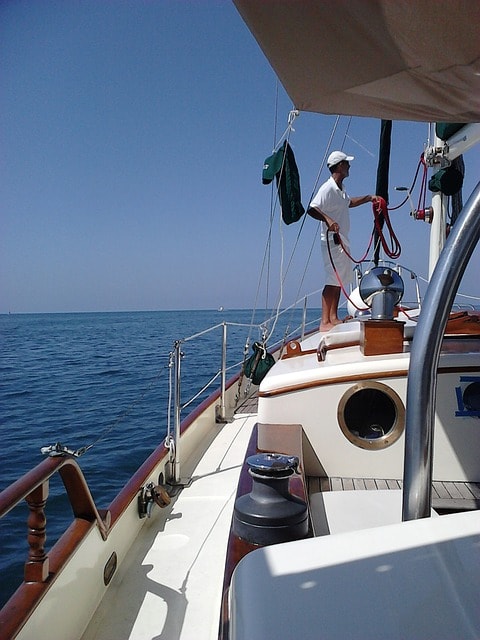
Cost of Hiring a Skipper
The cost of hiring a skipper dependent on some factors including his professional experience, the region you are sailing in, and the sailing season.
On an average, you should expect to pay between Euro 90 to 150 for each day of your sailing trip.
How to Tip the Skipper?
It is customary to tip the skipper at the end of the sailing trip. Typically, the tip works out to 10 percent of his total sailing fee.
However, if you liked his services and recommendations, then you may tip generously. The skipper will certainly appreciate it.
Advantages of Hiring a Skipper
Probably the best part of having a skippered boat is that it allows you to get the most out of your sailing holiday.
- In my personal experience, I have noticed that the presence of a professional and experienced skipper enabled us to plan our itinerary better.
- Many times, the skipper’s intimate knowledge of the local coastline and weather helped us see places that we did not expect and avoid rough weather.
- Skippers know the best places to eat during your trips ashore and have their own local sources to recommend the best places to see and visit.
- Also, you can truly enjoy a stress-free and blissful holiday with your friends and family safe in the knowledge that your boat is in capable hands.
In Conclusion
Skippered boats are probably a perfect way to introduce the joy of sailing holidays to those who have not experienced it before.
Even among those with sufficient sailing experience, there are a lot of benefits to having an experienced skipper in charge of the yacht.
There is no doubt that an experienced sailor would help you get more out of your holiday in every sense of the term. While it may be slightly costlier than bareboat charters, a skippered boat is certainly worth its price.
Need a skipper on your boat? Send your inquiry now, and you’ll receive a free skippered yacht charter quote!
Want to Know More Tips?
Sign up to Cruising Sea newsletter to receive every two weeks the latest post straight to your inbox!
Have you already hired a skipper? If so, what was your experience? Please feel free to share it by leaving a comment just below, I’ll be glad to hear your feedback:)

Daniella has been passionate about travel, the sea, and nature for many years. As a child, she frequently traveled throughout the Mediterranean and continued with her journeys throughout her adult life.
Her experiences have created the desire within her to share her love for traveling with other passionate and adventurers who want to discover beautiful horizons and new cultures.
7 thoughts on “Skipper on a Yacht – The Ultimate Guide”
Hi Daniella,
I just found out that I can charter a yacht with a skipper commandeering it. I was reluctant to go to the sea because I thought I have to go to a “sea” school first.
Especially, when you watch all the Hollywood movies that portray you can go on a cruise without a skipper. And then comes the storm. YUCK!
Now I can safely plan my trip with the skipper’s help. Thank you for bringing this to my attention and corrected my misinformation.
No problem. it’s a pleasure for me to inform the readers, this is the purpose of the website:)
I am happy that the misinformation has been cleared up! And, indeed, you can plan in complete tranquility your next trip with the help of a skipper, believe me, it is worth it:)
Thank you for the comment and wish you a nice day!
Thanks for the information on skippers on a yacht. I have never been on a yacht before and know very little about them except what they look like and are used for! So i enjoyed learning about the skipper as never actually heard that term before. It’s something that i would love to do one day, And the pictures make it seem like it is an amazing experience to have. Maybe one day!
Having a skipper on board is something fabulous:) You don’t need to worry about the navigation at all. They also know the environment well so you can count on him to bring you to best places as well:) Isn’t great?
Thank you for the comment and wish you a wonderful day!
Thank you for visiting my website and for the comment:) To answer your question, most charter companies offer to the client the option to hire a skipper for their sailing holiday. Skippers are not included in the price as they work independently and the cost per day will vary between 120 to 150 Euro, some, even more, depending on the skipper skill. If you own a yacht and you wish to hire a skipper, you can find one at “ Delivery Captain ” I hope it helped and if you need more information, feel free to contact me at any time, I’ll be more than happy to assist!
Have a wonderful day!
I really like your comment about how an experienced sailor would help you get more out of a holiday than sailing on your own. I imagine it would also be a good idea to work with a skipper if you plan to buy your own yacht as well, even if you plan on learning to sail (someone has to teach you, after all). I imagine that a skipper would have a lot of good information about different services as well, like yacht delivery if you plan to move for example.
I am glad you like the comment, thank you for the kind feedback:) Oh, yes, definitely, a skipper will not just navigate the boat, but he will also teach you a lot of things and will bring you to places you don’t know. A skipper is someone you can rely on!
Thank you again for the comment and wish you a wonderful day!
Leave a Comment Cancel reply
By using this form you agree with the storage and handling of your data by this website. *
Position: Event
Are you an experienced and confident sailor? Someone who’s not afraid to step up and take the wheel? Do you love travelling and getting to meet people from all over the world? Are you enthusiastic and social? Most of all, are you up for an adventure?
If yes to all the above, you should be working as a skipper for Yacht Week!
For prerequisites and more information check quarterdeck.co , our in-house training academy to learn how you can apply to skipper academy.
Excited and ready to go?
Subscribe to our mailing list
We promise not to spam you

- Course Checklist
- Important Information
- How to Get to Us
- Our Instructors
How to Become a Yacht Week Skipper
Possibly the best job in sailing.
Here at Sailing Virgins, we are often asked about what it takes to become a skipper for The Yacht Week. We should know: all instructors at Sailing Virgins are current or former skippers and/or instructors with The Yacht Week, so we thought we would share some tips. This post introduces The Yacht Week, the Skipper Academy, and gives you the nine steps to make a Yacht Week Skipper. For a free infographic, click here .
What Is The Yacht Week?
If you are reading this you are probably already aware of The Yacht Week. If not, watch their trailer below. In short, the Yacht Week is a global phenomenon, where people - mostly in their 20s and 30s - become part of sailing events which are staged in six destinations around the world.
If you are into meeting some great people, enjoy partying and like the sound of sailing around the Mediterranean during summer (or any one of half a dozen other locations), check them out.
The Yacht Week Skipper
All Yacht Week skippers must have their RYA Yachtmaster certificate or equivalent. However, the Yachtmaster certificate is only the beginning concerning the Skipper Academy.
For qualifications, the Quarterdeck literature states a Yachtmaster Coastal level is required as a minimum, however, we recommend a Yachtmaster Offshore level, as this will increase your chances of being selected for the Academy and passing.
Besides, the additional miles and experience can come in very handy during a 40 knot squall at 7am when you are effectively single-handing.
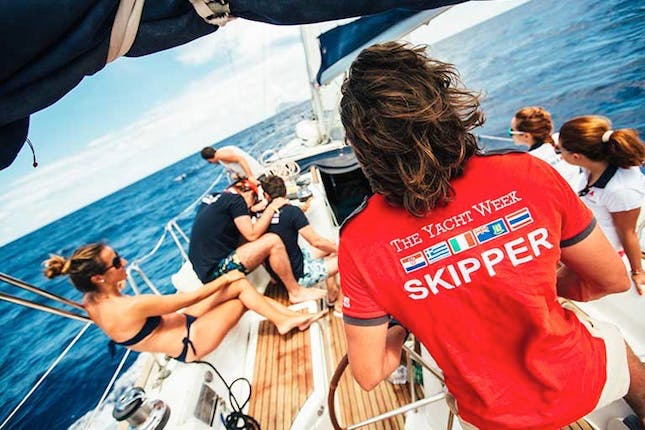
The coveted Yacht Week Skipper polo.
The Quarterdeck Skipper Academy
The Skipper Academy itself is run by Quarterdeck . Quarterdeck is a company related to, but separate from, The Yacht Week. Quarterdeck exists to train skippers in the advanced flotilla methods required by The Yacht Week and other sailing events companies.
The Skipper Academy is a 7-10 day course (current iterations have it at 8 days) covering principally how to deal with paying crews, familiarisation with the sailing routes and how to raft in their various configurations (such as line rafts, tunnel rafts, perfecting med mooring among other skills).
The Skipper Academy itself is widely acknowledged by participants to be one of the best weeks of their lives. It is tough. In any given course the pass rate is around 70-80%. Successful candidates are then invited to work in one of The Yacht Week’s locations, usually starting with Croatia.
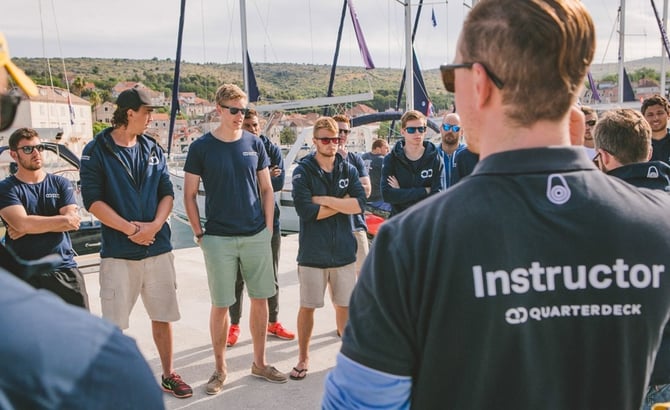
Making Yacht Week Skipper In Nine Steps
There are many routes you can take to become a skipper for The Yacht Week. The nine steps below will help you to become not just a skipper for The Yacht Week, but a confident one at that.
1. Basic sailing experience
Budget: $0 - $500
Classic Sailing Virgins Education
Either through sailing with a friend, joining a local community sailing club or a university sailing club. Weekend races, beginner sailing courses, anything that gets you time on the water and on the winches.
Any time spent on a boat is beneficial here, whether it is on a sailing vacation (The Yacht Week included) or just on a lake near your home, on a dinghy. The more time spent here, the merrier.
2. Sailing Theory

This is usually classroom-based learning such as NauticEd Bareboat Charter Master, ASA 103/4, RYA Day Skipper, or online versions of this such as NauticEd.
During this course, you will be introduced to the fundamentals of navigation, weather and boat systems.
The cost of this is in cluded in some intermediate courses such as those offered by Sailing Virgins, and costs $250 - $500 if undertaken separately.

3. Intermediate Sailing Course
Budget: $2,500 - $3,000
This is a 1-2 week duration, live-aboard sailing course where your instructor will impart to you the skills necessary to sail your own boat. Depending on the course you choose, this will count for your miles and variety of experience.
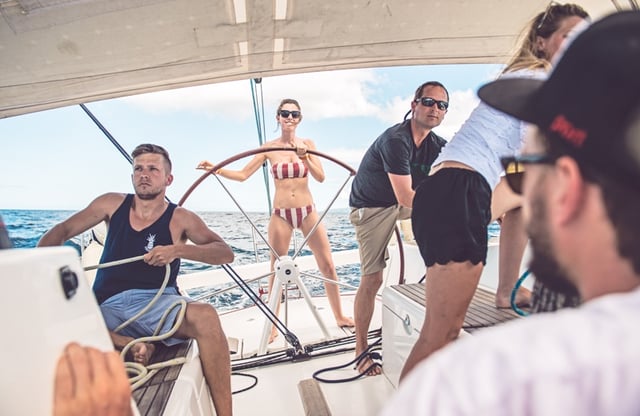
Some intermediate courses (such as the Sailing Virgins Island Adventure Course) will include extras like night passages and sailing between countries.
Sailing Virgins courses are designed for people in their 20s and 30s - Sailing Virgins is the only sailing school in the world to offer this. This makes the week much more social, athletic, and prepares you for some of the techniques assessed during The Skipper Academy.
4. Purchase Sailing Gear
Budget: $1,000 - $2,500

Image thanks Zhik
At this stage, you may look to purchase your own foulweather gear, deckvest, and Personal Locator Beacon. Ideally, you want to be self-reliant, as given you will be sailing on other people’s boats and across oceans, you cannot always vouch that their methods or equipment are up to speed.
You ultimately need to trust your gut before embarking on any long journey. We have known sailors to refuse getting on a boat due to either issues with the skipper or the boat itself. Regardless of boat or skipper issues, when you are on a night watch and it is blowing 40 knots in the middle of an ocean, it is a good feeling to know you have decent equipment.
If you'd like some pointers on what gear to buy, we wrote a blog post on 10 Items Every Skipper Should Own and also 8 Apps Every Sailor Should Have .
When you take your Intermediate Sailing Course with Sailing Virgins, you will receive alumni discounts of up to $1,000 on co-branded Sailing Virgins / Zhik sailing equipment. Zhik is said to produce some of the best performance equipment in sailing, and makes gear for the biggest sailing events such as America's Cup, Volvo Ocean Race, and Olympic Games/World Cup. hbspt.cta._relativeUrls=true;hbspt.cta.load(1817063, '10322372-0bdc-48b3-8c28-fd4040049937', {"useNewLoader":"true","region":"na1"});
5. Log Sea Miles
Budget: $500 - $3,000
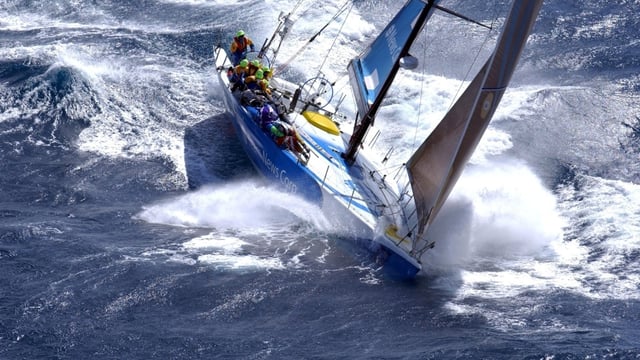
Cross an ocean or two, sign up for deliveries, the aim is to attain skills through diverse experience. You will sail with fantastic sailors, and possibly terrible ones. The variety is all part of it.
In other words, learning what not to do is as valuable as learning what to do during this stage. When you cross an ocean there is a good chance you will have a variety of conditions, and will be on watches including, as a matter of course, night sailing.
Your aim is to log at least 2,500 miles, with at least four distinct major journeys, sailing with several different skippers, in a variety of areas, sampling a variety of experiences. Here are some ideas on how you can build your sea miles.
If you do your Intermediate Sailing Course with Sailing Virgins, we will share tips with you on how to find the longer passages, what to look out for and how to approach such an adventure. Every January Sailing Virgins also sponsors an alumni “ex-Virgins” sailing week, where students are invited to return to the Caribbbean for a low cost week of sailing and adventure.
6. VHF, First Aid Courses
Budget: $150 - $300
These are prerequisites for the Yachtmaster O shore course. One tip is to organise this when you book your Yachtmaster course (see below). Some of it can be done online. Many training centres (such as the Hamble School of Yachting , who we can vouch for) o ffer these courses as well as the RYA Yachtmaster Offshore preparation course (as described below)
7. RYA Yachtmaster Offshore course
Budget: $1,000 - $3,000
This is a week-long course where you will do five days of “preparation”, followed by two days of examination, carried out by an independent examiner.
The separation of preparer and examiner, the reputation of the non-profit Royal Yachting Association, and the fact that the Yachtmaster scheme was invented by the RYA, mean heading to Southampton (aka “Yachtmaster mecca”) is a valuable part of the process.
For most sailors, whether from Australia, New Zealand, South Africa, Europe or the US, sailing is a great sport. For the British, sailing saved their nation on more than one occasion.
Consequently the British have a reverence for sailing that does not really exist in any other culture we are aware of. It is nice to experience this as part of your journey to becoming a professional skipper. Blue skies and warm waters it isn’t, but well-honed sail training location with a variety of tidal and traffic experiences, it is.
We recommend Hamble School of Sailing as our favourite in southern England.
Budget: $500 - $1,500

Short for “Standards of Training, Certification and Watchkeeping”, more commonly known as Commercial Endorsement, the STCW is a series of five mini-courses that allows you to work in the industry.
While not mandatory to become a Yacht Week skipper, it will be looked upon favourably when you apply to the Skipper Academy. Plus, STCW-qualified skippers will normally earn a weekly "bonus" for this qualification.
And particularly with the surprisingly realistic firefighting and sea rescue components (among a couple of admittedly boring subjects thrown in) it is a worthwhile learning experience in its own right.
The STCW series of courses can be done in a variety of places, including the UK, USA, Australia and for a low-cost option, the Philippines.
9. Quarterdeck Skipper Academy
Budget: $0 - $1,000
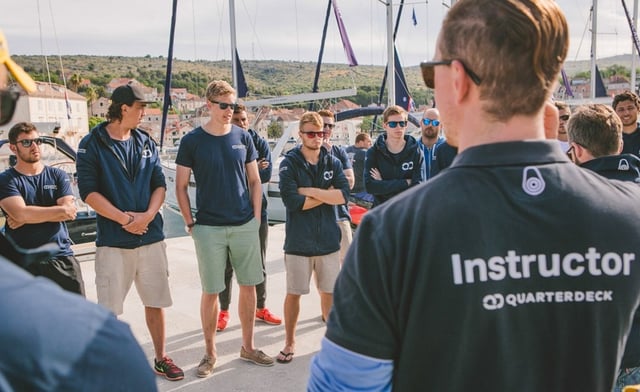
Image thanks Quarterdeck
With the steps outlined above ticked off , you are in a good position to apply for the Quarterdeck Skipper Academy. You may not be accepted to the academy, and even if you are, you may not pass, so a positive outcome to this step is by no means a certainty.
Conducting your Intermediate Sailing Course with Sailing Virgins will give you a much better idea of what Quarterdeck looks for in its candidates and how to optimise your chances of being accepted and passing the Skipper Academy.
How long does it take?
The fastest I have seen the process successfully take was someone dedicating six months of their life to sailing, including sailing in the Mediterranean, an ocean crossing, sailing with instructors for multiple weeks in the Caribbean, then heading to the UK to do their Yachtmaster.
This individual, an athletic, fast learner and already familiar with mechanical systems, later told me that six months felt hellishly fast for what he had achieved.
A normal process for someone taking weeks where they can, is around two years. There is no effective short-cut to this: people who try to override the natural learning curve end up losing confidence at precisely the wrong time.
Should Intermediate Courses be RYA, ASA, IYT, or NauticEd?
Below Yachtmaster Offshore, it really doesn't matter which syllabus you choose. We have written another blog post discussing this in further detail. In short, until you get to Yachtmaster Offshore (which is RYA), concentrate on the testimonials of the sailing school, and in particular what the instructors are like. Here is a blog post giving more detail on choosing a sailing school in the BVI.
What about Zero to Hero?
Some schools offer courses that start with the most basic sailing course, and provide the student with the miles and expertise to pass the yachtmaster exams in one go. These “zero to hero” courses can take between 8-12 weeks, and cost from $6K - $14K. That is, around the same cost as the steps described above if you were to do them individually.
The advantage of such a course is that it is more or less a guarantee that a Yachtmaster certificate will be attained.
However, such courses are looked upon with skepticism in the sailing community, and in the Yacht Week in particular. They tend to provide a “monocultural” experience, without the rich learning that comes through the longer, more peripatetic journey described above.

Becoming a Yacht Week skipper is a great thing to do. As well as being one of the best jobs on the water, the people you meet and the experience you gain whilst being a part of this organisation can set you up for years into the future.
The path described above, with nine steps to achieving Yachtweek Skipper status, is more than the bare minimum, for a reason: you want to be confident in your sailing before you are paid to do it.
Confidence comes with milage and variety. A mix of sailing in your local area, the Caribbean and the UK, decent instruction, plus at least one long journey such as an ocean crossing, should set you up for success.
Sailing Virgins is a Caribbean-based sailing academy for people in their 20s and 30s who wish to level up their sailing game. Check out our Intermediate Sailing Courses and our Island Adventures , both of which can gain you a sailing qualification that is an essential part of your path to becoming a Yacht Week skipper.
Please post any thoughts or questions in the comments below. Enjoy the journey.
Related posts
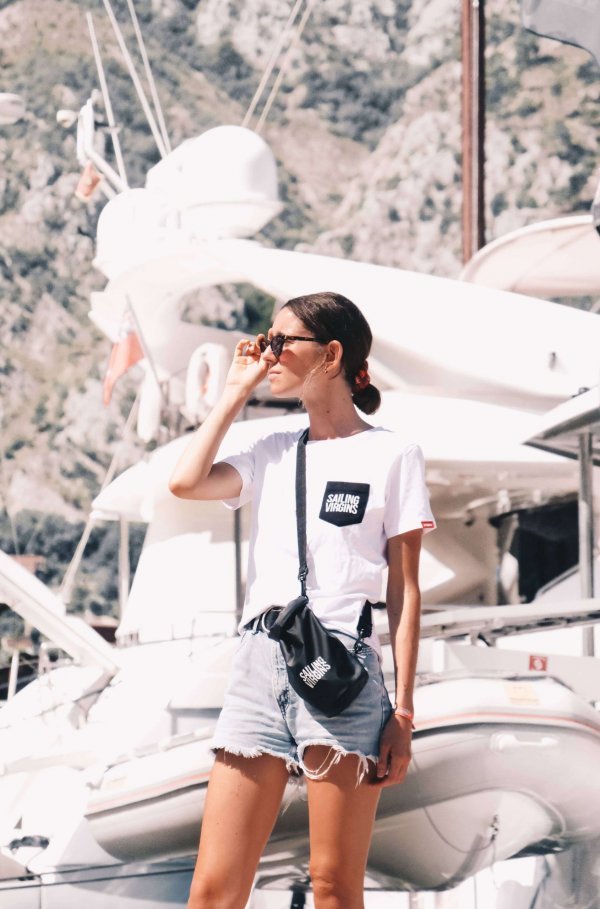
Essential Gear for Your First Sailing Adventure (2023)
Embarking on your first sailing adventure: must-have gear and essential tips.
If the call of the...
How to Pick Up a Mooring Ball
Picking up mooring balls is a key sailing skill. here's how to do it well. .
Picking up a mooring...
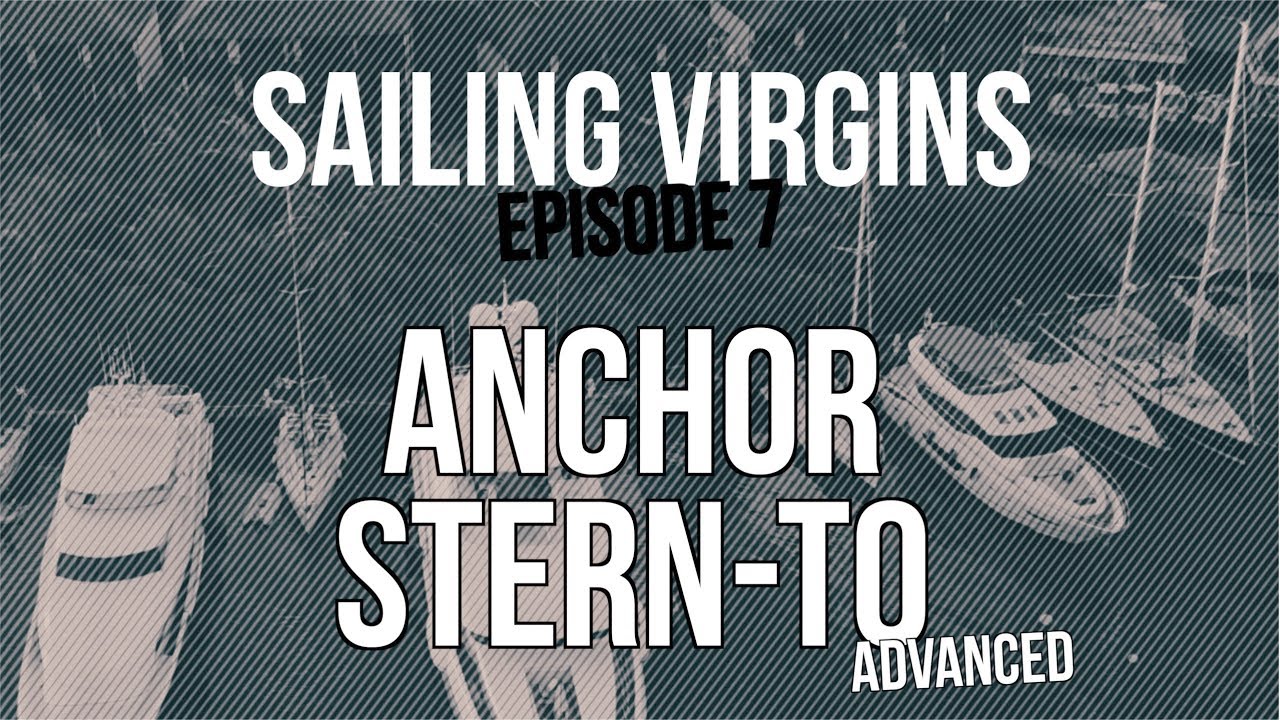
How To Anchor Stern-To (Video)
Anchoring stern-to can be daunting. here's how we do it..
Knowing how to anchor stern-to is critical...
Recent Posts
- August 2016 (11)
- May 2023 (11)
- April 2023 (10)
- September 2016 (8)
- November 2016 (5)
- June 2016 (3)
- July 2017 (3)
- March 2018 (3)
- November 2018 (3)
- June 2019 (3)
- June 2023 (3)
- October 2016 (2)
- January 2017 (2)
- February 2017 (2)
- May 2017 (2)
- August 2017 (2)
- October 2017 (2)
- February 2018 (2)
- December 2018 (2)
- June 2022 (2)
- July 2022 (2)
- November 2015 (1)
- April 2016 (1)
- May 2016 (1)
- December 2016 (1)
- April 2017 (1)
- September 2017 (1)
- November 2017 (1)
- December 2017 (1)
- January 2018 (1)
- April 2018 (1)
- July 2018 (1)
- September 2018 (1)
- January 2019 (1)
- July 2019 (1)
- September 2019 (1)
- January 2020 (1)
- March 2020 (1)
- April 2020 (1)
- May 2020 (1)
- June 2020 (1)
- April 2021 (1)
- August 2022 (1)
- October 2022 (1)
- December 2022 (1)
- July 2023 (1)
- August 2023 (1)
- January 2024 (1)
- how to (21)
- sailing (14)
- Sailing Tips (12)
- corporate (9)
- sailing course (7)
- General (6)
- Insider (6)
- professional development (6)
- vacation (6)
- Mindfulness (5)
- leadership (5)
- Performance (4)
- group travel (4)
- opinion (4)
- opinions (4)
- qualifications (4)
- Interview (3)
- Trip Notes (3)
- Uncategorized (3)
- adventure (3)
- sailing virgins (3)
- Instructor Course (2)
- Self-Care (2)
- catamarans vs monohulls (2)
- charter boat (2)
- island adventure (2)
- networking (2)
- preparation (2)
- sailing guide (2)
- youtube (2)
- Athlete (1)
- Beginner (1)
- City Guides (1)
- Failure (1)
- First Time (1)
- Maderia (1)
- check out (1)
- fishing (1)
- french polynesia (1)
- gear tips (1)
- golf vs sailing (1)
- safety brief yacht (1)
- the yacht week (1)
- trip review (1)
The founders of Sailing Virgins started things as a result of having some incredible sailing seasons in the Mediterranean and Caribbean working for sailing company The Yacht Week. James then worked for and for a while managed Tortola Sailing School. In 2016 he branched off and started Sailing Virgins. We LOVE how sailing is changing. Top speeds in the America’s Cup were thirteen knots not so long ago. Now they’re 45 knots. If you’re excited by that, we’re with you. Giddy up!
- Village Cay Wickhams Cay 1 Road Town VG VG1110, Road Town, British Virgin Islands
- +1 (284) 442-2288
- [email protected]
© LOVE SAILING VIRGINS 2016-2019
- Terms & Conditions
- Privacy Policy
- Fraud Policy Statement
- Affiliate Program

Boat Rental With a Skipper: Why You Need One to Have Your Dream Vacation!
Need a holiday? Get a free and personalised offer from us!
If you’re thinking about going on a sailing holiday, first of all, great idea! You will love it. Secondly, you’re going to want to have a boat rental with a skipper , especially if you’re new to sailing.
“What’s a skipper?” you might ask. Here’s a quick definition: A skipper is a person who commands a boat — the captain, if you like. They’re the ones responsible for the operation and navigation of the boat, as well as the comfort and safety of those on board.
While the term “skipper” might look very precise in terms of its definition, it looks much more extensive (and impressive) when taking a closer look.
Table of Contents

What does a skipper do?
The skipper on a chartered yacht will have the skills, training , experience , and license required to legally and safely captain the boat (or flotilla, in the case of a group sailing holiday ). In that capacity, here’s a look at what a skipper does:
- Keeping everyone safe: The skipper makes sure everyone on board knows and adheres to safety protocols, starting from when you check in at the marina ; they’ll also know what to do in situations like storms.
- Planning the passage to the destinations: Understanding the currents and staying on top of weather predictions help the skipper choose the best time and course for sailing from one destination to another.
- Mooring and casting off: The skipper guides the boat smoothly into and out of marinas, securing it for the night and freeing it in the morning.
- Navigating the boat: From working a chart plotter to determining the wind direction, adjusting the boat’s heading, and trimming the sails, a lot of expertise goes into making a boat go where you want it to go.
- Ensuring maritime laws and local regulations are followed: You don’t want to ruin your sailing holiday with a fine — especially if you had no idea you were breaking any rules.
- Operating the equipment: Today’s boats come rigged with advanced safety and navigational equipment, plus the basics like the engine and water tank (and of course, the bells and whistles that make for a great experience); the skipper knows how to properly use and maintain every part and devise.
- Recommending local spots to visit: A skipper can let you in on local secrets about the best restaurants, the most secluded beaches, and any unique spots to visit off the beaten path.

Why You Should Go For a Boat Rental With a Skipper and How to Book One
Sailing with a skipper is pretty much the only way to take a boat holiday if you don’t have a boating license yourself.
To book a skipper on your boat holiday on Zizoo, tick the “I need a skipper” box when you’re entering your dates, destination, and number of guests. (Just remember: The number of guests on your trip must include the skipper!)
Why You Should Charter a Yacht With a Skipper in Croatia
Chartering a yacht with a skipper in Croatia can transform your sailing experience into a seamless and enjoyable adventure. Croatia’s coastline is renowned for its stunning beauty and numerous islands, but navigating its waters can be complex due to varying wind patterns, hidden coves, and local regulations.
Hiring a skipper not only enhances safety but also offers a wealth of benefits. These experienced captains possess an intimate knowledge of the region, ensuring you’ll explore hidden gems and picturesque anchorages that may be overlooked otherwise. They also provide peace of mind, allowing you to relax and relish the journey while they handle navigation, mooring, and any unexpected situations.
Whether you’re a seasoned sailor looking to unwind or a novice seeking an expert’s guidance, chartering a yacht with a skipper in Croatia offers a stress-free, enriching, and unforgettable sailing experience along the Adriatic coast .
A Skipper Yacht Charter in Greece
Opting for a skipper yacht charter in Greece opens up a world of possibilities for an unforgettable sailing vacation. Greece’s vast archipelago and intricate coastlines can be a delight to explore, but they also present challenges even to experienced sailors. That’s where a skipper comes in. These seasoned professionals not only ensure your safety but also enrich your journey. With their local knowledge, they can guide you to hidden coves, authentic Greek tavernas, and ancient ruins that may elude other travelers.
Whether you’re a skilled sailor or new to yachting, a skipper yacht charter in Greece allows you to relax, soak in the breathtaking landscapes, and dive into the rich culture and history of this Mediterranean paradise, all while an expert takes care of the navigation and logistics.
How Do You Become a Skipper?
Being a skipper is a rewarding job — especially if you love sailing. Of course, becoming a skipper requires experience as well as serious training and certain certifications.
A commercially endorsed skipper will need to not only complete an official skipper or Yachtmaster course, they’ll also need to have additional qualifications such as courses in survival techniques and first aid.
It’s simpler to obtain a boating license , which would enable you to go sailing without a skipper. In that case, your state or country determines what’s required, but generally you’d need to take a course, pass a test, and pay a fee.
Meet our professional Zizoo Skippers
Final thought: sailing with a skipper makes for a wonderful boat holiday.
While having a stranger along on your vacation with your family or friends may sound awkward, it doesn’t have to be! The skipper is there to keep you safe and make sure you have an incredible experience.
The Best Places for Sailing in the US: 8 Amazing Holiday Destinations
Buchen sie ihr boot mit skipper – dürfen wir vorstellen: filip.
Destinations
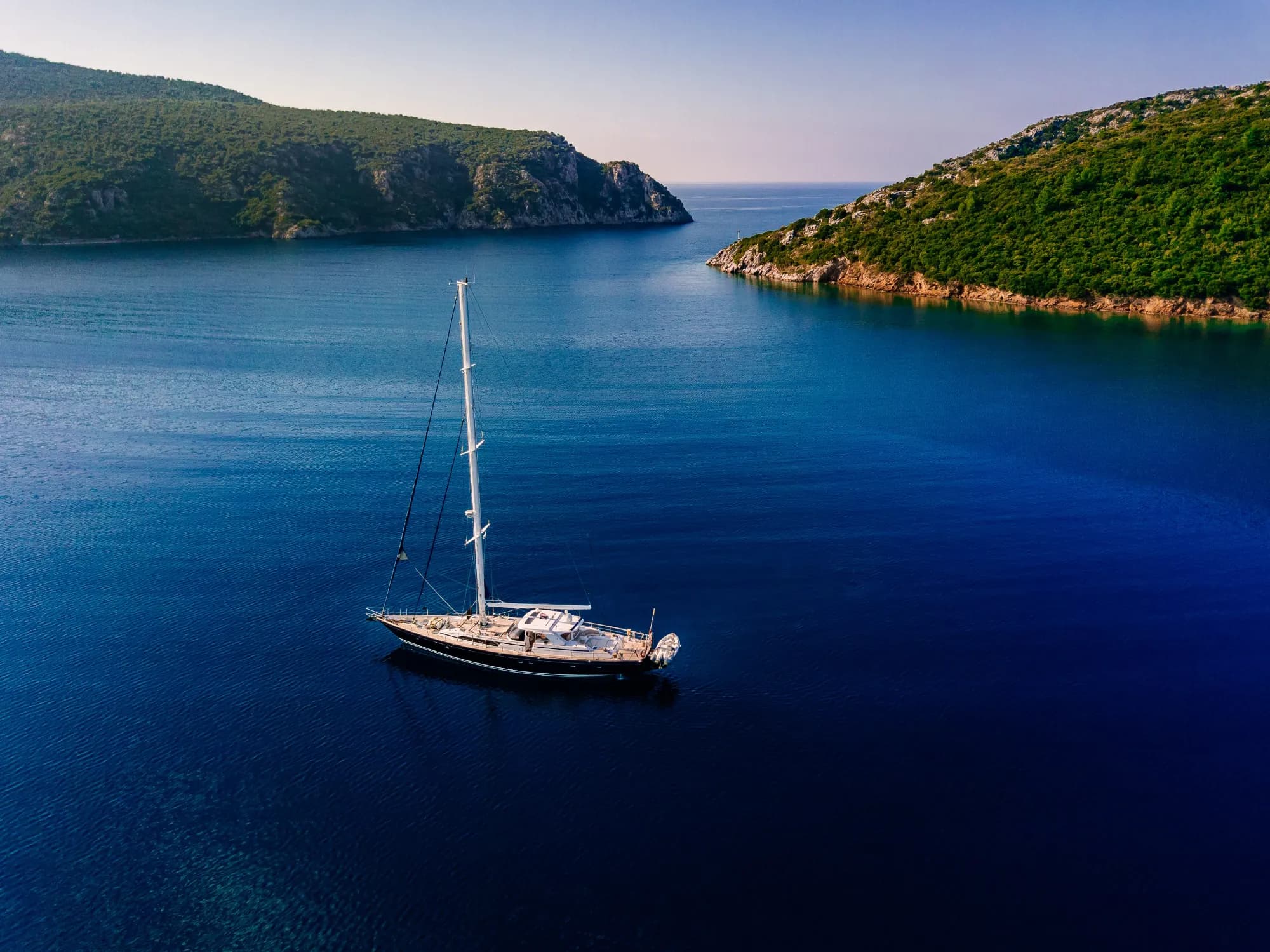
Yacht & Skipper Luxury Sailing Week
Make memories that last a lifetime aboard our luxury, week-long skippered sailing holidays in Croatia, Greece & Montenegro.
Destination
Why to choose us
It’s time to sit back, relax and sail. We handle all the details so that you can focus on enjoying your crew’s company and soaking up the sun and sea.
Fully-skippered yacht
7-nights aboard your private Catamaran or Monohull with your very own skipper.
Stress-free holiday
Our experts plan everything so you can just show up ready to have fun.
Tailored services
Adjust your route, hire a nanny or chef, and choose your own food package.
Memorable destinations
Sail and explore the Mediterranean’s best islands with our tailored itineraries.
Explore Our Routes
For one week, one of our yachts becomes your home away from home. Your skipper will sail you between islands and secret coves while you sit back relax and enjoy

1 Itinerary
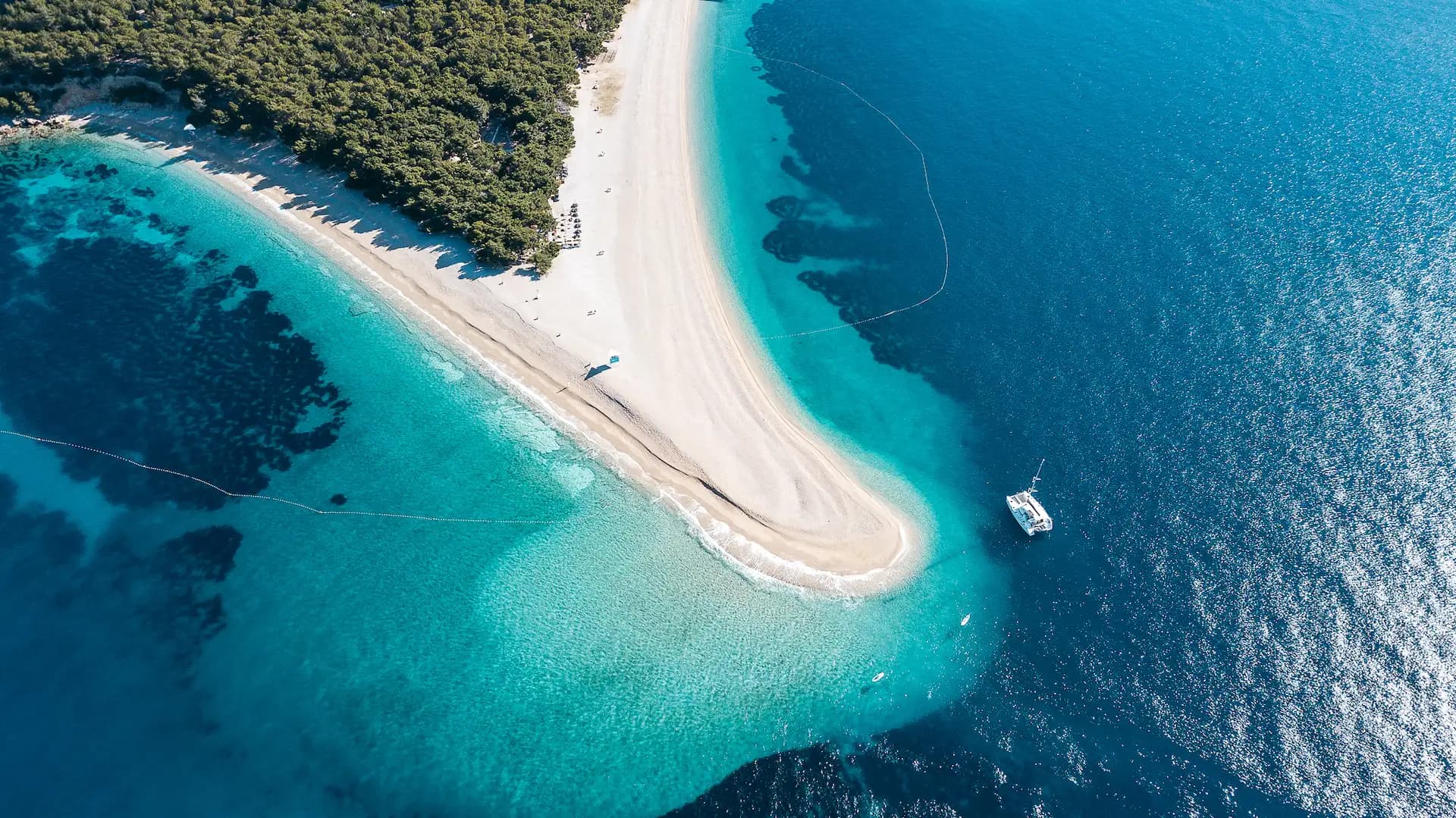
Choose the perfect boat for your crew
We have reserved the best, newest yachts from our fleet for your trip. Whether you choose the thrill of a sporty Monohull or the luxury of a Catamaran, your yacht is sure to be the perfect backdrop for your week at sea.
Monohulls - classic, nimble yachts decked-out in comfort
Catamaran - spacious, luxurious yachts for those who like to travel in style
We are responsible for the best week of your life
Our team, back office, skippers and guest managers are locals, all in love with their countries. The entire team has knowledge that allows them to provide a unique experience.

Vincent Radonic
Director & Founder
I want people to feel like they have never before when taking a vacation.

Ante Zivkovic
My mission is to provide services of superior quality and value that improve the way people view sailing holidays.

Sandra Krstulovic
Head Booking Manager
I am dedicated to providing the highest quality of Customer Service delivered with a sense of warmth and friendliness.
From our Social

Get in touch
Work hours ( Sydney Time )
Monday-Friday: 6am - 4am
Saturday: 6pm - 11pm
Sunday: Closed
Work hours ( Perth Time )
Monday-Friday: 3pm - 1am
Saturday: 3pm - 8pm
Member 5491
We have provided financial bonds which guarantee that your money is totally safe with SailWeek Ltd.
Sustainable tourism
SailWeek believes in sustainable tourism. Our mission is to keep positive impact on the environment, society and traditional way of life. During our sails we use eco-friendly products and try to do minimum impact to the marine wildlife. We live from the sea. Let’s give something back!
Copyright © 2022 SailWeek Ltd. Travel advice from www.gov.uk/foreign-travel-advice
Yacht Skipper
- Skipper Sailing
- Sailing Yacht
Yachts | Skipper Yacht Skipper

Skippers for Sailing Yachts
Check Availability and Book your Yacht Skipper
for Yachts up to 24 meters, 78 feet, 12 Passengers.
One passenger must obtain a valid sailing license.

Photography
Enjoy your holidays and
capture the moment.
Yacht skipper and our
photographyes.com services.

Rent a Yacht
Rent a Yacht within Greece.
Sailing for a week to the Greek Islands.
Groups of 4 up to 10.
Don't forget to check our
Skippers for Sailing Yachts service
if you don't have a sailing certificate.

Buy or Sell a Yacht
Buy or Sell a Yacht within Greece.
Yacht skipper and photographyes.com
services for next or ex yacht.
Click here for a Selection of Sailing Yacht Companies
and our soon to come Selection of New & Used Yachts

Sailing Transportations
Transfer your sailing yacht within Greece.
Yacht skippers transfer your sailing yacht.

Yacht Maintenance
Refit your Yacht within Greece.
Yacht skipper and our partners
refit your yacht.
The Projects that we Support
https://theplastiki.com/#pledge
BEAT PLASTIC POLLUTION DAY
https://beatplasticpollutionday.org/
Copyright © 2022
YACHTS SKIPPER SINGLE MEMBER P.C.
https://www.hcg.gr/en/
https://mintour.gov.gr/en/archiki-english/
https://europa.eu/
https://www.un.org/
https://www.who.int/
- Company/ Privacy Policy
Αυτός ο ιστότοπος χρησιμοποιεί cookies.
Χρησιμοποιούμε cookies για να αναλύουμε την κυκλοφορία δεδομένων στον ιστότοπο και να βελτιστοποιούμε την εμπειρία σας στον ιστότοπο. Αν αποδεχτείτε τη χρήση των cookies εκ μέρους μας, τα δεδομένα σας θα χρησιμοποιηθούν σε συγκεντρωτική μορφή μαζί με τα δεδομένα άλλων χρηστών. Πολιτική Απορρήτου
https://ec.europa.eu/info/cookies_en
Recommended
Ny skipper cole brauer overcame broken ribs, deteriorating boat to become first us woman to sail solo around the world.
- View Author Archive
- Email the Author
- Follow on Twitter
- Get author RSS feed
Contact The Author
Thanks for contacting us. We've received your submission.
She sailed her way into the history books.
A 29-year-old skipper from New York has become the first US woman to sail solo around the world.
Cole Brauer, from Long Island, tearfully reunited with her family in A Coruña, Spain, on Thursday after a gruelling 30,000-mile journey that took 130 days.
The 5-foot-2 trailblazer placed second out of 16 in the daring Global Solo Challenge, which kicked off in October off the coast of the port city, located in northwestern Spain.
“I can’t believe it guys. I sailed around the world,” Brauer said as she approached the finish line in an Instagram live video. “That’s crazy. That’s absolutely crazy. This is awesome. Let’s just do it again. Let’s keep going!”
She was the only woman in the event and also the youngest competitor. She sailed into A Coruña to a cheering crowd just a day before International Women’s Day on March 8.

“It would be amazing if there was just one girl that saw me and said, ‘Oh, I can do that too,’” Brauer told NBC of her history-making effort. More than half of the other competitors has dropped out as of Thursday.
Brauer’s sailing profile on Global Solo Challenge’s website said her goal has always been to be “the First American Woman to Race Around the World.”
“With this goal, I hope to show that this very male-dominated sport and community can become more open and less ‘traditional,'” it reads.
The East Hampton native didn’t even take up sailing until she decamped to the University of Hawai’i for college in 2014, her profile explained.

“I grew up on a nature preserve, wandering through the tall grass of the creek and playing in the mud watching the tide come in,” she said of her childhood in Suffolk County.
“When I moved to Hawaii for university, all I wanted was to get out on the water. Feel at home. Accessing the sailing community in Hawaii was the logical step,” she added.
Brauer turned pro after college, and started seriously chasing the idea of a round-the-world race after her mentor, Tim Fetsch, sent her a book by record-setting female skipper Dame Ellen MacArthur.
By the time she set sail on her global adventure on Oct. 29, Brauer was already a record-setter: Last summer, she became the first woman to win the Bermuda One-Two race, the Providence Journal reported at the time.

Brauer documented the treacherous Global Solo Challenge for her 459,000 Instagram followers from aboard her beloved 40-foot monohull racing boat, First Light.
Like her pint-sized, 100-pound owner, First Light has a quicksilver edge – and is only large enough to typically hold a one- or two-person crew.
The race path took Brauer down the western coast of Africa before she sailed into the Southern Ocean in early December, where she’d cement second place in the challenge.
She often showed fans her peaceful mornings and on-board workout sessions in the Atlantic Ocean.
“Cole wants to prove you can go around the world and watch Netflix every once in a while, and wear your pajamas,” her media manager, Lydia Mullan, told the New York Times of the realistic look at boat life.

“As for her mental health, she’s really creating a space in her routine for herself, to create that joy she hasn’t seen in other sailors,” Mullan added.
But even Brauer’s tenacious outlook at times gave way for the hardships of living at sea.
In December, she suffered a rib injury when she was violently thrown across her boat because of broaching — when a boat unintentionally changes direction toward the wind — in the rough waters near Africa.
Despite the injury, Brauer said she had no other choice but to power through the pain and keep sailing.
“There’s no option at that point. You’re so far away from land that there’s no one who can rescue you or come and grab you,” she told the “Today” show Thursday. “You kind of just need to keep moving along and keep doing everything.”
Brauer’s grit during the journey recalled her time in Hawaii, when she borrowed from her background as a varsity soccer player, track and field runner, and cheerleader to thrive on the UH team — all while juggling her studies in nutrition science and a full-time job.
“It’s more strategy than anything,” she told the Honolulu Star-Advertiser in May 2016, when she captained the four-time national championship-qualifying team.
Brauer told NBC on Sunday that solo sailors “have to be able to do everything.”
“You have to be able to get up even when you’re so exhausted and you have to be able to fix everything on the boat.”

She reached the Pacific Ocean on December 29 and traveled past the southernmost point of South America and back into the Atlantic on January 27.
As she missed the holidays back home, Brauer decorated First Light with decorations fit for the occasion — pumpkins and ghosts for Halloween, a small felt Christmas tree, and broke out a dress and champagne for New Year’s Day.
Brauer also told the outlet that she started to feel the boat “deteriorating” and “starting to break down” as she made her final push through the Atlantic.
She then deliberately slowed her arrival time near the finish line to coordinate with the “first light” — when light is first seen in the morning — in honor of her boat’s namesake.
“I’m glad that out of all times, I’m coming in at first light,” Brauer said. “It’s only necessary.”
As she crossed the finish line, Brauer held two flares above her head to signal an end to her over four-month-long campaign.
“Amazing finish!!!! So stoked! Thank you to everyone that came together and made this process possible,” she wrote on Instagram.
Following her second-place finish, Brauer received a fresh cappuccino and croissant, the breakfast she had been craving for months while at sea, she said.
French skipper Philippe Delamare, who started the race a month before Brauer, won the Global Solo Challenge on Feb. 24. Start dates were staggered based on performance characteristics.
A highlight of Brauer’s return to dry land will be reuniting with her mom, dad, and younger sister.
“They think I’m nuts,” Brauer told the Providence Journal of her parents’ response to her big sailing dream.
“I think that they’re much more proud of me now, especially because they’re starting to realize that this 10-year adventure I’ve been on isn’t just me gallivanting around the world…not really fulfilling what my mind and body was made to do, which is what my parents always wanted me to do,” she added.
Now, Brauer is joining a storied lineage of esteemed female skippers who came before her.
Polish skipper Krystyna Chojnowska-Liskiewicz was the first woman to sail solo around the world, traveling almost 36,000 miles from 1976 to 1978.
British sailor Ellen MacArthur became the fastest solo sailor to sail around the world in 2005 when she traveled over 31,000 miles in 71 days, 14 hours, 18 minutes 33 seconds.
Brauer hopes to serve as the same inspiration as the sailing pioneers.
“I push so much harder when someone is like, ‘you can’t do that.’ And I’m like, ‘OK, watch me,’” she told NBC. “It would be amazing if there was one other girl who saw me and said, “Oh, I can do that too.”
Share this article:

Advertisement
- Bahasa Indonesia
- Slovenščina
- Science & Tech
- Russian Kitchen
Cruising the Moskva River: A short guide to boat trips in Russia’s capital

There’s hardly a better way to absorb Moscow’s atmosphere than on a ship sailing up and down the Moskva River. While complicated ticketing, loud music and chilling winds might dampen the anticipated fun, this checklist will help you to enjoy the scenic views and not fall into common tourist traps.
How to find the right boat?
There are plenty of boats and selecting the right one might be challenging. The size of the boat should be your main criteria.
Plenty of small boats cruise the Moskva River, and the most vivid one is this yellow Lay’s-branded boat. Everyone who has ever visited Moscow probably has seen it.
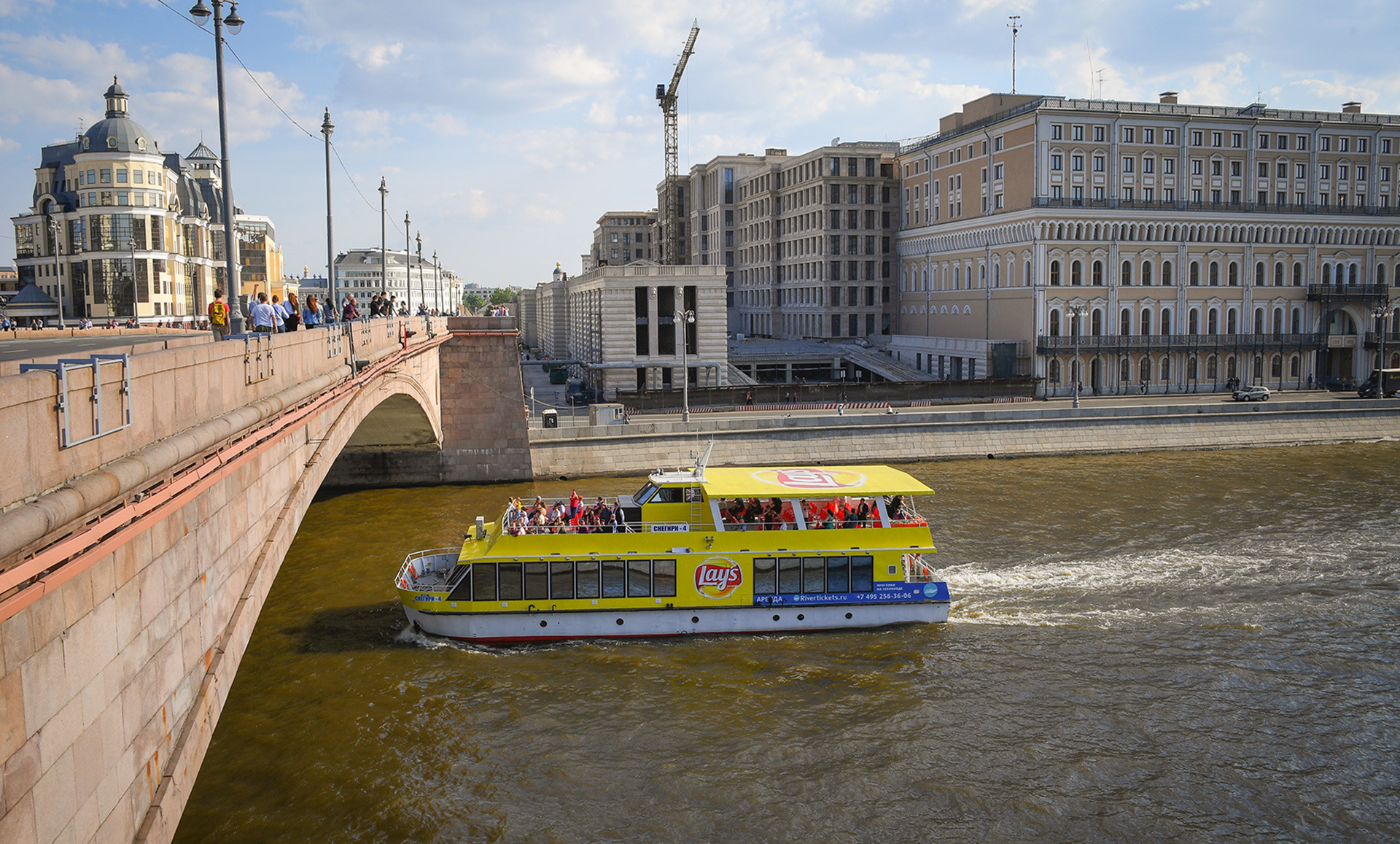
This option might leave a passenger disembarking partially deaf as the merciless Russian pop music blasts onboard. A free spirit, however, will find partying on such a vessel to be an unforgettable and authentic experience that’s almost a metaphor for life in modern Russia: too loud, and sometimes too welcoming. Tickets start at $13 (800 rubles) per person.
Bigger boats offer smoother sailing and tend to attract foreign visitors because of their distinct Soviet aura. Indeed, many of the older vessels must have seen better days. They are still afloat, however, and getting aboard is a unique ‘cultural’ experience. Sometimes the crew might offer lunch or dinner to passengers, but this option must be purchased with the ticket. Here is one such option offering dinner for $24 (1,490 rubles).
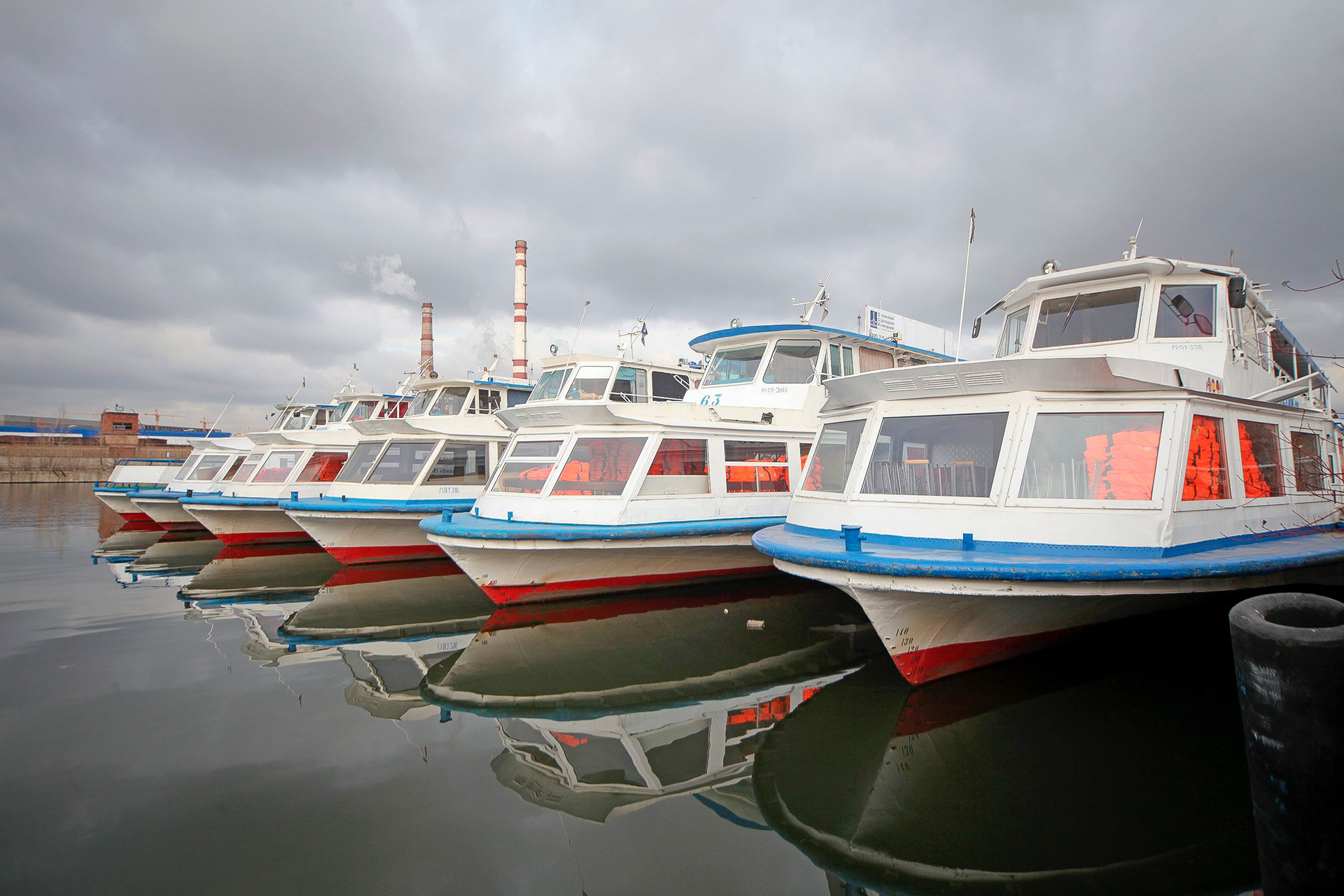
If you want to travel in style, consider Flotilla Radisson. These large, modern vessels are quite posh, with a cozy restaurant and an attentive crew at your service. Even though the selection of wines and food is modest, these vessels are still much better than other boats.
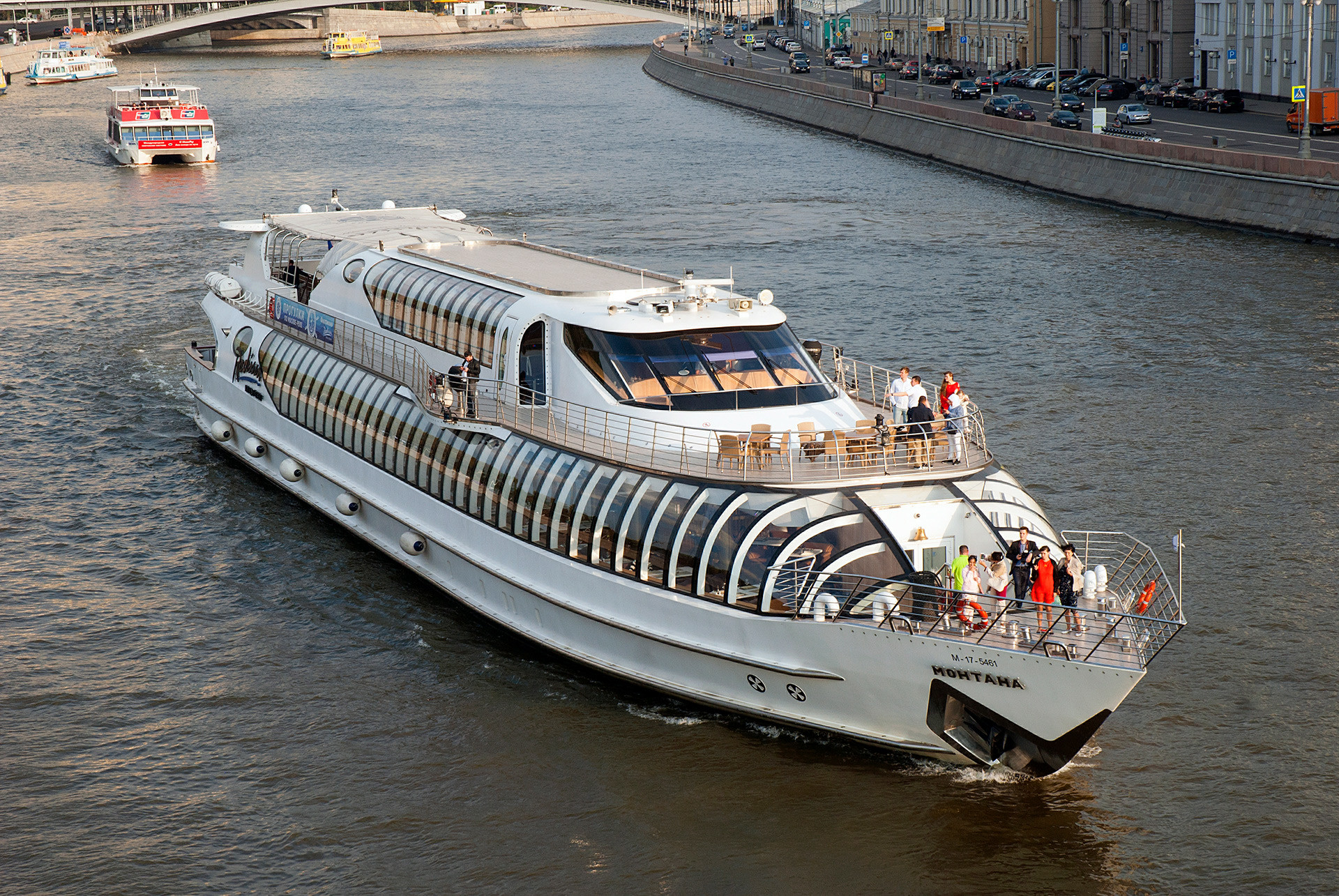
Surprisingly, the luxurious boats are priced rather modestly, and a single ticket goes for $17-$32 (1,100-2,000 rubles); also expect a reasonable restaurant bill on top.
How to buy tickets?
Women holding photos of ships promise huge discounts to “the young and beautiful,” and give personal invitations for river tours. They sound and look nice, but there’s a small catch: their ticket prices are usually more than those purchased online.
“We bought tickets from street hawkers for 900 rubles each, only to later discover that the other passengers bought their tickets twice as cheap!” wrote (in Russian) a disappointed Rostislav on a travel company website.
Nevertheless, buying from street hawkers has one considerable advantage: they personally escort you to the vessel so that you don’t waste time looking for the boat on your own.

Prices start at $13 (800 rubles) for one ride, and for an additional $6.5 (400 rubles) you can purchase an unlimited number of tours on the same boat on any given day.
Flotilla Radisson has official ticket offices at Gorky Park and Hotel Ukraine, but they’re often sold out.
Buying online is an option that might save some cash. Websites such as this offer considerable discounts for tickets sold online. On a busy Friday night an online purchase might be the only chance to get a ticket on a Flotilla Radisson boat.
This website (in Russian) offers multiple options for short river cruises in and around the city center, including offbeat options such as ‘disco cruises’ and ‘children cruises.’ This other website sells tickets online, but doesn’t have an English version. The interface is intuitive, however.
Buying tickets online has its bad points, however. The most common is confusing which pier you should go to and missing your river tour.

“I once bought tickets online to save with the discount that the website offered,” said Igor Shvarkin from Moscow. “The pier was initially marked as ‘Park Kultury,’ but when I arrived it wasn’t easy to find my boat because there were too many there. My guests had to walk a considerable distance before I finally found the vessel that accepted my tickets purchased online,” said the man.
There are two main boarding piers in the city center: Hotel Ukraine and Park Kultury . Always take note of your particular berth when buying tickets online.
Where to sit onboard?
Even on a warm day, the headwind might be chilly for passengers on deck. Make sure you have warm clothes, or that the crew has blankets ready upon request.
The glass-encased hold makes the tour much more comfortable, but not at the expense of having an enjoyable experience.
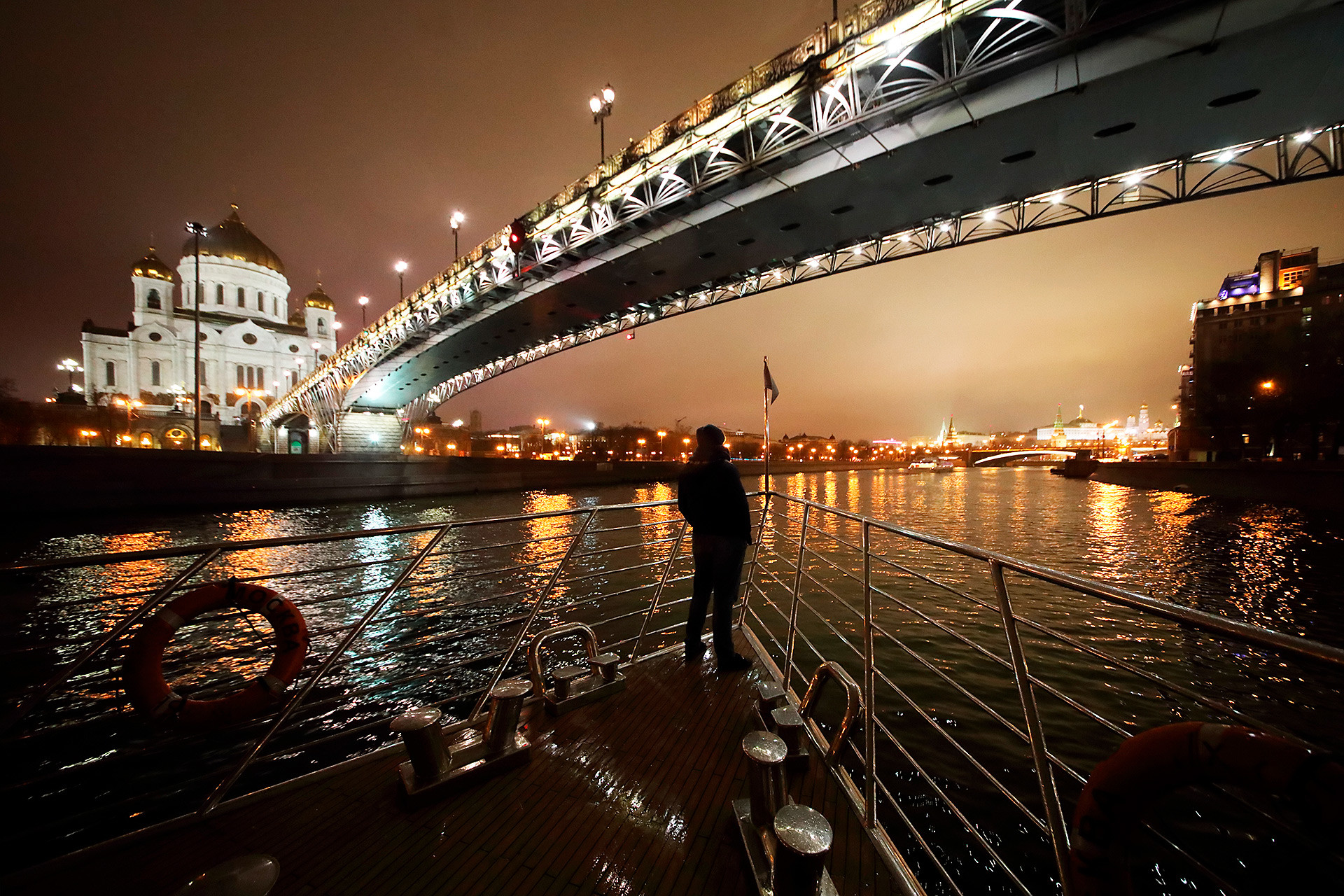
Getting off the boat requires preparation as well. Ideally, you should be able to disembark on any pier along the way. In reality, passengers never know where the boat’s captain will make the next stop. Street hawkers often tell passengers in advance where they’ll be able to disembark. If you buy tickets online then you’ll have to research it yourself.
There’s a chance that the captain won’t make any stops at all and will take you back to where the tour began, which is the case with Flotilla Radisson. The safest option is to automatically expect that you’ll return to the pier where you started.
If using any of Russia Beyond's content, partly or in full, always provide an active hyperlink to the original material.
to our newsletter!
Get the week's best stories straight to your inbox
- What to do in Moscow City, if you’re not mega-rich
- Moscow after dusk: 10 places to drink, dance, and groove
- 5 things you must do in Moscow in 2018 between football matches (or without them)
- Sandwiched between Moscow and St. Petersburg: How to spend a perfect weekend in Tver
- 24 or 48 hours in Moscow: Where to go and what to do in 2019
This website uses cookies. Click here to find out more.

Burnt out ski boat of missing skipper found
T he National Sea Rescue Institute (NSRI) said on Sunday afternoon the charter ski boat MAGNUM TOO of the missing skipper was located wrecked and extensively burnt out.
HERE IS AN UPDATE ON THE MISSING SKIPPER CASE
NSRI spokesperson Craig Lambinon said during an extensive search involving multiple agencies and a fixed-wing aircraft, the charter fishing ski boat MAGNUM TOO was located wrecked and extensively burnt out in the vicinity of Dobela on the Mozambique coastline on Sunday.
He said law enforcement agency’s response teams are on site investigating.
‘THERE REMAIN NO SIGNS OF THE SKIPPER JOHN MATAMBU’
“There remains no signs of the skipper John Matambu or an as yet unidentified man who reportedly chartered the fishing vessel. “Both men remain missing in unknown circumstances. “Our thoughts are with the family and colleagues of John in this difficult time.”Lambinon said
IT REMAINS UNKNOW WHAT HAPPENED THAT LED TO THE VESSEL BEACHING
Lambinon said it remains unknown what happened that led to the vessel beaching and finding it completely burnt out.
Police and law enforcement, security agencies, and maritime authorities are continuing an extensive search and investigation to locate the two missing men and piece together what has transpired.
HERE IS MORE INFORMATION ABOUT THE MISSING SKIPPER
NSRI Richards Bay deputy station commander Norman Rautenbach said that at around 17:00 on Saturday, NSRI Richards Bay was alerted to concerns that a charter ski boat, “ MAGNUM TOO ,” a 21-foot Yeld Cat ski boat, was missing at sea in uncertain circumstances that appeared to indicate foul play may be involved.
“The NSRI is hopeful that this is not the case.”
WHAT HAPPENED ON SATURDAY MORNING?
This comes after the ski boat MAGNUM TOO may have departed Sodwana Bay with John onboard and a male passenger or passengers (uncertain) early on Saturday morning.
Rautenbach said a search was initiated towards Sodwana Bay and North along the coastline.
The search included a private fixed-wing aircraft.
A SEARCH WAS INITIATED TOWARDS SODWANA BAY
Rautenbach said a missing persons report has been opened at MBAZWANA Police station.
“It appears that persons, or a male, who have not been identified, may have chartered the ski boat that was expected to return to Sodwana Bay on Saturday afternoon. “Real concerns are emerging that suggest possible foul play, and these concerns are for the safety of the skipper, John Matambu, and his passenger/s. “We reiterate we are hopeful that this is not the case.”Rautenbach said.
‘REAL CONCERNS ARE EMERGING THAT SUGGEST POSSIBLE FOUL PLAY’
He said concerns are rapidly increasing.
“It is not normal for this well-known and respected local skipper to fail to report to and/or return to Sodwana.
“During the night, the local community and coast watchers are commended for keeping an eye out for any red distress flares or sightings of the missing ski boat.”
THE PEOPLE WHO CHARTERED THE BOAT MAY HAVE PROVIDED FALSE INFORMATION
According to Rautenbach, the individual/s who chartered the boat may have provided false information about their identity.
He added that this needed to be confirmed and that there may have been a misunderstanding.
DO YOU HAVE INFORMATION THAT COULD ASSIST IN THE SEARCH?
“We are appealing to anyone with information that can assist police in this search to contact Police on 10111 and or NSRI EOC (Emergency Operations Centre) 0870949774 or MRCC 0219383300. “Thoughts with the family of the skipper in this difficult time.” “We are hopeful that the crew, and passengers are found safe.”Rautenbach said.
The post Burnt out ski boat of missing skipper found appeared first on SAPeople - Worldwide South African News .

- Terms and Conditions
- Seth Rotherham
- du Cap Collection
- Café du Cap
- Cabine du Cap
- Media Packs / Advertising
- Anonymous Tips

Foul Play Suspected After KZN Skipper’s Boat Found Burnt Out On Mozambique Coast
18 mar 2024 by heinrich in crime , south africa.

Related Posts
- Missing Matterhorn Skiers Tried To Dig 'Snow Caves' Before Freezing To Death
- What About All The Other 'Joslin Smiths' Missing In The Western Cape?
- We Are Failing Our Children - Cape Pathologists Reveals Shocking Number Of Teen And Child Homicides
- A Small Mpumalanga Village Is Being Overrun By Illegal Car Smugglers [Video]
- Amazing Video Of A Helicopter Rescue On Table Mountain Reminds Us Of The Heroes Who Will Be Working This December Holidays
[imagesource:nsri]
A frantic search was launched this weekend for a missing ski boat, its skipper and passengers off the KwaZulu-Natal coast.
The charter boat, captained by a KwaZulu-Natal skipper, went missing at sea close to the Mozambican border, with authorities now confirming that the skip was found “wrecked and burnt” near the Mozambique coastline.
NSRI spokesperson Craig Lambinon said the 21-foot Yeld Cat ski-boat – ‘MAGNUM TOO’ – was found in the vicinity of Dobela on Sunday morning.
“Law e nforcement agencies’ response teams are on site investigating . There remain no signs of the skipper, John Matambu, or an unidentified man who reportedly chartered the fishing vessel ,” he said.

[image:nsri]

[image:nsri]
It is not normal for this well-known and respected local skipper to fail to report in and/or to return to Sodwana. It appears that the individual(s), who chartered the boat, may have provided false information as to their identity – after arriving in the Sodwana Bay area, reportedly, on a motorbike.
Lambinon said it was unclear as to what happened that led to the vessel beaching and found to be completely burnt.
“Police and l aw e nforcement, s ecurity agencies and maritime authorities are continuing in an extensive search and investigations to try to locate the two missing men, and to piece together what has transpired.”
The SAPS Police Sea Borderline Control, Police Search and Rescue, Transnet National Ports Authority (TNPA), Ezemvelo KZN Wildlife, local community security companies, and local resorts and lodges along that stretch of coastline were assisting in gathering information, conducting investigations and conducting search efforts.
[source: news24 ]
- ← GoodLuck’s Jules And Ben Did Something At Kirstenbosch Concert That Has Never Been Done Before [Video]
- Discovery Health Is Recommending Less Than 10,000 Steps Now →
- chartered boat
- sodwana bay
Latest News

The 20 Baby Names That Are Plummeting In Popularity
[imagesource:jasonpratt] Data has revealed the baby names that have plummeted in popula...

First Pro Rugby Union Player Confirmed To Have Died From Blows To The Head
[imagesource:gencraft/ai] Rugby players and associates all over the world are currently...

CNN Anchor Says Elon Musk Is The Most Delicate Snowflake He’s Ever Interviewed
[imagesource:flickr] Elon Musk has a new enemy, CNN anchor Don Lemon, who confronted th...

Former Server Reveals Real Reason You’re Offered A Small Taste When Ordering Wine
[imagesource:wallpaperflare] There's a whole etiquette to ordering wine from a restaura...

Wealthy Los Angeles Residents Are Having Their Luxury Goods Stolen By Bands Of “Burglary Tourists”
[imagesource:pexels] Bands of "burglary tourists" are hopping into Los Angeles to steal...
2oceansvibe Partners

- GOT A HOT STORY?
- 2oceansvibe Radio
- 2oceansvibe Media
- Cape Town City Accommodation
- Terms & Conditions
- Entertainment

2oceansvibe.com is part of the 2oceansVibe Media Group


- Our history
- Integrated Annual Reports
- Our governance
- Memorandum of Incorporation
- Infrastructure & Equipment
- Lifeguard Unit
- Volunteer Training
- EOC & Rescue Communications
- Base Finder
- Summer Safety 2023/24
- Water Safety Education
- Survival Swimming Centres
- Pink Rescue Buoys
- Survival Swimming
- Drowning Prevention Frameworks
- Rip Currents
- NSRI SafeTrx App
- Free Resources & Guides
- Animal Rescue
- Help Animals in Distress
- Rescue Operations
- Media Centre
- Sea Rescue Magazine
- Car Competition Rules
- Car Competition Winners
- Monthly Cash Draw Rules
- Monthly Cash Draw Winners
- Tax deductible donations
- Sponsor a rescue vessel
- Legacy & Trusts
- Government & SOEs
- Corporates & Clubs
- Celebrate a Life Campaign
- Community Fundraising
- Online Shop
- Vessels for Sale
NSRI EMERGENCY OPERATION CENTRE (EOC)

Skipper missing at sea: Urgent appeal for information

A charter boat captained by a well-known KZN North Coast skipper has gone missing at sea near the border with Mozambique.
Update on Sunday 17 March at 16:21 CAT:
During an extensive search involving multiple agencies and a fixed wing aircraft the charter fishing ski-boat MAGNUM TOO was located wrecked and extensively burnt out in the vicinity of Dobela on the Mozambique coastline this morning. Law Enforcement agencies response team are on site investigating. There remains no signs of the skipper John Matambu or an as yet unidentified man who reportedly chartered the fishing vessel. Both men remain missing in unknown circumstances. Thoughts are with the family and colleagues of John Matambu in this difficult time.
Original story:
At around 17h00, Saturday, 16 March, NSRI Richards Bay were alerted to concerns of a charter vessel ski boat "MAGNUM TOO" a 21 foot Yeld Cat ski-boat, missing at sea in uncertain circumstances that appear to indicate that foul play may be involved.
NSRI are hopeful that this is not the case.
The ski-boat MAGNUM TOO may have departed Sodwana Bay during the early morning Saturday, 16 March.
NSRI Richards Bay duty crew and NSRI St Lucia duty crew were activated.
A search towards Sodwana Bay and North along the coastline were initiated including a private fixed wing aircraft and as yet there remains no signs of the ski-boat MAGNUM TOO with local competent skipper John Matambu onboard and a male passenger or passengers (uncertain) that we are hoping are well and safe.
A missing persons report has been opened at MBAZWANA Police station.
The SA Police Services Police Sea Borderline Control, Police Search and Rescue, TNPA (Transnet National Ports Authority), Ezemvelo KZN Wild Life, local community security companies, local public members, local resorts and lodges, along that entire stretch of coastline in that area, of Sodwana Bay and North of Sodwana Bay, are assisting to gather information, conduct investigations and conduct search efforts.
MRCC (Maritime Rescue Coordination Centre) are assisting.

It appears that persons, or a person, a male, that have not been identified, may have chartered the ski-boat that was expected to return to Sodwana Bay during Saturday afternoon.
Real concerns are emerging that appear to suggest possible foul play and concerns are for the skippers John Matambu's safety and his passenger/s.
We reiterate we are hopeful that this is not the case.
Fears are - that the ski-boat MAGNUM, that may have been seen to be heading North, past Banga Neck, and may have been pinned in the vicinity of Inhaca (unconfirmed) - may be involved in nefarious circumstances that are rapidly increasing concerns.
At 22h00 a report was received suggesting the ski-boat may have been spotted as far North as Santa Maria across to the Mozambique coastline.
Telkom Maritime Radio Services are broadcasting a marine radio all ships alert for vessels along the Northern Coastline of KZN (Eat Coast - Indian Ocean), and beyond the South African Eastern coastline border, to be on the look out and to report any sightings of ski-boat MAGNUM TOO.
Concerns are rapidly increasing. It is not normal for this well known and respected local skipper to fail to report in and/or to return to Sodwana.
During the night local community and coast watchers are commended for keeping an eye out for any red distress flares or any sighting of the missing ski-boat.
It appears that the individual/s who chartered the boat may have provided false information as to their identity(this is not confirmed and may be a misunderstanding) - after arriving in the Sodwana Bay area, reportedly, on a motor bike. Efforts to locate the charter passenger/s, the skipper John Matambu and ski-boat MAGNUM TOO remain unsolved.
We are appealing to anyone with information that can assist Police in this search to contact Police on 10111 and or NSRI EOC (Emergency Operations Centre) 0870949774 or MRCC 0219383300.
Thoughts with the family of the skipper in this difficult time.
Pictures of the boat, MAGNUM TOO, the skipper John Matambu are posted to NSRI web page and NSRI social media. We are encouraging this toi be shared far and wide and we commend the media's urgent attention to this case.
We are hopeful that the boat, crew and passengers are found safe.

Help us save lives on South African waters.
You may also like.

Good Samaritan Saves Two Children
NSRI commend a Good Samaritan, a male, who we believe rescued 2 children at Casuarina Beach on Sunday, 10 March. ...

Against the Wind: NSRI Hout Bay Assists Three Local Boaters
While conducting a medical post, together with WC Government Health EMS, at the top of Chapman's Peak, on Sunday, 10 March, for the Cape Town Cycle Tour 24, we noticed a RHIB (rigid hull inflatable boat) appearing to be adrift ...

NSRI and Police Conduct Extensive Search for Missing Man in Hartbeespoort Dam
NSRI Hartbeespoort Dam are assisting Police divers in an ongoing search for a local man, age 40, who went missing on Saturday day afternoon after reportedly falling out of a boat, close to Caribbean Estate (near to Randburg Bridge), and ...

Missing Sodwana Bay charter boat found, no trace of skipper
Efforts ongoing to locate missing sodwana bay fishing vessel skipper after boat found.

The search for missing Sodwana Bay skipper John Matambu is ongoing after the burnt out boat was located earlier this morning (Sunday).
Authorities involved in the search have published the following update:
– Matambu’s boat has been found near Dobela completely burnt out
– The charter was made by a shady character supposedly for his wife, daughter and himself, but he was the only one who arrived in the morning.
ALSO READ: Search for missing Sodwana Bay skipper
– The information on where he was staying in Sodwana hasn’t checked out, and he was noticed in and around Sodwana the past few days (not sure how long).
– The boat was chartered to go quite far up the coast towards Mozambique.
– Matambu was last heard from at 11:30am on the 16 March. Having reached the designated charter point, and since then there has been no further contact from him.
– A team of people have just arrived at the boat location, and are now searching the area.
– The boat was definitely beached and the medical kit has been found, used and not burnt.
– At this stage people are being asked not to visit the boat location, as they are trying to preserve potential evidence and footprints etc.
HAVE YOUR SAY
Like our Facebook page and follow us on Twitter.
For news straight to your phone invite us:
WhatsApp – 060 784 2695
Instagram – zululand_observer


IMAGES
COMMENTS
The yacht skipper. Sometimes, the boat owner assumes this pivotal role, while others may opt for hiring a professional crew. In this article, we'll journey through the multifaceted role of a skipper, exploring the breadth of their responsibilities from navigation to guest relations. We'll guide you through the avenues available to find the ...
Registration and posting is free if you are looking for a skipper or crew. Find amateur and professional crew for short or long term voyages. Find sailing crew. ... We are the original yacht crew introduction agency - established for over 25 years, offering amateur and professional sailing opportunities throughout the world. Read our story.
A good skipper will prevent boredom and apathy by agreeing daily routine maintenance tasks and helping to develop projects that improve the yacht and teach useful skills on board. A good skipper ...
A skipper is a person who has command of a boat or watercraft and is more or less equivalent to a captain in charge of a ship. The skipper may or may not be the owner of the boat. There are a number of types of different roles including flotilla, charter and delivery skippers.
Yacht Charter with a Skipper or (Yacht Hire with a skipper) is a type of charter, Yacht Charter with a Skipper, is surprisingly popular (and increasingly so), easy, and highly recommended. They will know how to get the best out of your boat, they will be experts on the sailing and cruising area, and the best will be great company (or unobtrusive 'reading the room' or better reading the 'saloon ...
The cost of a professional skipper varies according to the service (boat delivery, charter, coaching), the duration of the service, the sailing area, the size of the boat and the number of passengers : For charters, the remuneration is a daily rate. Example : In Croatia, a skipper is paid at least 240€/day ; In France, 300€/day ; In Saint ...
Skipper is yet a freeman, or a freelancer, in our case, once hired. Skipper is an ultimate professional, the same as Captain, but this is a free choice of Skipper to be such. Skipper lives one life for his boat and himself. The skipper is the master of his ship. A skipper is also a captain of the boat, as of what the official papers state.
IYT operates more boating courses with more government approvals through more schools, in more countries and in more languages than any other boating organization in the world. We are proudly ISO 9001:2015 approved. International Yacht Training Worldwide is the global leader in International Certificate of Competence, Superyacht Crew training ...
You will need to cover the cost of the boat, together with mooring and fuel, and then decide whether to include food, meals out, and drinks. I find that the simplest option is to share all the costs equally, and the first step is to prepare a rough budget so people have an idea of how much the trip is going to cost.
The skipper will stay on board the yacht throughout the entire duration of your sailing holiday. The skipper provides added security and comfort for new sailors or beginners who aren't quite ready to take a yacht out or don't have the qualifications to do so. Experienced sailors may also hire a skipper to take advantage of the local ...
What is a Boat Skipper? A boat skipper is a person that commands a boat and its crew. In naval terms, a skipper is liable for the care and safety of the ship, vessel, boat or yacht. This is true of the captain too. Additionally, the captain is also accountable for the care and sanctuary of the crew.
In the case of a fully crewed yacht, the responsibilities of the skipper include making sure the crew understand and carry out their roles and duties. The skipper is expected to maintain proper coordination among the crew. To sum up, the tasks and responsibilities of a skipper are both technical and interpersonal.
Most of all, are you up for an adventure? If yes to all the above, you should be working as a skipper for Yacht Week! For prerequisites and more information check quarterdeck.co, our in-house training academy to learn how you can apply to skipper academy. Are you an experienced and confident sailor? Someone who's not afraid to step up and ...
The nine steps below will help you to become not just a skipper for The Yacht Week, but a confident one at that. 1. Basic sailing experience. Budget: $0 - $500. Classic Sailing Virgins Education. Either through sailing with a friend, joining a local community sailing club or a university sailing club.
Skippered charters are more affordable than you think, even if you don't have sailing experience. Sailing with friends or family means you can split the cost of your yacht and skipper hire. There are several ways you can keep skippered charters low in terms of cost: Avoid high season. Choose an older yacht.
The skipper on a chartered yacht will have the skills, training, experience, and license required to legally and safely captain the boat (or flotilla, in the case of a group sailing holiday ). In that capacity, here's a look at what a skipper does: Keeping everyone safe: The skipper makes sure everyone on board knows and adheres to safety ...
Work hours ( New York Time) Monday-Friday: 3am - 1pm. Saturday: 3am - 8am. Sunday: Closed. Work hours ( Los Angeles Time) Monday-Friday: 0am - 10am. Saturday: 0am - 5am. Sunday: Closed. Yacht & Skipper Luxury Sailing Week - Make memories that last a lifetime aboard our luxury, week-long skippered sailing holidays in Croatia, Greece & Montenegro.
Yacht Skipper Sailing, Skippers for Sailing Yachts. Check Availability and Book your Skipper for Yachts up to 24 meters, 78 feet, 12 Passengers.
Skipper. Skipper is a yacht manufacturer that currently has 156 yachts for sale on YachtWorld, including 152 new vessels and 4 used yachts, listed by experienced boat and yacht brokers mainly in the following countries: United States, Canada, Greece, United Arab Emirates and Puerto Rico. Models currently listed on YachtWorld vary in size and ...
She sailed her way into the history books. A 29-year-old skipper from New York has become the first US woman to sail solo around the world. Cole Brauer, from Long Island, tearfully reunited with ...
Many years of experience in training yacht captains and organizing yacht and adventure tours of any complexity. Individual and creative approach to all tasks. I love the sea and sails very much. And I want to bring love, goodness, and light into our world. | Learn more about Tatiana Kaverina's work experience, education, connections & more by visiting their profile on LinkedIn
Prices start at $13 (800 rubles) for one ride, and for an additional $6.5 (400 rubles) you can purchase an unlimited number of tours on the same boat on any given day.
A charter boat MAGNUM TOO captained by a well-known KZN North Coast skipper was located wrecked and extensively burnt out. The post Burnt out ski boat of missing skipper found appeared first on ...
The charter boat, captained by a KwaZulu-Natal skipper, went missing at sea close to the Mozambican border, with authorities now confirming that the skip was found "wrecked and burnt" near the Mozambique coastline. NSRI spokesperson Craig Lambinon said the 21-foot Yeld Cat ski-boat - 'MAGNUM TOO' - was found in the vicinity of ...
On this map you can see the details of the longest and most classic of the Flotilla Radisson boat tours: 2. Companies that do boat tours on the Moskva River. There are many companies that do cruises on the Moskva River, but the 4 main ones are: Capital River Boat Tour Company (CCK) Mosflot. Flotilla Radisson.
Radisson cruise from Gorky park. 2,5 hours. Yacht of the Radisson Royal flotilla. Best water route in Moscow. Panoramic views of the capital from the water in winter and in summer. Restaurant with signature cuisine. Next tour: 1600 ₽. Learn more.
A medical kit and a petrol canister were some of the items found near the wrecked and burnt charter ski-boat, captained by KwaZulu-Natal skipper John Matambu. Matambu's niece, Candice Eilertsen, told News24 that the medical kit and 150-litre petrol canister were found about 100m from the Dobela location where the 21-foot Yeld Cat ski-boat ...
A charter boat captained by a well-known KZN North Coast skipper has gone missing at sea near the border with Mozambique. Update on Sunday 17 March at 16:21 CAT: During an extensive search involving multiple agencies and a fixed wing aircraft the charter fishing ski-boat MAGNUM TOO was located wrecked and extensively burnt out in the vicinity ...
Efforts ongoing to locate missing Sodwana Bay fishing vessel skipper after boat found. March 17, 2024. Tamlyn Head 1 minute read. Facebook X LinkedIn Tumblr Pinterest WhatsApp Telegram Share via ...